
by Melinda Savoy | Oct 11, 2021 | An Aerial View of the Old Testament
The period of restoration consists of three returns: the people return to rebuild the temple under Zerubbabel; they return to purify the worship of God under Ezra; and they return to rebuild and refortify the city of Jerusalem under Nehemiah.

by Melinda Savoy | Oct 12, 2021 | An Aerial View of the Old Testament
God and His glory and His kingdom and His rule are all part of the Old Testament story line. Therefore, all Christians must be disciplined to frequently read from it.

by Melinda Savoy | Oct 13, 2021 | An Aerial View of the Old Testament
Christ and His atonement for sin and the basic gospel of justification by faith alone, are at the heart of Old Testament revelation.

by Melinda Savoy | Oct 14, 2021 | Two Gates, One Decision
Everyone is on a spiritual journey that leads one of two gates. One gate will eventually lead to heaven; the other gate will eventually lead to hell. However, there are only two gates.

by Melinda Savoy | Oct 15, 2021 | Two Gates, One Decision
How should you respond to the reality of these two gates that Jesus describes? Every human being will pass through one of them. Which one will you pass through?

by Melinda Savoy | Oct 18, 2021 | Two Gates, One Decision
The two gates that Jesus describes picture two points of entry. These points of entry describe two distinct lifestyles. What does your lifestyle look like? At this rate, which point of entry will you go?

by Melinda Savoy | Oct 19, 2021 | Two Gates, One Decision
The road of obedience to Jesus Christ will eventually end in life; the road of your own way, whatever that is, will eventually end in your eternal destruction.

by Melinda Savoy | Oct 20, 2021 | Watch Where You Step!
The Scripture calls Christians to deny worldly wisdom and to pursue biblical wisdom.

by Melinda Savoy | Oct 21, 2021 | Watch Where You Step!
If we want to live in biblical wisdom, we can’t waste the opportunities God has given us to pursue it.

by Melinda Savoy | Oct 22, 2021 | Watch Where You Step!
The way of the righteous is the path to biblical wisdom. The way of the wicked is the path of the fool.

by Melinda Savoy | Oct 25, 2021 | Watch Where You Step!
How can you identify if you are living a truly righteous life? By how you respond to God’s way as it’s revealed in the Bible.

by Melinda Savoy | Oct 26, 2021 | Watch Where You Step!
What role does the Spirit play in believers’ lives in the New Testament? In order to be filled with the Spirit we must know exactly who He is.

by Melinda Savoy | Oct 27, 2021 | Watch Where You Step!
Why is there so much controversy among professing Christians on the person and work of the Holy Spirit?

by Melinda Savoy | Oct 28, 2021 | Watch Where You Step!
Since Christians are commanded to be filled with the Spirit and to walk in Biblical wisdom, we need to understand exactly what that means.

by Melinda Savoy | Oct 29, 2021 | Watch Where You Step!
What is the Christian’s responsibility as it relates to his relationship with the Holy Spirit? In other words, how can Christians grow in their relationship with Him?

by Melinda Savoy | Nov 1, 2021 | Jesus: Liar, Lunatic or Lord?
Why did so many people think that Jesus was completely out of His mind for making claims of deity?

by Melinda Savoy | Nov 2, 2021 | Jesus: Liar, Lunatic or Lord?

by Melinda Savoy | Nov 3, 2021 | Jesus: Liar, Lunatic or Lord?
In an attempt to discredit Jesus, many in the crowds slandered His name and even attributed His works to Satan.

by Melinda Savoy | Nov 4, 2021 | Jesus: Liar, Lunatic or Lord?
What is the unpardonable sin, and how does it directly relate to the person and work of the Holy Spirit?

by Melinda Savoy | Nov 5, 2021 | Jesus: Liar, Lunatic or Lord?
The disciples believed that Jesus was Lord. Therefore, they willingly subjected their wills and lives to Him.

by Melinda Savoy | Nov 8, 2021 | Jesus: Liar, Lunatic or Lord?
If you have repented from your sins and believed upon the Lord Jesus Christ, you have been adopted into God’s family as a son or daughter.

by Melinda Savoy | Nov 9, 2021 | Prayer For All Seasons
For the Christian, prayer is absolutely crucial, and prayer is especially important when we find ourselves in the middle of life’s troubles and trials.

by Melinda Savoy | Nov 10, 2021 | Prayer For All Seasons
Where did King David go when he found himself discouraged and the emotion of absolute and utter discouragement came upon him? He went to the Lord in prayer.

by Melinda Savoy | Nov 11, 2021 | Prayer For All Seasons
What does the Bible actually teach about illnesses and sickness? Are believers exempt from such trials?

by Melinda Savoy | Nov 12, 2021 | Prayer For All Seasons
Believers must never hold on to patterns of sin. Instead, they must continually repent of them and turn to the Lord Jesus Christ.

by Melinda Savoy | Nov 15, 2021 | Prayer For All Seasons
When God’s people pray, He truly hears and responds according to His will. A great example of this is in the life and ministry of the prophet Elijah.

by Melinda Savoy | Nov 16, 2021 | Prayer For All Seasons
The same God who decreed what would be the ends also decreed the means through which those ends would be accomplished, including our prayers. When we pray, we become part of God’s sovereign, eternal plan.

by Melinda Savoy | Nov 17, 2021 | God's Great Secret
What does Paul mean when he uses the word mystery? In order to understand Paul’s line of thought in Ephesians 3 and God’s great secret, a proper understanding of mystery must be established.

by Melinda Savoy | Nov 18, 2021 | God's Great Secret
How should you respond to the fact that God kept a great secret for some time, and has now revealed it to us? How do you respond to the secret who is our Lord Jesus Christ?

by Melinda Savoy | Nov 19, 2021 | God's Great Secret
How did God broadcast His secret to the entire world? It is one thing to have a secret and to reveal it, but it’s another thing to make sure the secret gets out as planned.

by Melinda Savoy | Nov 22, 2021 | God's Great Secret
The church of our Lord Jesus Christ is absolutely essential to the gospel and God’s plan of the ages.

by Melinda Savoy | Nov 23, 2021 | God's Great Secret
What are the results of God’s great eternal secret being revealed to the world?

by Melinda Savoy | Nov 24, 2021 | God's Great Secret
Your connection to the local church defines and reveals the nature of your relationship to the whole church of Jesus Christ. In other words, your connection to the church reveals whether or not you truly understand God’s great secret.

by Melinda Savoy | Nov 25, 2021 | Cultivating a Thankful Heart
Christians must be constantly be on guard against sinful thinking, because it is unbiblical thinking that ruins a thankful heart.

by Melinda Savoy | Nov 26, 2021 | Cultivating a Thankful Heart
The Bible provides ways in which believers can continually cultivate a thankful heart and attitude, and thus live a truly thankful life.

by Melinda Savoy | Nov 29, 2021 | The Eternal State: I Saw a New Heaven and a New Earth
The Bible teaches that God will completely destroy the planet we are currently living on. After that supernatural event, God will create a new heaven and a new earth.

by Melinda Savoy | Nov 30, 2021 | The Eternal State: I Saw a New Heaven and a New Earth
When the Lord Jesus Christ makes a new heaven and a new earth, it will reveal the full expression of His beauty and His creative power.

by Melinda Savoy | Dec 1, 2021 | The Eternal State: I Saw a New Heaven and a New Earth
In Revelation 21–22 the apostle John records a vision of the new heaven and the new earth.

by Melinda Savoy | Dec 2, 2021 | The Eternal State: I Saw a New Heaven and a New Earth
What will Christians do for all of eternity in the new heaven and earth?

by Melinda Savoy | Dec 3, 2021 | Not Even One!
In order to best understand the concept of human depravity, one must first understand what human depravity is not.

by Melinda Savoy | Dec 6, 2021 | Not Even One!
From God’s perspective, all humanity is equally guilty and condemned because of their sins against Him.

by Melinda Savoy | Dec 7, 2021 | Not Even One!
Paul strings together a number of Old Testament texts to prove the sinfulness of mankind.

by Melinda Savoy | Dec 8, 2021 | Not Even One!
No person on this planet seeks God by their own initiative. Rather, mankind is so depraved that they actually seek everything but God.

by Melinda Savoy | Dec 9, 2021 | Not Even One!
Man’s depravity manifests itself with toxic speech that does not honor nor glorify God.

by Melinda Savoy | Dec 10, 2021 | Not Even One!
Unredeemed humanity shows their wickedness by using words that are full of cursing and bitterness.

by Melinda Savoy | Dec 13, 2021 | Not Even One!
Another way in which mankind manifests its wickedness is through violent, rebellious acts.

by Melinda Savoy | Dec 14, 2021 | Not Even One!
True Christians acknowledge that Jesus Christ saved them from the debt and consequence of their wickedness and sin.

by Melinda Savoy | Dec 15, 2021 | Not Even One!
Unbelievers demonstrate their unbelief by continuing in their sins. Believers demonstrate their belief in Christ by obeying His Word.

by Melinda Savoy | Dec 16, 2021 | Not Even One!
Sinners do not fear God because their sin blinds them from truly understanding who He is.

by Melinda Savoy | Dec 17, 2021 | A Vision of the Exalted Christ
There are two circumstances that provide the backdrop for this glorious vision: 1) The apostle John documents the vision, and 2) He records such a vision from the island of Patmos.

by Melinda Savoy | Dec 20, 2021 | A Vision of the Exalted Christ
The Lord Jesus Christ has an intimate relationship with every church that proclaims the biblical gospel. In particular, He uniquely serves as our Great High Priest.

by Melinda Savoy | Dec 21, 2021 | A Vision of the Exalted Christ
How do finite creatures respond to being in the presence of the infinite God? The apostle John’s actions reveal the awe and wonder of a holy God.

by Melinda Savoy | Dec 22, 2021 | A Vision of the Exalted Christ
Christ is the head of His church and He exercises that headship through biblically qualified elders and leaders.

by Melinda Savoy | Dec 23, 2021 | The Birth Announcement of God's Son
Instead of choosing the most wealthy and prominent people of the day for His Son’s birth announcement, God chose the most unlikely people to be there. And not just to be there, but to be His witnesses to the event.

by Melinda Savoy | Dec 24, 2021 | The Birth Announcement of God's Son
Our spiritual rescue was initiated by the sovereign work of the Father in eternity past. It was accomplished by the sovereign work of the Son in His voluntary death for sin. And it is applied to individuals by the sovereign work of the Spirit who, like the wind, blows wherever He wills.

by Melinda Savoy | Dec 27, 2021 | The Birth Announcement of God's Son
Jesus of Nazareth was a real person, born in a real place at a real point on the timeline of human history. He actually existed.

by Melinda Savoy | Dec 28, 2021 | The Birth Announcement of God's Son
When a person truly believes in Christ, there is always an eagerness to obey what God has said—it is a sign of truth faith in God’s Son.

by Melinda Savoy | Dec 29, 2021 | The Sabbath & the Heart of God
Jesus boldly confronts the Pharisees’ wrong interpretation and understanding of the Old Testament command to keep the Sabbath holy.

by Melinda Savoy | Dec 30, 2021 | The Sabbath & the Heart of God
Christians are not bound by the rules and regulations of either the Old Testament Sabbath or the “Christian Sabbath.”

by Melinda Savoy | Dec 31, 2021 | The Sabbath & the Heart of God
The story of the man with the withered hand exposes the sinful hearts of the Pharisees in comparison with the righteous, compassionate heart of the Lord Jesus Christ.

by Melinda Savoy | Jan 3, 2022 | The Sabbath & the Heart of God
All men, whether religious or irreligious, are united in one thing: their hatred of the true Jesus. It doesn’t matter if they are caught up in false religion, or if they are rank secularists.

by Melinda Savoy | Jan 4, 2022 | No Condemnation
If you have repented and believed in the Lord Jesus Christ, you can enjoy absolute security in God because He has delivered you from condemnation.

by Melinda Savoy | Jan 5, 2022 | No Condemnation
There is only one way that condemned sinners (unbelievers) can ever get rid of their condemnation: it is through the Lord Jesus Christ who can be their legal representative.

by Melinda Savoy | Jan 6, 2022 | No Condemnation
Upon repenting and believing in the Lord Jesus Christ, God changed the verdict from condemnation to no condemnation, because of what Christ did on the cross.

by Melinda Savoy | Jan 7, 2022 | No Condemnation
God’s ultimate purpose behind the incarnation and the atonement of Christ was not just your salvation, but your sanctification (Romans 8:1–4).
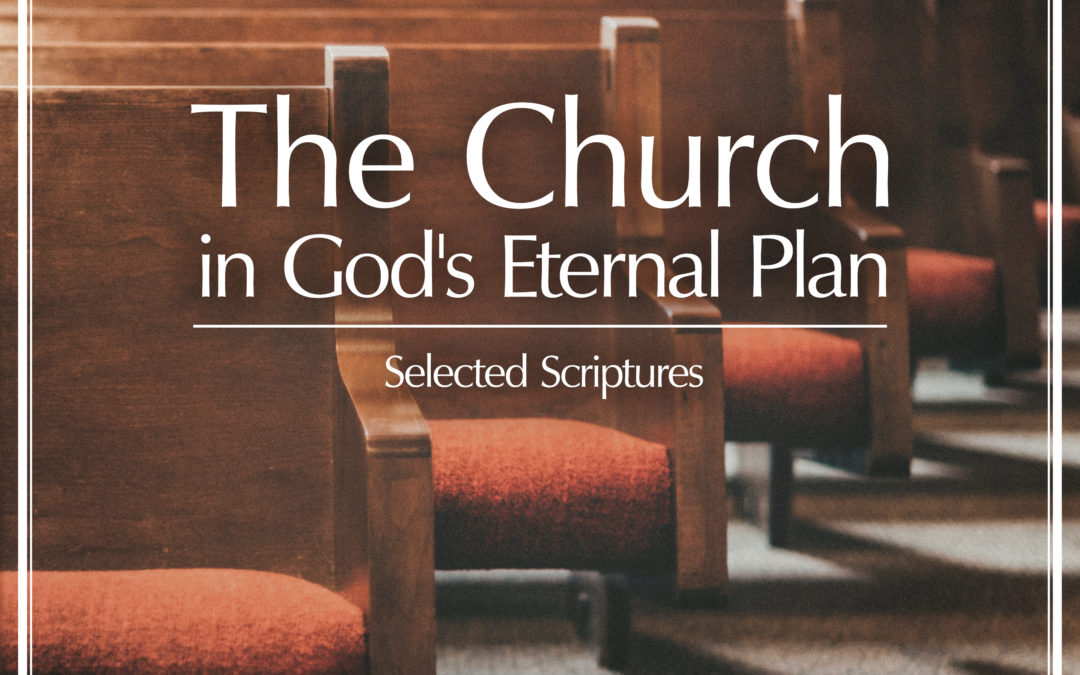
by Melinda Savoy | Jan 10, 2022 | The Church in God's Eternal Plan
What does the Bible say about when the church began? Throughout church history five options have been offered.

by Melinda Savoy | Jan 11, 2022 | The Church in God's Eternal Plan
There are three primary positions today in evangelicalism about the relationship between Israel and the church.

by Melinda Savoy | Jan 12, 2022 | The Church in God's Eternal Plan
Scripture is clear that while there are great similarities between Israel and the church, there are also clear distinctions between them.

by Melinda Savoy | Jan 13, 2022 | The Church in God's Eternal Plan
There are two distinct promises that Israel has and the church does not: a promise of obtaining certain land in the future, and a leading role in the Millennial Kingdom.

by Melinda Savoy | Jan 14, 2022 | The Church in God's Eternal Plan
What is the relationship between the New Testament church and the Kingdom that is to come?

by Melinda Savoy | Jan 17, 2022 | The Church in God's Eternal Plan
The present aspect of Christ’s Kingdom is that He rules over the hearts of the people He redeemed on the cross.

by Melinda Savoy | Jan 18, 2022 | Power Over Temptation
Every kind of temptation we face will ultimately spring from one of these three root temptations: the lust of the flesh; the lust of the eyes; the boastful pride of life.

by Melinda Savoy | Jan 19, 2022 | Power Over Temptation
God’s Word is both authoritative and sufficient for dealing with the spiritual issues of this life.

by Melinda Savoy | Jan 20, 2022 | Power Over Temptation
During Jesus’ earthly life, He was tempted to pursue His own personal glory, separate from the glory of God.

by Melinda Savoy | Jan 21, 2022 | Power Over Temptation
Christians are made to promote God’s glory, not their own.

by Melinda Savoy | Jan 24, 2022 | Power Over Temptation
Although Jesus’ temptations were unique, they were also typical of the root temptations that every Christian faces.

by Melinda Savoy | Jan 25, 2022 | Power Over Temptation
Jesus’ temptations in the wilderness demonstrate to us that He is fully qualified to rescue us from sin because He Himself was never touched by it.

by Melinda Savoy | Feb 7, 2022 | The Church: Monarchy, Anarchy, or Democracy?
It is critical to understand different forms of church government that have been prevalent through church history.

by Melinda Savoy | Feb 8, 2022 | The Church: Monarchy, Anarchy, or Democracy?
The biblical pattern for local church government is through a plurality of qualified men.

by Melinda Savoy | Feb 9, 2022 | The Church: Monarchy, Anarchy, or Democracy?
What are the primary arguments against a plurality of elders leading a local church?

by Melinda Savoy | Feb 10, 2022 | The Church: Monarchy, Anarchy, or Democracy?
There are four major obligations that local church members must fulfill in regards to the qualified elders that lead their church.

by Melinda Savoy | Feb 11, 2022 | The Church: Monarchy, Anarchy, or Democracy?
What are the biblical qualifications for a man to become an elder at a local church?

by Melinda Savoy | Feb 14, 2022 | The Church: Monarchy, Anarchy, or Democracy?
A biblically qualified elder must demonstrate excellence in the way he shepherds his wife and kids.

by Melinda Savoy | Feb 15, 2022 | The Church: Monarchy, Anarchy, or Democracy?
What role does a deacon play in the local church, and what are the qualifications to become one?

by Melinda Savoy | Feb 16, 2022 | The Church: Monarchy, Anarchy, or Democracy?
Even believers who aren’t an elder or deacon in a local church must still apply these character qualifications (1 Tim. 3:1–13) to their own life and ministry.

by Melinda Savoy | Feb 17, 2022 | Three Hallmarks of a Biblical Church Member
The first hallmark of a biblical church member is that you must be involved in corporate worship.

by Melinda Savoy | Feb 18, 2022 | Three Hallmarks of a Biblical Church Member
The ‘Regulative Principle’ of worship defines corporate worship as only doing what Scripture specifically prescribes the local church to do.

by Melinda Savoy | Feb 21, 2022 | Three Hallmarks of a Biblical Church Member
Every member of a local church must be committed to using their spiritual gifts to minister other believers.

by Melinda Savoy | Feb 22, 2022 | Three Hallmarks of a Biblical Church Member
Believers must seek to fellowship with other brothers and sisters in Christ in the context of the local church.

by Melinda Savoy | Feb 23, 2022 | Jesus' Baptism of Repentance
Repentance not only describes a change of mind and heart, but a change of mind and heart that leads to a changed in life.

by Melinda Savoy | Feb 24, 2022 | Jesus' Baptism of Repentance
Jesus was baptized with a baptism that had to do with sin, repentance, and forgiveness. But it wasn’t because of His sin, because He had none. Instead, it was for all those who would ever believe in Him.

by Melinda Savoy | Feb 25, 2022 | The Seven Churches of Revelation
Our Lord commends the church of Ephesus for their good works and recognition of false teachers.

by Melinda Savoy | Feb 28, 2022 | The Seven Churches of Revelation
Our Lord exposes the sinfulness of the church of Ephesus: they had lost their first love, Jesus Christ.

by Melinda Savoy | Mar 1, 2022 | The Seven Churches of Revelation
The church of Smyrna received commendation from Christ because of their faithfulness in enduring persecution.

by Melinda Savoy | Mar 2, 2022 | The Seven Churches of Revelation
God rewards faithful believers who remain loyal to His Son during this life.

by Melinda Savoy | Mar 3, 2022 | The Seven Churches of Revelation
Our Lord exposes some of the idolatrous teaching that had crept into the church in Pergamum.

by Melinda Savoy | Mar 4, 2022 | The Seven Churches of Revelation
The Lord calls the church in Pergamum to repent from their sins and to reject all doctrines that oppose the true teaching of Scripture.

by Melinda Savoy | Mar 7, 2022 | The Seven Churches of Revelation
Our Lord exposes the church of Thyatira for allowing extra-biblical authority to infiltrate their church.

by Melinda Savoy | Mar 8, 2022 | The Seven Churches of Revelation
The Lord calls Thyatira to repent from their evil deeds and to hold fast to sound doctrine.

by Melinda Savoy | Mar 9, 2022 | The Seven Churches of Revelation
Our Lord exposes the empty spiritual life of the church of Sardis and their need of repentance.

by Melinda Savoy | Mar 10, 2022 | The Seven Churches of Revelation
The Lord knows that there are some faithful believers in Sardis and they will walk with Him in heaven.

by Melinda Savoy | Mar 11, 2022 | The Seven Churches of Revelation
Our Lord commends the church in Philadelphia for their faithfulness in keeping God’s Word.

by Melinda Savoy | Mar 14, 2022 | The Seven Churches of Revelation
The Lord will eternally reward Christians who are faithful in serving Him in this life.

by Melinda Savoy | Mar 15, 2022 | The Seven Churches of Revelation
Our Lord exposes the false gospel that the church of Laodicea had fully embraced.

by Melinda Savoy | Mar 16, 2022 | The Seven Churches of Revelation
The Lord calls the Laodiceans to repent from their embracement of a false gospel and to turn to the truth of Christ.

by Melinda Savoy | Mar 17, 2022 | The Deadly Dangers of Materialism
Jesus says that one of the deadliest dangers of materialism is being completely consumed by it.

by Melinda Savoy | Mar 18, 2022 | The Deadly Dangers of Materialism
Our Lord requires that Christians use their resources for the gospel and the advancement of His kingdom.

by Melinda Savoy | Mar 21, 2022 | The Deadly Dangers of Materialism
All earthly wealth is uncertain and fleeting, so Christians must never be mastered by it.

by Melinda Savoy | Mar 22, 2022 | The Deadly Dangers of Materialism
Jesus commands His people to invest their resources in the local church and the evangelism of the lost.

by Melinda Savoy | Mar 23, 2022 | The Deadly Dangers of Materialism
Christians must be on guard against materialism because it can ultimately lead to spiritual blindness.

by Melinda Savoy | Mar 24, 2022 | The Deadly Dangers of Materialism
Christians can not worship both God and wealth. Jesus says it is only one or the other, but not both.

by Melinda Savoy | Mar 25, 2022 | He Himself Is Our Peace
What has God done to make reconciliation with Himself possible? The answer is found in the person of Jesus.

by Melinda Savoy | Mar 28, 2022 | He Himself Is Our Peace
Reconciliation is a complete and final action that removes all hostility and brings true and lasting peace between God and man.

by Melinda Savoy | Mar 29, 2022 | He Himself Is Our Peace
If Christ Himself is our peace, then what exactly did He do to gain that peace for us?

by Melinda Savoy | Mar 30, 2022 | He Himself Is Our Peace
When Christ Himself brings reconciliation with God, He also brings reconciliation between people.

by Melinda Savoy | Mar 31, 2022 | He Himself Is Our Peace
Christ made Jewish Christians and Gentile Christians one in Christ. He did so by breaking down the wall that divided them: the ceremonial part of Mosaic Law.

by Melinda Savoy | Apr 1, 2022 | He Himself Is Our Peace
Because Christians have been reconciled to a holy God, they can now approach His throne in full confidence.

by Melinda Savoy | Apr 4, 2022 | Tear Down Every Idol
Biblical worship that truly honors God is built on three foundation principles that every Christian must understand and apply.

by Melinda Savoy | Apr 5, 2022 | Tear Down Every Idol
It is important to understand the biblical history of idolatry in order to learn how to combat and avoid it.

by Melinda Savoy | Apr 6, 2022 | Tear Down Every Idol
All forms of idolatry ultimately find attractiveness in self-centered gratification. This is a common factor in all pagan worship.

by Melinda Savoy | Apr 14, 2022 | The Apostles' Proclamation
The apostle John explains several crucial truths about the person of Jesus Christ.

by Melinda Savoy | Apr 15, 2022 | The Apostles' Proclamation
The apostle John identifies Jesus as the coming Messiah of the Old Testament.

by Melinda Savoy | Apr 18, 2022 | The Apostles' Proclamation
The apostle John gives several reasons why we can trust the apostolic message about Christ.

by Melinda Savoy | Apr 19, 2022 | The Apostles' Proclamation
The apostles were legal representatives of Christ that were directly appointed by Him.

by Melinda Savoy | Apr 20, 2022 | The Apostles' Proclamation
The apostle John highlights specific reasons for the purpose of the apostolic proclamation of Christ.

by Melinda Savoy | Apr 21, 2022 | The Apostles' Proclamation
Christians must continually grown in their knowledge and understanding of the Lord for the purpose of knowing Him and living for His glory.

by Melinda Savoy | Apr 22, 2022 | Trending vs. Truth
The foundational sin that has created our culture’s many problems and moral confusion is the abandonment of the true God.

by Melinda Savoy | Apr 25, 2022 | Trending vs. Truth
Our culture is trending in the wrong direction on all the moral questions of our times because of its fundamental departure from and dismissal of God.

by Melinda Savoy | Apr 26, 2022 | Trending vs. Truth
There are several explanations the word of God gives for our culture’s efforts to silence the Scripture.

by Melinda Savoy | Apr 27, 2022 | Trending vs. Truth
Scripture calls every Christian to abandon all other authorities and to embrace God’s word alone as our sole authority.

by Melinda Savoy | Apr 28, 2022 | Trending vs. Truth
The culture continues to adapt the idea of moral relativism on their continued downward spiral of rejecting God.

by Melinda Savoy | Apr 29, 2022 | Trending vs. Truth
According to Scripture, all morality is rooted in the character and nature of God.

by Melinda Savoy | May 2, 2022 | Trending vs. Truth
Our culture has actively continued attempting to erase all traces of what the Bible teaches about sexuality and gender.

by Melinda Savoy | May 3, 2022 | Trending vs. Truth
The foundational truths for both sex and gender are found in the inerrant word of God.

by Melinda Savoy | May 9, 2022 | Trending vs. Truth
The biblical gospel has the power to save anyone who repents of their sins and puts their trust in Jesus Christ.

by Melinda Savoy | May 10, 2022 | Trending vs. Truth
The social justice movement does not use traditional definitions in their arguments. It is critical to establish biblical definitions when dealing with this issue.

by Melinda Savoy | May 11, 2022 | Trending vs. Truth
The only permanent solution to racism is individual conversion to the gospel of Jesus Christ.

by Melinda Savoy | May 12, 2022 | Trending vs. Truth
How is the social justice movement and Critical Race Theory expressing itself in the culture?

by Melinda Savoy | May 13, 2022 | Trending vs. Truth
Jesus Christ is the only person who can grant us peace with God and with the people around us.

by Melinda Savoy | May 16, 2022 | Lord, Teach Us to Pray
Christians must pray that God be glorified in all things. This theological reality ought to govern every aspect of our prayers.

by Melinda Savoy | May 17, 2022 | Lord, Teach Us to Pray
The Bible teaches that God glorifies Himself in a variety of ways in our world today. As believers we must embrace these realities during our prayers.

by Melinda Savoy | May 18, 2022 | Lord, Teach Us to Pray
The plan and purposes of God must be a consistent focus in the prayer life of every believer.

by Melinda Savoy | May 19, 2022 | Lord, Teach Us to Pray
Christians must pray that the reign and rule of Christ be extended across the world today.

by Melinda Savoy | May 20, 2022 | Lord, Teach Us to Pray
True believers must reject any and every will except that of our heavenly Father, including our own self-will.
by Melinda Savoy | May 23, 2022 | Lord, Teach Us to Pray
The Scripture reveals God’s will for all men who come to a saving knowledge of our Lord Jesus Christ and His gospel.

by Melinda Savoy | May 24, 2022 | Lord, Teach Us to Pray
Christians must rely upon the grace of God to provide everything necessary for this life. At the same time, believers are supposed to work hard and be diligent with what God provides.

by Melinda Savoy | May 25, 2022 | Lord, Teach Us to Pray
The fact that God provides anyone with anything is a testimony to His grace and goodness.

by Melinda Savoy | May 26, 2022 | Lord, Teach Us to Pray
Every Christian must acknowledge the reality of their own personal sinfulness before a holy God.

by Melinda Savoy | May 27, 2022 | Lord, Teach Us to Pray
The good news of the gospel of Christ is that God is willing to forgive those who repent of their sins and turn to His Son.

by Melinda Savoy | May 30, 2022 | Lord, Teach Us to Pray
Jesus teaches His disciples that they must have a real pursuit and progression of holiness throughout their life.

by Melinda Savoy | May 31, 2022 | Lord, Teach Us to Pray
Jesus teaches His disciples that they must have a real pursuit and progression of holiness throughout their life.

by Melinda Savoy | Jun 1, 2022 | Lord, Teach Us to Pray
Christians should constantly request that God help them fight every single temptation to sin.

by Melinda Savoy | Jun 2, 2022 | Lord, Teach Us to Pray
Christians must be willing to take extreme measures to guard against falling into various temptations and sins.

by Melinda Savoy | Jun 3, 2022 | Lord, Teach Us to Pray
In conclusion, this model prayer focuses on praising God for who He is and what He has accomplished.

by Melinda Savoy | Jun 6, 2022 | Lord, Teach Us to Pray
Christians should earnestly seek to incorporate the pattern of The Lord’s Prayer in their prayer lives.

by Melinda Savoy | Jun 7, 2022 | The Future According to Jesus
The Olivet discourse is one of the most difficult passages to interpret in all of Scripture. Therefore, as we begin, we must understand why the disciples are asking Jesus about the future.

by Melinda Savoy | Jun 8, 2022 | The Future According to Jesus
Christians must understand that God’s eternal plan of redemption includes the Second Coming of our Lord Jesus Christ.

by Melinda Savoy | Jun 9, 2022 | The Future According to Jesus
In the Olivet Discourse Jesus addresses three particular issues:
1) The destruction of the temple in Jerusalem,
2) the signs of Jesus’ return, and
3) the signs of the end of the age.

by Melinda Savoy | Jun 10, 2022 | The Future According to Jesus
God is in control of human history, and He’s directing all events to one predetermined end.

by Melinda Savoy | Jun 13, 2022 | The Future According to Jesus
Some scholars suggest that the events described in Mark 13 were fulfilled in 70 A.D. There are a number of reasons why this cannot be true.

by Melinda Savoy | Jun 14, 2022 | The Future According to Jesus
During the end times, intense persecution against the Christian community will increase.

by Melinda Savoy | Jun 15, 2022 | The Future According to Jesus
Religious persecution will greatly increase prior to the Second Coming of our Lord Jesus Christ.

by Melinda Savoy | Jun 16, 2022 | The Future According to Jesus
Christians must pray and care for other brothers and sisters in Christ who are experiencing real persecution around the world.

by Melinda Savoy | Jun 17, 2022 | The Future According to Jesus
In the second section of the Olivet Discourse, Jesus describes what will happen during the Great Tribulation.

by Melinda Savoy | Jun 20, 2022 | The Future According to Jesus
Jesus’ teaching on the end times is meant to serve as a warning for all those who have not repented and believed in Him. Specifically, that Jesus will return in judgment.

by Melinda Savoy | Jun 21, 2022 | The Future According to Jesus
During the time of the Great Tribulation persecution will greatly increase against the nation of Israel.

by Melinda Savoy | Jun 22, 2022 | The Future According to Jesus
Even as God judges the world for its rebellion against Him, He still continues to care for His own people.

by Melinda Savoy | Jun 23, 2022 | The Future According to Jesus
The Second Coming of Christ is an event which all of human history has been building towards. Here, Christ will return in power and glory.

by Melinda Savoy | Jun 24, 2022 | The Future According to Jesus
All Christians should be encouraged and strengthened that our Lord will return for His own.

by Melinda Savoy | Jun 27, 2022 | The Future According to Jesus
If the main points of the Olivet Discourse address future events, what purpose did the sermon serve for Jesus’ disciples?

by Melinda Savoy | Jun 28, 2022 | The Future According to Jesus
Christians must live in light of the reality that Christ will return. This means every Christian must be faithful to Christ and His gospel.

by Melinda Savoy | Jun 29, 2022 | Wisdom from Hell vs. Wisdom from Heaven
True biblical wisdom expresses itself in a spirit of awe and reverence and respect for God.

by Melinda Savoy | Jun 30, 2022 | Wisdom from Hell vs. Wisdom from Heaven
To have true biblical wisdom is to have the practical skill to apply God’s ways and God’s words to life.

by Melinda Savoy | Jul 1, 2022 | Wisdom from Hell vs. Wisdom from Heaven
It is relatively easy to deceive yourself into thinking that you are living by God’s wisdom but are actually pursuing wisdom from hell.

by Melinda Savoy | Jul 4, 2022 | Wisdom from Hell vs. Wisdom from Heaven
Christians ought to take sound, biblical measures to avoid getting lured into wisdom of this world.

by Melinda Savoy | Jul 5, 2022 | Wisdom from Hell vs. Wisdom from Heaven
Regardless of how many forms and manifestations human wisdom may take, it is always the same at the core—it is wisdom that is in opposition to God.

by Melinda Savoy | Jul 6, 2022 | Wisdom from Hell vs. Wisdom from Heaven
Hell’s wisdom always produces disorderly conduct and evil deeds which directly contradict the wisdom of God.

by Melinda Savoy | Jul 7, 2022 | Wisdom from Hell vs. Wisdom from Heaven
The true source of godly wisdom is found in God Himself, and He has revealed His wisdom in His Word.

by Melinda Savoy | Jul 8, 2022 | Wisdom from Hell vs. Wisdom from Heaven
Only through God’s wisdom can we have inexpressible joy and satisfaction in Him.

by Melinda Savoy | Jul 11, 2022 | Wisdom from Hell vs. Wisdom from Heaven
A true understanding of godly wisdom will always manifest itself in obedience to our Lord Jesus Christ.

by Melinda Savoy | Jul 12, 2022 | Wisdom from Hell vs. Wisdom from Heaven
Christians are called to pursue biblical wisdom for sanctification and to become more like Christ.

by Melinda Savoy | Jul 13, 2022 | Gifted to Serve
Christians must earnestly desire to think about spiritual gifts in light of what Scripture teaches.

by Melinda Savoy | Jul 14, 2022 | Gifted to Serve
Christians must recognize that every spiritual gift comes from a gracious, sovereign God.

by Melinda Savoy | Jul 15, 2022 | Gifted to Serve
The New Testament identifies and defines two categories of spiritual gifts. The first category is miraculous sign gifts.

by Melinda Savoy | Jul 18, 2022 | Gifted to Serve
The miraculous sign gifts were given as a means to confirm that God had given divine revelation to the apostles.

by Melinda Savoy | Jul 19, 2022 | Gifted to Serve
The New Testament identifies and defines two categories spiritual gifts. The second category is permanent, edifying gifts.

by Melinda Savoy | Jul 20, 2022 | Gifted to Serve
In order for Christians to determine their spiritual gifts they must read and study the Scripture, and pray for God’s leading and direction.

by Melinda Savoy | Jul 21, 2022 | Gifted to Serve
The Old Testament gives criteria that has to be met in order to be recognized as a true prophet of God.

by Melinda Savoy | Jul 22, 2022 | Gifted to Serve
The gift of prophecy was God’s way of communicating His revelation through the apostles to the people of the church.

by Melinda Savoy | Jul 25, 2022 | Gifted to Serve
Every believer has a unique blending of spiritual gifts that are to be used in the local church for the glory of God.

by Melinda Savoy | Jul 26, 2022 | Gifted to Serve
Christians must heavily rely upon the grace of God as we look to use our giftedness in the local church.

by Melinda Savoy | Jul 27, 2022 | An Eye for an Eye
Jesus explains how the scribes and Pharisees misinterpreted and misrepresented the Old Testament teaching on “An eye for an eye, and a tooth for a tooth.”

by Melinda Savoy | Jul 28, 2022 | An Eye for an Eye
Jesus isn’t teaching that Christians should retaliate. Rather, He is teaching a foundational principle for the just legal system: the punishment must fit the crime.

by Melinda Savoy | Jul 29, 2022 | An Eye for an Eye
To seek personal revenge is either to desire to act, or actually to act, to inflict harm on someone because of a past insult or injury.

by Melinda Savoy | Aug 1, 2022 | An Eye for an Eye
Christians must never pay back evil for evil to anyone. We must never harbor a grudge or any feelings of resentment.

by Melinda Savoy | Aug 2, 2022 | An Eye for an Eye
The Lord Jesus Christ teaches how Christians should respond to intentional attacks on our personal property.

by Melinda Savoy | Aug 3, 2022 | An Eye for an Eye
Christians must imitate our Father in heaven by loving our enemies who despise and hate us.

by Melinda Savoy | Aug 4, 2022 | An Eye for an Eye
Christians must rightly respond to intrusion and attacks on our personal liberty by governmental authorities.

by Melinda Savoy | Aug 5, 2022 | An Eye for an Eye
How should we treat those who wrong us? Jesus requires that we love them, pray for them, and seek their best interest.

by Melinda Savoy | Aug 8, 2022 | He is Worthy
God is infinitely worthy to sit on the universe’s throne and to judge its treacherous rebellion against Him, and He will delegate that judgment to the Son.

by Melinda Savoy | Aug 9, 2022 | He is Worthy
The 24 elders around God’s throne are representatives of redeemed humans, specifically of both Old Testament and New Testament believers.

by Melinda Savoy | Aug 10, 2022 | He is Worthy
Revelation 4 describes a distinct class of angelic beings not mentioned elsewhere in Scripture—they are the exalted guardians of God’s throne.

by Melinda Savoy | Aug 11, 2022 | He is Worthy
In the great hymn at the end of Revelation 4 God is described as the Creator God who has the right to redeem His creation and to judge it.

by Melinda Savoy | Aug 12, 2022 | He is Worthy
In Revelation 5 God holds a mysterious scroll that becomes the centerpiece for the entire book of Revelation.

by Melinda Savoy | Aug 15, 2022 | He is Worthy
God’s scroll is most likely a title deed to the entire earth. The scroll’s seals are the judgments our Lord will unleash on the earth to redeem it from its curse and restore it to its rightful owner.

by Melinda Savoy | Aug 16, 2022 | He is Worthy
Revelation 5 describes the Lamb, our Lord Jesus Christ, as being enthroned with God the Father and being the One who is worthy of breaking the seven seals on the scroll.

by Melinda Savoy | Aug 17, 2022 | He is Worthy
By His sacrificial death the Lamb has taken control of the course of history and guaranteed its future. He alone is worthy to break the seals and open the scroll.

by Melinda Savoy | Aug 18, 2022 | The Believer's New Relationship to Sin
John teaches that God is Light and in Him there is no darkness at all. In context this simply means that God is morally pure.

by Melinda Savoy | Aug 19, 2022 | The Believer's New Relationship to Sin
The apostle John describes how our relationship to sin reveals whether we are genuine or false Christians.

by Melinda Savoy | Aug 22, 2022 | The Believer's New Relationship to Sin
True Christians always recognize and admit their inherent sinfulness. On the other hand, false Christians refuse to acknowledge their own sin and spiritual bankruptcy.

by Melinda Savoy | Aug 23, 2022 | The Believer's New Relationship to Sin
God is dependable and will always act in consistency with His character. Therefore, He will always keep His promise to forgive sins.

by Melinda Savoy | Aug 24, 2022 | The Believer's New Relationship to Sin
There are many common ways in which the world and false Christians deny their sin and their sinful nature. The true Christian humbly admits their sin and seeks a gracious Savior.

by Melinda Savoy | Aug 25, 2022 | The Believer's New Relationship to Sin
Christians have an Advocate with the Father, the Lord Jesus Christ. And He constantly intercedes on behalf of every person that has repented of their sins and believed upon Him.

by Melinda Savoy | Aug 26, 2022 | The Believer's New Relationship to Sin
Because Christ is our Advocate, Christians can come boldly to the throne of grace to receive help in times of need.

by Melinda Savoy | Aug 29, 2022 | The Believer's New Relationship to Sin
If you haven’t repented and believed in Jesus Christ, you are storing up God’s wrath for an appointed time in the future—and it will come.

by Melinda Savoy | Aug 30, 2022 | The Believer's New Relationship to Sin
The only way that propitiation could be accomplished for your sins is by the voluntary death of a perfectly holy, sinless, God-man. And our Lord Jesus Christ is exactly that.

by Melinda Savoy | Aug 31, 2022 | The Believer's New Relationship to Sin
Jesus is the only Savior of this world, and His satisfaction of God’s wrath at the cross is the only propitiation for all people everywhere. There is no other way for God’s wrath to be satisfied than by the person and work of Jesus.

by Melinda Savoy | Sep 1, 2022 | The Believer's New Relationship to Sin
A false Christian is content with his current condition and does not desire or pursue likeness to Jesus Christ.

by Melinda Savoy | Sep 2, 2022 | The Believer's New Relationship to Sin
A true Christian desires and pursues to be like our Lord Jesus Christ. It is this desire that gives believers assurance of their salvation.

by Melinda Savoy | Sep 5, 2022 | Wolves in Shepherd's Clothing
False teachers are a dangerous threat to the local church. It is important for every church to be on guard against the theology and practice of false teachers.

by Melinda Savoy | Sep 6, 2022 | Wolves in Shepherd's Clothing
False teachers claim to worship the true God and our Lord Jesus Christ, but they always teach doctrines that are not in accordance with the Scripture.

by Melinda Savoy | Sep 7, 2022 | Wolves in Shepherd's Clothing
Jesus’ and Paul’s warnings about false teachers are just as crucial for us to understand as they were in the first century. False teachers always exist and they must be identified.

by Melinda Savoy | Sep 8, 2022 | Wolves in Shepherd's Clothing
Christians can win the battle against false teaching because of God’s power over Satan, and His sustaining grace in our lives.

by Melinda Savoy | Sep 9, 2022 | Tradition!
In their attempts to keep people from breaking God’s Law, the Pharisees put fences between the people and God’s Law. They created an artificial system of rules and regulations that had almost nothing to do with God’s commandments.

by Melinda Savoy | Sep 12, 2022 | Tradition!
Christians must be careful not to distort or twist the meaning of Scripture—that is exactly what happened with the Pharisees of the first century.

by Melinda Savoy | Sep 13, 2022 | Tradition!
The Pharisees were the superficially religious leaders of the day. In fact, Jesus called them hypocrites because they were pretending to be something they were not.

by Melinda Savoy | Sep 14, 2022 | Tradition!
First-century Judaism had become completely worthless because the religious leaders had truly abandoned the authoritative Word of God.

by Melinda Savoy | Sep 15, 2022 | Tradition!
Legalism and human tradition ultimately lead to the view that salvation can only be received through works and human righteousness.

by Melinda Savoy | Sep 16, 2022 | Tradition!
Those who teach false systems of religion and enslave others in them receive the most extreme condemnation from our Lord Jesus Christ.
by Melinda Savoy | Sep 19, 2022 | Ruth: A Story of Redemption
There are many great themes woven throughout the book of Ruth: providence, redemption, grace, and even sin and judgment.
by Melinda Savoy | Sep 20, 2022 | Ruth: A Story of Redemption
Ruth is a story of God in His providence using human sin to accomplish His best and grandest plan: the plan of redemption through Christ.
by Melinda Savoy | Sep 21, 2022 | Ruth: A Story of Redemption
God demonstrates Himself to be a Savior by restoring the land from drought and famine to food production, by restoring Naomi from sin to repentance, and by converting Ruth from idolatry to salvation.
by Melinda Savoy | Sep 22, 2022 | Ruth: A Story of Redemption
Ruth is a remarkable story of repentance and the spiritual restoration of God’s own, and the spiritual conversion of one of God’s enemies.
by Melinda Savoy | Sep 23, 2022 | Ruth: A Story of Redemption
The book of Ruth teaches that salvation is desperately needed for all people, including both Orpah and Ruth.
by Melinda Savoy | Sep 26, 2022 | Ruth: A Story of Redemption
The book of Ruth teaches that if you want to know the true God, He demands that you turn from your idols and put your complete confidence in Him.
by Melinda Savoy | Sep 27, 2022 | Ruth: A Story of Redemption
The God of the Bible always cares for those who have come to find refuge and strength in Him.

by Melinda Savoy | Sep 28, 2022 | Ruth: A Story of Redemption
The providence of God is greatly manifested in the series of events that unfold in the book of Ruth. In fact, God’s providence is one of the major themes of this book.

by Melinda Savoy | Sep 29, 2022 | Ruth: A Story of Redemption
God uses the obedience and compassion of the righteous—those who belong to Him—to care for others who belong to Him.

by Melinda Savoy | Sep 30, 2022 | Ruth: A Story of Redemption
One of the main ways that God cares for believers is by letting His people shepherd and care for them.

by Melinda Savoy | Oct 3, 2022 | Ruth: A Story of Redemption
Boaz does what God commands righteous people to do in His word: he looks out for those in need and he cares for those who find themselves in difficulty. That’s how God met Naomi and Ruth’s needs.

by Melinda Savoy | Oct 4, 2022 | Ruth: A Story of Redemption
God’s own steadfast love is displayed by the way He earnestly seeks to care for the needs of His people.

by Melinda Savoy | Oct 5, 2022 | Ruth: A Story of Redemption
The book of Ruth teaches that believers can trust God because He has always had a plan, even in the seemingly insignificant details of life.

by Melinda Savoy | Oct 6, 2022 | Ruth: A Story of Redemption
Believers must disregard our own schemes and our own manipulations to solve our problems. We must be determined to do things God’s way as it is written in His word.

by Melinda Savoy | Oct 7, 2022 | Ruth: A Story of Redemption
God in His providence uses wise plans carried out in obedience to His word to provide for those who seek refuge in Him.

by Melinda Savoy | Oct 10, 2022 | Ruth: A Story of Redemption
Naomi urged Ruth to be obedient to the Scripture and then patiently wait for God to fulfill His plans. This type of timeless counsel and response ought to be modeled by every Christian.

by Melinda Savoy | Oct 11, 2022 | Ruth: A Story of Redemption
The book of Ruth reminds believers of the spiritual and eternal way God rescues His people—through the one Redeemer He has appointed, the ultimate descendant of Boaz and Ruth, His Son, Jesus the Messiah.

by Melinda Savoy | Oct 12, 2022 | Ruth: A Story of Redemption
God is our Redeemer. And He will stop at nothing to care for His people and to fulfill both His temporal and His eternal plans for us.

by Melinda Savoy | Oct 13, 2022 | Ruth: A Story of Redemption
Chapter 4 of Ruth reveals that God not only provided a redeemer for Ruth, but He also provided a redeemer for Naomi.

by Melinda Savoy | Oct 14, 2022 | Ruth: A Story of Redemption
In His sovereign providence, God worked within the events of the book of Ruth, more than a thousand years before Christ, to accomplish His saving purposes.

by Melinda Savoy | Oct 21, 2022 | Learning to Use God's Armor
Every moment of our Christian lives we are locked in a life-and-death struggle with unseen spiritual forces.

by Melinda Savoy | Oct 24, 2022 | Learning to Use God's Armor
Since the war between God and Satan takes place in the minds of men, the war focuses on thoughts and ideas. These things need to be brought under the power of the word of God and the Spirit of God.

by Melinda Savoy | Oct 25, 2022 | Learning to Use God's Armor
In Ephesians 6 the metaphor Paul uses to describe Christians is ‘soldiers in the Lord’s army.’ As soldiers we have been given very specific orders to follow and fulfill.

by Melinda Savoy | Oct 26, 2022 | Learning to Use God's Armor
How can Christians be strengthened to fight in this war of the mind? We must daily put on the full armor of God.

by Melinda Savoy | Oct 27, 2022 | Learning to Use God's Armor
Christians must put on the full armor of God in order to stand firm against the schemes of the evil one.

by Melinda Savoy | Oct 28, 2022 | Learning to Use God's Armor
Satan uses several primary strategies to keep unbelievers from understanding and believing the truth of the gospel of Jesus Christ.

by Melinda Savoy | Oct 31, 2022 | Learning to Use God's Armor
Our great General has defeated Satan at the cross, and as Christians we are to hold our ground until He returns at His second coming.

by Melinda Savoy | Nov 1, 2022 | Learning to Use God's Armor
Satan loves to attack the Scripture by questioning its authority and sufficiency. In addition, he also promotes the idea that Scripture isn’t true.

by Melinda Savoy | Nov 2, 2022 | Learning to Use God's Armor
Satan attacks the word of God by distorting the true person of Jesus Christ and corrupting the true gospel of salvation by faith alone.

by Melinda Savoy | Nov 3, 2022 | Learning to Use God's Armor
Christians must be able to discern between the true preachers of God’s word and those who are false teachers.

by Melinda Savoy | Nov 4, 2022 | Learning to Use God's Armor
According to the New Testament, Satan carefully orchestrates hostility against Christ and His church. He does this at national, regional, and even personal levels.

by Melinda Savoy | Nov 7, 2022 | Learning to Use God's Armor
Although Satan intends to use persecution and hostility for evil, God sovereignly uses it for His purposes and the good of every Christian.

by Melinda Savoy | Nov 8, 2022 | Learning to Use God's Armor
Regardless of how old or young you are, how long or short a time you’ve been a Christian, how spiritually immature or mature you are, if you’re a Christian then you are in a spiritual war for your entire lifetime.

by Melinda Savoy | Nov 9, 2022 | Learning to Use God's Armor
Sadly, most Christians think that the Christian life is all a matter of ‘my will power, my decisions, and my expending the right amount of human effort.’ Paul rejects that idea and teaches that Christians must put on God’s armor.

by Melinda Savoy | Nov 10, 2022 | Learning to Use God's Armor
There are several misconceptions about the armor of God that Christians need to remove from their minds.

by Melinda Savoy | Nov 11, 2022 | Learning to Use God's Armor
The armor of God is built upon objective truths about who God is and what God does. In addition, the armor is directly related to what God has done in and through our Lord Jesus Christ.

by Melinda Savoy | Nov 14, 2022 | Seventy Years & Seventy Weeks
Daniel’s prayer to God the Father is a wonderful example of how one ought to pray. In other words, Daniel’s prayer provides a pattern for how Christians should pray.

by Melinda Savoy | Nov 15, 2022 | Seventy Years & Seventy Weeks
Christians must be eager to confess their sins before a holy God. In addition, Christians must never take sin lightly; rather, they should have godly sorrow over it.

by Melinda Savoy | Nov 16, 2022 | Seventy Years & Seventy Weeks
Daniel desired for God’s people to be truly restored to Him—his prayer ultimately sought to bring glory to God. Likewise, Christians should pray with the goal of God’s glory in mind.

by Melinda Savoy | Nov 17, 2022 | Seventy Years & Seventy Weeks
Christians must bring their requests and supplications before God, knowing that He will respond according to His will and good pleasure.

by Melinda Savoy | Nov 18, 2022 | Seventy Years & Seventy Weeks
God is profoundly concerned about the needs of His children and responds to their prayer. Therefore, Christians must be committed to bringing their concerns before God.

by Melinda Savoy | Nov 21, 2022 | Seventy Years & Seventy Weeks
God has a plan for human history and it is currently coming to pass exactly as He has planned. God reveals part of this plan to Daniel in response to his prayer.

by Melinda Savoy | Nov 22, 2022 | Seventy Years & Seventy Weeks
One of the most astounding prophecies in all of Scripture comes at the conclusion of Daniel 9. In this prophecy God reveals what will happen in Israel’s future.

by Melinda Savoy | Nov 23, 2022 | Seventy Years & Seventy Weeks
God is sovereign over human history and Christians must rest in the fact that God’s purposes will be done. Daniel was confident in this reality, and we should be as well.

by Melinda Savoy | Nov 24, 2022 | The Lord's Table
The Corinthians had so corrupted the Lord’s Table that the apostle Paul had to intervene in order to save them from God’s judgment, and to redirect their spiritual life.

by Melinda Savoy | Nov 25, 2022 | The Lord's Table
The two elements that are used in the Lord’s Table are to remind God’s people of their spiritual rescue from slavery to sin and God’s holy wrath.

by Melinda Savoy | Nov 28, 2022 | The Lord's Table
Paul wants every Christian to understand that the Lord’s Table is a crucial part of the corporate worship of the church because our Lord Himself commanded it. Therefore, every Christian must understand what this ordinance actually means.

by Melinda Savoy | Nov 29, 2022 | The Lord's Table
The Lord’s Table is a confession of the Christian faith, a means of spiritual nourishment, and a symbol of our fellowship with other believers in Christ. Most importantly, it is a remembrance of the person and work of Jesus Christ.

by Melinda Savoy | Nov 30, 2022 | Your Day in Court
If you have never confessed Jesus as Lord, if you have never repented of your sins and put your confidence in Christ and His work alone, these two verses describe exactly what God will say to you on the day of judgment—this will be His verdict on your life and the conclusion to your story.

by Melinda Savoy | Dec 1, 2022 | Your Day in Court
Every human being is responsible to keep every one of God’s commandments in order to be right with Him. Because this is impossible, you must trust in the Lord Jesus Christ who perfectly kept all of God’s commands.

by Melinda Savoy | Dec 2, 2022 | Your Day in Court
The purpose of God’s law is to remind all mankind that we are guilty before Him and that we have no legitimate defense. This understanding of mankind’s legal status before God should drive us to the gospel of Jesus Christ.

by Melinda Savoy | Dec 5, 2022 | Your Day in Court
If you are willing to repent of your sin and embrace Jesus Christ as Lord, God will forgive your sin and save you from His just wrath to come. It is only through Christ’s life, death, and resurrection that salvation can be yours.

by Melinda Savoy | Dec 6, 2022 | What Your View of Scripture Says About You
A true subject of Jesus’ spiritual kingdom will always have a right relationship to Scripture. In the Sermon on the Mount Jesus speaks of the Old Testament, but the timeless principle He presents relates to all Scripture.

by Melinda Savoy | Dec 7, 2022 | What Your View of Scripture Says About You
True Christians must be diligent to study both the Old and New Testaments. The Old Testament Scripture played an intricate role in the life and teaching ministry of our Lord Jesus Christ.

by Melinda Savoy | Dec 8, 2022 | What Your View of Scripture Says About You
Jesus clearly taught that He did not come into this world to abolish everything written in the Old Testament. Rather, He came to uniquely fulfill all that was written about Him.

by Melinda Savoy | Dec 9, 2022 | What Your View of Scripture Says About You
When people refuse to believe the Bible or what Jesus taught about the Bible, they are simply saying that He was either ignorant or dishonest. In addition, they are elevating themselves to the highest position of authority.

by Melinda Savoy | Dec 12, 2022 | What Your View of Scripture Says About You
In this sermon Jesus gives a profound statement regarding the character and nature of Scripture: it is without error. Theologians call this attribute of Scripture inerrancy. This simply means that the original autographs of Scripture were written without error.

by Melinda Savoy | Dec 13, 2022 | What Your View of Scripture Says About You
Jesus did not hesitate to rebuke others for not studying and understanding Scripture. This ought to encourage Christians to be faithful in reading and studying the entire Scripture, with the intent of knowing exactly what God has revealed in His word.

by Melinda Savoy | Dec 14, 2022 | What Your View of Scripture Says About You
Jesus teaches that His true followers must regard every command of God as important. It doesn’t matter whether a command might seem insignificant; God still demands that Christians hold a high view of them.

by Melinda Savoy | Dec 15, 2022 | What Your View of Scripture Says About You
There are many ways in which Christians can downplay the priority and importance of Scripture. Every follower of Christ must be careful to treat Scripture just as Jesus treated it. This is all the more reason why Christians must be diligent to rightly divide the word of truth.

by Melinda Savoy | Dec 16, 2022 | What Your View of Scripture Says About You
Jesus exposes the fatally flawed righteousness of the scribes and Pharisees to show that no man can enter the kingdom of God based on personal merit or human righteousness. Only the righteousness of Jesus Christ can provide eternal life to the one that repents of their sins.

by Melinda Savoy | Dec 19, 2022 | What Your View of Scripture Says About You
In order to get into the kingdom of God you must have a righteousness that exceeds that of the scribes and Pharisees. This simply means that you must have a true, authentic righteousness that comes directly from the Lord Jesus Christ.

by Melinda Savoy | Dec 20, 2022 | Ecclesiastes: A Biblical Philosophy of Life
Ecclesiastes provides believers with a grid for seeing life with a divinely inspired philosophy of life in a fallen world.

by Melinda Savoy | Dec 21, 2022 | Ecclesiastes: A Biblical Philosophy of Life
Ecclesiastes is not the work of a cynic or a hopeless existentialist. Rather, King Solomon describes a realistic look at life as it relates tp loving and obeying God in a fallen world.

by Melinda Savoy | Dec 22, 2022 | Let Earth Receive Her King!
By the providential direction of God, the magi visited Jesus during the time of His birth to fulfill the unique duty of anointing future kings. Because Jesus is a king, the magi play a prominent role in the birth story of Jesus.

by Melinda Savoy | Dec 23, 2022 | Let Earth Receive Her King!
The magi had come to Jerusalem because they were convinced that Israel’s divine Messiah, the one who had been promised in the Old Testament, the one who would eventually rule the world, had been born into this world.

by Melinda Savoy | Dec 26, 2022 | Let Earth Receive Her King!
Most people are unaware of their true spiritual condition. Unfortunately, they remain indifferent to the only One who can rescue them. During the time of our Lord’s birth, people responded with settled indifference toward Him, our rightful King.

by Melinda Savoy | Dec 27, 2022 | Let Earth Receive Her King!
The story of the magi is a story of sovereign grace. Ultimately, it is not a story of their seeking Jesus; it is a story of God sovereignly seeking them. God reached down into their hearts and called them to Himself.

by Melinda Savoy | Dec 28, 2022 | This is Your Life
The good news of the gospel of Jesus Christ must begin with bad news: all people by nature are dead in their trespasses and sins. Understanding the spiritual deadness of man is key to understanding what it means to be made alive in Christ.

by Melinda Savoy | Dec 29, 2022 | This is Your Life
The apostle Paul teaches that sinful man does not have the ability, nor does he even desire, to come to Christ for salvation. Because of this reality only divine intervention can bring a sinner to salvation.

by Melinda Savoy | Dec 30, 2022 | This is Your Life
Paul teaches that unrepentant sinners have never been on the path of righteousness. Not only is every person born into this world with a fallen nature (Rom. 5:12–21), but every person willingly sins against God’s law and rebels against Him.

by Melinda Savoy | Jan 2, 2023 | This is Your Life
Unbelievers are not only controlled by the sinful desires of their flesh, but they follow after the course of this world. In other words, unbelievers don’t participate in the things of God; rather, they adhere to a worldview that is shaped by the culture.

by Melinda Savoy | Jan 3, 2023 | This is Your Life
According to God Himself, before a person becomes a Christian, he lives his life not only in lockstep with the thinking of his age, but also in step with, or influenced by, the devil himself.

by Melinda Savoy | Jan 4, 2023 | This is Your Life
Satan earnestly desires to corrupt the true gospel and distort the true Jesus. Satan is not just into paganism and idolatry, although he does thrive in those areas. But he is also involved in distorting and perverting the worship associated with the true God of the Bible.

by Melinda Savoy | Jan 5, 2023 | This is Your Life
Paul teaches that all unrepentant sinners—those who have not bowed the knee to Christ—live in active disobedience against God, their Creator. This means that all unbelievers are rebels against a holy God.

by Melinda Savoy | Jan 6, 2023 | This is Your Life
There is power in the gospel of Jesus Christ to free people from the controlling, dominating and enslaving power of sin. Such power brings people out of the darkness of their sin and into the light of eternal life found only in Jesus Christ.

by Melinda Savoy | Jan 9, 2023 | This is Your Life
The gospel of Jesus Christ operates under a divine initiative. In other words, salvation, from beginning to end, is solely a work of God in the heart of wretched sinners. Only a sovereign act of grace will ever bring a sinner to Christ.

by Melinda Savoy | Jan 10, 2023 | This is Your Life
God, in His grace, has made a way for sinners to escape His wrath and the eternal punishment that He promises will come. Such a way of salvation has been offered through His Son, the Lord Jesus Christ. Anyone who calls on the name of the Lord will be saved.

by Melinda Savoy | Jan 11, 2023 | This is Your Life
The grace and mercy of the Almighty God are who He is by nature. According to Scripture, God loves showing His grace and mercy towards those who will come to him in repentance and faith—He will in no wise cast them out!

by Melinda Savoy | Jan 12, 2023 | This is Your Life
The apostle Paul teaches that not only are all Christians connected to Christ in His death, burial, and resurrection, but also His ascension and exaltation. This means that Christ is our continual representative before God, and he will continue to be so throughout all eternity.

by Melinda Savoy | Jan 13, 2023 | This is Your Life
God determined to save sinners from their sin in order to display His own glory. This means that salvation is primarily about the glory of God and the exaltation of His Son, Jesus Christ. This perspective towards salvation helps Christians rightly understand God’s main priority: His glory.

by Melinda Savoy | Jan 16, 2023 | This is Your Life
Not only does God save sinners for His glory, but also for the entire world to see. God manifests His saving grace in order that all created beings would marvel at His plan of salvation that He has carried out in Christ.

by Melinda Savoy | Jan 17, 2023 | This is Your Life
Not only is salvation a past event orchestrated by the hand of God, but it also has continual results that are ever present in the life of every believer. But it is important to note that all aspects of salvation, from justification to glorification, are all of the grace of God.

by Melinda Savoy | Jan 18, 2023 | This is Your Life
There are several flawed views of salvation that are promoted in our world today. What is true about every flawed view is that each one incorporates man’s works and merits into the means of salvation. But the true gospel of Jesus Christ is salvation by grace alone through faith alone.

by Melinda Savoy | Jan 19, 2023 | This is Your Life
Because of the salvation that has been brought to every believer in Christ, all Christians are new creations in Christ. According to the apostle Paul, Christians are “His workmanship.”

by Melinda Savoy | Jan 20, 2023 | This is Your Life
God had a particular design in mind when He determined to save someone from their sin. That design includes being conformed to the image of His Son, Jesus Christ. This includes living a life that is consistent with Jesus’ life and with the whole teaching of Scripture.

by Melinda Savoy | Jan 23, 2023 | The Rich, Young Ruler
If you have a right understanding of salvation then you have a right understanding of the gospel. And it is only the gospel of Jesus Christ that saves people from their sin. On a personal level, if you are not in Christ, you need to understand that only God can accomplish salvation for you—only He can give you a new heart.

by Melinda Savoy | Jan 24, 2023 | The Rich, Young Ruler
Jesus and the apostles both upheld the Old Testament as the word of God, which was to be read, studied and applied by the people of God. In our passage, Christ uses the Old Testament Law as the starting point to His presentation of the gospel, in order to expose the darkness of the rich, young ruler’s heart.

by Melinda Savoy | Jan 25, 2023 | The Rich, Young Ruler
When Jesus presents the gospel to the rich, young ruler in Mark 10, He says nothing of a works- or merit-based system. Rather, He calls for the young man to forsake his own life, repent of his sins, and trust in Him alone.

by Melinda Savoy | Jan 26, 2023 | The Rich, Young Ruler
The beauty of Scripture is that it presents eternal, unchanging truths about God and the gospel of Jesus Christ. And, for Christians, it also provides practical ways to live out such truths in the life of your local church…and in the world around you.

by Melinda Savoy | Jan 27, 2023 | Human Responsibility
In Romans 9–10 Paul gives several reasons why Israel, God’s chosen people, have rejected the Lord Jesus Christ and the gospel. One of those reasons is that they did not take personal responsibility to obey the words of the Old Testament and the words of our Lord Jesus Christ. They refused to obey the message of the gospel which is to repent and believe. Paul’s message is still applicable today.

by Melinda Savoy | Jan 30, 2023 | Human Responsibility
Romans 9–10 teaches that Christians are in right standing with God not because we ourselves have earned any right standing through good works or merit, but solely based on the righteousness of Jesus Christ.

by Melinda Savoy | Jan 31, 2023 | Human Responsibility
Many individuals think they are religious, but in fact have only a superficial connection to the Bible, church and Christianity. They most likely are trusting in their own good works to earn a right standing with God. But in Romans 9 the apostle Paul explains that Jesus Christ is a “stumbling block” for everyone seeking salvation by their own effort and works.
by Melinda Savoy | Feb 1, 2023 | Human Responsibility
As Christians we need to understand that Jesus Christ is the cornerstone of our lives. Our life’s desire ought to be shaped and measured against Christ and His word. We want to think like He thinks, to walk like He walks, and to please our Heavenly Father just has He pleased His Father.

by Melinda Savoy | Feb 2, 2023 | Human Responsibility
All religions provide two basic options to obtain this necessary righteousness: 1) You can try to establish your own righteousness before God by personal efforts, good works, or religiosity, or 2) You can receive righteousness as a free gift through faith in Jesus Christ. In Romans 9 and 10 the apostle Paul explains how faith in Christ is the only legitimate option.

by Melinda Savoy | Feb 3, 2023 | Human Responsibility
Under the inspiration of the Holy Spirit, the apostle Paul wrote the letter to the Romans to explain the “Gospel of God” and the fact that man cannot obtain righteousness apart from Jesus Christ. How should we as Christians then live? By championing this truth and being willing to share such good news with our friends, family, co-workers and all who do not know Christ.

by Melinda Savoy | Feb 6, 2023 | Human Responsibility
In Romans 10 the apostle Paul teaches that all people must come to Christ on these terms—and we as Christians have embraced this truth by faith. In today’s message, the apostle Paul shows that the gospel message isn’t merely words, but a commitment from the heart to a life centered upon Jesus Christ as Lord.

by Melinda Savoy | Feb 7, 2023 | Human Responsibility
If you truly believe in the person and work of Jesus Christ, then you will respond in humility and obedience to Him. If you’re a follower of Christ, rest assured and take comfort if you’ve made that confession and have experienced the spiritual rescue that comes only through the person and work of Jesus Christ.

by Melinda Savoy | Feb 8, 2023 | Human Responsibility
In Romans 10, after Paul describes every man’s responsibility to believe in the gospel, he explains that such a truth finds its foundation in Scripture. Paul is simply saying that the entire Bible teaches that God only has one way of salvation: through Christ alone and by faith alone.

by Melinda Savoy | Feb 9, 2023 | Human Responsibility
The Bible often speaks about calling on God’s name: sometimes for confessing that God is the true God; sometimes for praying to Him; other times it is used for praising Him. But in Romans 10 Paul uses “calling upon the name of the Lord” in a gospel sense: you must call upon Him for the forgiveness of sins. And since our God is a merciful God, the wonderful reality is that He will graciously respond to all who call on Him.

by Melinda Savoy | Feb 10, 2023 | Human Responsibility
According to the apostle Paul in Romans 10, God has ordained a normal course by which people come to saving faith: through the preaching and teaching of God’s word. We as Christians have experienced that truth. Whether by the preaching of God’s word or through evangelistic efforts, we have come to realize our sinful condition and the need for the sinless Savior, Jesus Christ, to stand in our behalf.

by Melinda Savoy | Feb 13, 2023 | Human Responsibility
In Romans 10 the apostle Paul describes the chronological order of a sinner coming to faith in Jesus Christ. We as Christians often don’t think of the gospel in chronological terms, but Paul shows how important it is to understand the order that God uses bring people to salvation. But as you’ll see, as matter of personal application this reality should motivate you to carry the gospel of Christ to the ends of the earth

by Melinda Savoy | Feb 14, 2023 | Human Responsibility
The Bible makes clear that God commands all people everywhere to repent and believe. It is every person’s responsibility to accept God’s way of salvation, which He has provided in the Jesus of the Bible. The sad truth is that there are many who will disobey God at this point and refuse to believe in the only way of salvation. As believers, however, we have obeyed God, embraced the gospel, and received the forgiveness of sins through Christ.

by Melinda Savoy | Feb 15, 2023 | Human Responsibility
Romans chapter 10 describes the gospel of Jesus Christ as an invitation to become part of God’s family, as well as a command to obey the God of the universe. The person who does can rest in the wonderful and blessed assurance that they are no longer God’s enemy and no longer under His wrath, but rather a son or daughter adopted into His family.

by Melinda Savoy | Feb 16, 2023 | Radical Truthfulness
The truth is there isn’t a single person in this world that can escape the temptation to lie. In Jesus’ most famous sermon, He demands that every Christian pursue radical truthfulness in speech. According to Jesus, if you’re one of His true followers, your life will be characterized by truthful speech.

by Melinda Savoy | Feb 17, 2023 | Radical Truthfulness
Christians ought to reflect the life of our Lord Jesus Christ. That means more than just external conformity to His words. In the Sermon on the Mount, Jesus teaches that you must obey His words from the heart—including your speech.

by Melinda Savoy | Feb 20, 2023 | Radical Truthfulness
In the Sermon on the Mount, Jesus calls His disciples to a higher standard of living, one that pursues a greater righteousness than the Pharisees’ hypocritical righteousness. Christ teaches you that if you’re His disciple, you must be characterized by speaking truthfully, including making oaths and vows.

by Melinda Savoy | Feb 21, 2023 | Radical Truthfulness
Although Jesus commands His disciples to be committed to radical truthfulness, this does not mean that Christians should do this in an unbiblical manner. Scripture contains several warnings signs that believers should be aware of in order to avoid committing other sins while speaking truthfully.

by Melinda Savoy | Feb 22, 2023 | Recovering a Lost Legacy
The legacy of the Christian church is that the expository preaching of the Old and New Testaments is the biblical pattern. Moses preached sequential expositions; Old Testament priests taught verse-by-verse from the Scripture; Jesus Himself was an expository preacher; and the New Testament church taught verse-by-verse through the Scripture.

by Melinda Savoy | Feb 23, 2023 | Recovering a Lost Legacy
Our Lord Jesus Christ was an expository preacher because He believed every word of Scripture to be the very word of God. Therefore, when He taught the word, His custom was to read the text, explain the text, and apply the text.

by Melinda Savoy | Feb 24, 2023 | Recovering a Lost Legacy
We live in a day and age where Christian music is more widely produced and more accessible now than ever before. But is the music being played inside churches biblical? Sadly, a biblical philosophy of music has been lost in churches around the world, so it is critical to go back to the Bible to see what it teaches about music in worship.

by Melinda Savoy | Feb 27, 2023 | Recovering a Lost Legacy
The second commandment teaches that God alone has the right to prescribe how His people are to worship Him. This very much includes the music we play and sing at church. We as Christians must follow the biblical pattern of singing songs that have God-centered lyrics that bring praise and honor to Him.

by Melinda Savoy | Feb 28, 2023 | Recovering a Lost Legacy
The Bible teaches that there are three primary purposes for music in worship: personal, horizontal and vertical. Personally, in the sense that we as Christians must be actively engaged in remembering the truths of Scripture. Horizontally, as Colossians 3 and Ephesians 5 teach, we must sing biblical truths to one another. And vertically—most importantly—we must express our hearts to God.

by Melinda Savoy | Mar 1, 2023 | Recovering a Lost Legacy
Should churches sing traditional or contemporary songs? Is it ok to sing both? Sadly, music style has becoming increasingly divisive in the church, mainly because of a misunderstanding about what the Bible teaches about “styles” of music. But both the Old and New Testaments give clear teaching about styles of music and what is appropriate for the worship of God.

by Melinda Savoy | Mar 2, 2023 | Recovering a Lost Legacy
God not only commands that music and singing be part of worship, He also prescribes several resources that enrich and support music in worship. This includes various musical instruments, orchestras, choirs, vocalists, music directors, and congregational singing.

by Melinda Savoy | Mar 3, 2023 | Recovering a Lost Legacy
The New Testament teaches that true worship is that which flows out of the heart of every believer. As Christians, when we sing to the Lord on Sunday mornings, we must not only do so audibly, but also from the heart—it should be wholehearted, focused singing. And second, we must direct our music and singing to our Lord Jesus Christ—we have to intentionally direct our worship to Him.

by Melinda Savoy | Mar 6, 2023 | Recovering a Lost Legacy
The culture outside of Christianity has many ideas about truth—they teach it is relative; that there is no absolute truth; that if there was truth who could ever know it. Sadly, such ideas have crept into the Christian church. But the Bible claims to be truth, the objective standard of truth that was given directly by God Himself.

by Melinda Savoy | Mar 7, 2023 | Recovering a Lost Legacy
Jesus Christ believed in absolute truth. In fact, He affirmed the Old Testament to be the truth, His own teaching to be true, and He pre-authenticated the authors of the New Testament to write the truth. At the same time, Jesus affirmed that truth can be comprehended. In other words, Jesus believed in a standard of truth, and He was fully confident that people would be able to understand it.

by Melinda Savoy | Mar 8, 2023 | Recovering a Lost Legacy
It is absolutely critical for us as Christians to understand a biblical model for church leadership. Sadly, many leaders oversee their churches like businesses instead of the “household of God.” But the Bible presents a clear pattern of leadership that is built on a plurality of godly men.

by Melinda Savoy | Mar 9, 2023 | Recovering a Lost Legacy
The New Testament provides several compelling arguments that call churches and church leaders to install biblically qualified elders to govern their churches.

by Melinda Savoy | Mar 10, 2023 | The Christian's DNA
In 1 John the apostle John is teaching us that believing the right things about Jesus and His gospel, simply believing those facts to be true, does not prove that anyone is a Christian. But rather, genuine Christians also demonstrate a pattern of obedience to Christ in the way that they live: Christians deny sin and pursue righteousness.

by Melinda Savoy | Mar 13, 2023 | The Christian's DNA
Many people in our world today believe that Christianity teaches that you are simply required to be the best person you can possibly be. In other words, the heart of Christianity is that your good deeds must outweigh the bad ones. Such a belief completely misrepresents what Christianity actually teaches. The Christian faith involves a radical transformation that is characterized by righteous living and obedience to the word of God.

by Melinda Savoy | Mar 14, 2023 | The Christian's DNA
The Bible teaches that Christians have been adopted into the family of God as either a son or daughter. Theologians call this spiritual concept the doctrine of adoption. The truth is, God the Father has set His love upon a particular people and He has determined to adopt them into His family by His grace.

by Melinda Savoy | Mar 15, 2023 | The Christian's DNA
God is love. And God’s love consists of both words and deeds. He put His love on display by sending His one and only Son, Jesus Christ, to die on the cross for the sins everyone who would ever believe in Him. That is how deep and wide God’s love is for His family.

by Melinda Savoy | Mar 16, 2023 | The Christian's DNA
The Bible teaches that adoption is a legal declaration that takes place at the moment of salvation, when God places every Christian into His family. This means that we as Christians enjoy and experience the full rights and privileges of sons and daughters of our heavenly Father.

by Melinda Savoy | Mar 17, 2023 | The Christian's DNA
The doctrine of adoption is more than a theological concept to be studied; it is a doctrine that comes with many privileges. The New Testament describes several privileges that we as Christians experience here in this life.

by Melinda Savoy | Mar 20, 2023 | The Christian's DNA
We, as Christians, embrace the doctrine of adoption because we understand that God Himself has brought us into His family. We were dead in trespasses and sins, but now we are alive in Christ. We are members of a new spiritual family, and we have new spiritual DNA. Now that we are part of God’s family, we must stand firm in Christ as we live for Him in an unbelieving world.

by Melinda Savoy | Mar 21, 2023 | The Christian's DNA
The biblical teaching on adoption has several key implications for the life of every true believer here on this earth. But adoption also has several key implications for every brother and sister in Christ in the life to come, in the new heaven and earth.

by Melinda Savoy | Mar 22, 2023 | The Christian's DNA
In 1 John 3 the apostle John teaches that the doctrines of adoption and glorification should motivate a believer to become more and more like Christ. This is known as the doctrine of sanctification.

by Melinda Savoy | Mar 23, 2023 | The Christian's DNA
There are many flawed views of sanctification in the evangelical world today. Sadly, these flawed views hinder true believers from becoming more like Christ. It is critical for us as Christians to understand the biblical process for sanctification, so we can spend the rest of our lives pursing Christlikeness.

by Melinda Savoy | Mar 24, 2023 | The First Six Seals: The Tribulation Begins
Sadly, for a variety of reasons, many Christians refuse to take time to read, study, and understand the book of Revelation. But God never intended that to be so. In fact, in Revelation1:3 it says “Blessed is he who reads and those who hear the words of the prophecy, and heed the things which are written in it; for the time is near.”

by Melinda Savoy | Mar 27, 2023 | The First Six Seals: The Tribulation Begins
Many Christians believe that the book of Revelation does not apply to them today. But such a conviction couldn’t be further from the truth. In fact, the description of the four seals and the four horsemen in Revelation chapter 6 provides Christians with several lessons that are applicable today.

by Melinda Savoy | Mar 28, 2023 | The First Six Seals: The Tribulation Begins
In Revelation chapter 6 Jesus Christ initiates the seven-year tribulation by breaking the first six seals on the scroll that is the title deed to the earth. These seven seals describe a series of sequential divine judgments that God will pour out on this rebellious earth at an appointed time in the future.

by Melinda Savoy | Mar 29, 2023 | The First Six Seals: The Tribulation Begins
When our Lord Jesus Christ breaks the sixth seal on the scroll there will be a series of six catastrophic disasters unleashed upon the earth: a worldwide earthquake; the sun will be blackened; the moon will be like blood; the stars will fall; the atmosphere will be damaged; and the earth’s tectonic plates will shift.

by Melinda Savoy | Mar 30, 2023 | God's Sermon on His Name
Exodus 33 provides a graphic illustration of the great chasm that exists between every sinner and God. Where there is sin there is always separation. This is a reminder that where there is unconfessed, unrepentant sin in our lives, there is a real separation between us and God, just as there was between the Israelites who lived in the camp and God who was outside the camp.

by Melinda Savoy | Mar 31, 2023 | God's Sermon on His Name
In light of the idolatry and sinfulness of God’s people while they worshiped the golden calf, Moses assumed a mediatorial role on behalf of the people to God. He humbly approached God and made three audacious requests, and God graciously responds to each one! The amazing reality is that we as Christians personally experience all three of God’s answers to Moses!

by Melinda Savoy | Apr 3, 2023 | God's Sermon on His Name
The essence of idolatry is to think of God as less than He is, and to consider Him as nothing more than a glorified human being. Your view of God is absolutely foundational to your life. In fact, the most important thing about you is what comes to your mind when you think of the God of the Bible. For us as believers, most of our failures in practical Christian living can be traced to inadequate and defective thoughts about God.

by Melinda Savoy | Apr 4, 2023 | God's Sermon on His Name
During the interaction between God and Moses after the golden-calf incident, God provides several glimpses into His own greatness—all of which put his amazing character on display for His people to see. He reveals that He is willing to interact with mankind, He reveals His own unique name, and He expresses that He has all power.

by Melinda Savoy | Apr 5, 2023 | God's Sermon on His Name
In the Garden of Eden Satan tempted Eve to believe that God was intentionally withholding something good from her. Unfortunately, Satan’s strategy worked and both Adam and Eve sinned. Attacking the goodness of God is still one of Satan’s most effective weapons. There are many Christians who live with a distorted view of God, born out of a misunderstanding of His goodness. But God’s self-revelation in Exodus 33–34 destroys all inadequate and idolatrous views of God.

by Melinda Savoy | Apr 6, 2023 | God's Sermon on His Name
During God’s interaction with Moses he describes two groups of people that exist in this world. The first group consists of those who love God, and they are described as guilty ones who have repented of their sins and sought His forgiveness—they are true believers. The second group consists of those who are guilty yet remain unrepentant. They refuse to turn from their sins and plead for His grace and forgiveness—they are unbelievers.

by Melinda Savoy | Apr 7, 2023 | God's Sermon on His Name
Our world and culture have flawed views of justice, especially as it relates to God. We as Christians must be careful not to allow these distorted views to be applied to the God of the Bible. God’s self-revelation in Exodus 34 destroys all inadequate, idolatrous views of God, especially those that promote wrong views of His justice.

by Melinda Savoy | Apr 10, 2023 | God's Sermon on His Name
In an exclusive event on Sinai after the atrocity of the golden calf, God revealed Himself to Moses. God made known certain attributes that brought attention to His unique character. This interaction shows that the only reasonable response to a glimpse of God and His self-revelation is to praise and worship God. Moses’ response to God provides a pattern for how we as Christians should respond to a glimpse of the glory of God in His Word.

by Melinda Savoy | Apr 11, 2023 | A Survey of the Life of Christ
Jesus Christ plays a central role in God’s eternal plan. The New Testament, specifically the gospel accounts, records what God wants us to know about Him.

by Melinda Savoy | Apr 12, 2023 | A Survey of the Life of Christ
There are several crucial details that we as Christians must understand about the life of Jesus Christ in order to know Him better—details such as His commitment to the Old Testament, His daily practice as a carpenter, and His family life.

by Melinda Savoy | Apr 13, 2023 | A Survey of the Life of Christ
For 3 ½ years Jesus went from town to town in Palestine, preaching and teaching the gospel: that man must repent of his sin and put his trust in Christ as the only way of salvation. Jesus also validated His claims by performing many miracles throughout the land.

by Melinda Savoy | Apr 14, 2023 | A Survey of the Life of Christ
The four gospel accounts are the only four books that are a God-breathed, Spirit-inspired record of the life and ministry of our Lord Jesus Christ. In the gospels God has given us everything we need to know about Christ’s life, from His conception to His resurrection.
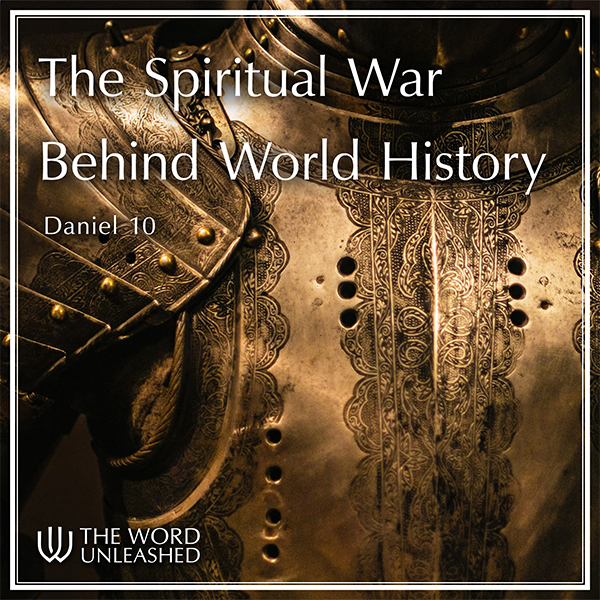
by Melinda Savoy | Apr 17, 2023 | The Spiritual War Behind World History
We as Christians need to understand that Daniel 10 teaches us that our Lord God is always with His people, especially in their most difficult times. Every believer is going through or will go through difficult circumstances in this life—that is an unavoidable reality in a fallen world.

by Melinda Savoy | Apr 18, 2023 | The Spiritual War Behind World History
The book of Daniel testifies to the fact that God is sovereign over all of human history. There hasn’t been a moment in time when God has been subservient to any kings, rulers, or empires. He rules from His throne from eternity past to eternity future.

by Melinda Savoy | Apr 19, 2023 | The Spiritual War Behind World History
The Bible teaches that there are spiritual beings that operate throughout the universe, in this world, and in each of our lives—this is true of both holy angels and fallen angels, or demons. Daniel 10 describes the activity of angels and demons as it relates to their involvement with influencing the leaders and empires of the world.

by Melinda Savoy | Apr 20, 2023 | The Spiritual War Behind World History
As Christians our confidence is in the fact the word of God teaches that Christ will return to this earth and will crush all His enemies beneath His feet. And God will use this world and the spiritual beings behind it to accomplish that very purpose.

by Melinda Savoy | Apr 21, 2023 | A Portrait of Faith
The Bible teaches that true, authentic faith demands abandoning one’s own life in order to wholeheartedly follow Christ. Paul uses Abraham as an illustration of this kind of faith.

by Melinda Savoy | Apr 24, 2023 | A Portrait of Faith
One of Paul’s primary points in Romans 4 is that true, authentic faith is not merely intellectual assent to the facts of the gospel. Those facts are necessary, but the facts alone do not save anyone. Rather, you have to have knowledge of the gospel, you have to be convinced that that knowledge is in fact the truth, and you have to trust in Jesus Christ alone for salvation.

by Melinda Savoy | Apr 25, 2023 | A Portrait of Faith
The Bible teaches that justifying faith is deeply rooted in the character of God. In fact, it is God alone who not only has the power to give spiritual life to spiritually dead sinners, but He also desires to do so. His merciful and gracious character towards sinners is displayed through the person and work His Son, Jesus Christ.

by Melinda Savoy | Apr 26, 2023 | A Portrait of Faith
In Romans 4 Paul uses the Old Testament character, Abraham, as an illustration of what it means to be justified by faith before God: Abraham believed God and it was credited to him as righteousness.

by Melinda Savoy | Apr 27, 2023 | A Portrait of Faith
The Bible often connects justification, or salvation, with the grace of God—that attribute of God by which He desires to be gracious to those people who deserve the exact opposite. As he uses Abraham as an illustration of true, saving faith in Romans chapter 4, Paul says that a mark or quality of that faith is that it is a gift of God’s grace.

by Melinda Savoy | Apr 28, 2023 | A Portrait of Faith
In Romans 4 Paul uses Abraham as an illustration, or portrait, of true, saving faith—the fact that Abraham believed the promises of God and was justified by faith alone. God’s gracious interaction with Abraham is the template for justification by grace alone.

by Melinda Savoy | May 1, 2023 | A Portrait of Faith
In Romans 4 Paul uses an Old Testament character, Abraham, to illustrate several qualities that are true regarding the great doctrine of justification. One of those qualities is that even though we as Christians have weaknesses, true saving faith focuses on God’s promises and on God’s power to keep us saved. This was true of Abraham and it is true of every Christian.

by Melinda Savoy | May 2, 2023 | A Portrait of Faith
In Romans 4 Paul uses a financial term to describe that amazing transaction that takes place in the important doctrine of justification. That term is “credit.” It is a legal decision of God as Judge in which He credits the believing sinner’s sins to Christ on the cross, and then He credits to the sinner the merits of Christ’s perfect life—His righteousness. This entire transaction is born out of God’s grace alone and it is of faith alone.

by Melinda Savoy | May 3, 2023 | Six Steps to Spiritual Stability
Spiritual maturity begins with being in right relationships with other Christians.

by Melinda Savoy | May 4, 2023 | Six Steps to Spiritual Stability
In every circumstance that Christians find themselves in, we must rejoice because God is still on His throne.

by Melinda Savoy | May 5, 2023 | Six Steps to Spiritual Stability
Worry is essentially the mental strangulation of the mind with whatever is the object of your worry. Does worry characterize your life as a believer?

by Melinda Savoy | May 8, 2023 | Six Steps to Spiritual Stability
Prayer is one of the remedies that Christians use to deal with worry and anxiety.

by Melinda Savoy | May 9, 2023 | Six Steps to Spiritual Stability
Christians must choose to think biblically in all matters, phases, and circumstances of life. We must cling to the Word of God and pray for the work of the Spirit to cultivate this mindset.

by Melinda Savoy | May 10, 2023 | Six Steps to Spiritual Stability
Christians must be aware of unbiblical philosophies that seek to undermine biblical thinking.

by Melinda Savoy | May 11, 2023 | Six Steps to Spiritual Stability
Christians must learn to live a disciplined life of obedience to the Word of God.

by Melinda Savoy | May 12, 2023 | Six Steps to Spiritual Stability
Spiritual maturity begins to develop once you implement the basic disciplines of the Christian life.

by Melinda Savoy | May 29, 2023 | No Faith, Weak Faith, & Little Faith
Authentic saving faith is only found in the person and work of Jesus Christ. Faith in the biblical Jesus and the biblical gospel is the only faith that offers true forgiveness of sins and eternal life.

by Melinda Savoy | May 30, 2023 | No Faith, Weak Faith, & Little Faith
This story captures the heart of Jesus’ ministry: that He has compassion on sinners who are willing to turn from their sins and put their faith and trust in Him. When Jesus encountered a demon-possessed boy, the boy’s father knew he could only trust in Christ to handle the situation.

by Melinda Savoy | May 31, 2023 | No Faith, Weak Faith, & Little Faith
In this remarkable story, a young boy and His father experience the power of darkness and of Satan, yet at the same time they find themselves face to face with God Himself, the Lord Jesus Christ. And in an act of divine sovereignty, Jesus brings the father from weak faith to saving faith.

by Melinda Savoy | Jun 1, 2023 | No Faith, Weak Faith, & Little Faith
In Mark 9 Jesus wanted the demon-possessed boy’s father to see that there is no problem that is too great for Him to fix. And the same is true of Jesus Christ today—He is willing to show compassion and grace, and to help those who come to Him.

by Melinda Savoy | Jun 2, 2023 | No Faith, Weak Faith, & Little Faith
When Jesus encounters the demon-possessed boy in Mark 9, the people present responded differently as relates to faith: The scribes had no faith; the father of the boy had weak faith; Jesus’ twelve disciples manifested little faith.

by Melinda Savoy | Jun 5, 2023 | No Faith, Weak Faith, & Little Faith
This amazing interaction between Jesus and the demon-possessed boy, highlights the great need to have real, authentic faith in Jesus Christ.

by Melinda Savoy | Jun 6, 2023 | Divine Revelation
The one true God has determined to reveal Himself to people in general revelation—that is an amazing reality, and we should praise God for it!

by Melinda Savoy | Jun 7, 2023 | Divine Revelation
King David says that God has revealed Himself to all humanity through that which has been seen—creation. This wonderful truth, however, is intended to be used for more than just theological discussions. It should motivate us as Christians to honor and worship God because He has graciously revealed His wonderful character to us.

by Melinda Savoy | Jun 8, 2023 | Divine Revelation
In addition to God’s general revelation which has been made known to all people, God has uniquely revealed Himself in the Bible—special revelation. And it is that revelation that gives us the truth about Jesus Christ and the gospel, which can radically transform lives.

by Melinda Savoy | Jun 9, 2023 | Divine Revelation
Psalm 19 teaches that God’s special revelation to us in the Scripture is to be desired more than gold, and is sweeter than fine honey. The truth is, like the psalmist, the words of Scripture must consume our hearts, helping us to live righteously for the Lord Jesus Christ and His gospel.

by Melinda Savoy | Jun 12, 2023 | Malachi - A Virtual Tour
The book of Malachi helps set our thinking straight—that we can be confident of who God is and that He will fulfill all the promises He has made in His Word. This should give us great confidence that God has a good and perfect plan for His people.

by Melinda Savoy | Jun 13, 2023 | Malachi - A Virtual Tour
At times, we as Christians can doubt God’s goodness and we can fail to trust Him and His Word. But the prophet Malachi reveals that we can trust God, knowing that He loves His people and will always keep His promises.

by Melinda Savoy | Jun 14, 2023 | Four Soils
The parable of the four soils provides amazing insight into Who is ultimately in control of salvation—God. Our responsibility as Christians is to faithfully present the truth of the gospel of Jesus Christ to those who do not know Him, and we are simply called to trust and rely on God for the results of that gospel invitation.

by Melinda Savoy | Jun 15, 2023 | Four Soils
The central focus of Jesus’ parable of the soils is the soil into which the seed falls. This parable is absolutely crucial for us as Christians to understand as, according to Jesus, understanding this parable is foundational to understanding the rest of His parables.

by Melinda Savoy | Jun 16, 2023 | Four Soils
In this parable, the four human hearts react differently to the truth of the gospel message concerning Jesus Christ. In every situation the seed, or the gospel message, is identical. But whether someone believe the message depends on the condition of their human heart.

by Melinda Savoy | Jun 19, 2023 | Four Soils
The parable of the soils provides a theological grid for how Christians are to understand why people reject or believe the gospel. The issue isn’t Jesus or the gospel message, but the heart (or soil) of the one who hears the gospel.

by Melinda Savoy | Jun 20, 2023 | The Biblical Priority of Baptism
If Jesus is your Lord, the Bible teaches that such a confession must be public, expressed through baptism. Of course baptism doesn’t save you, but it demonstrates that you have been saved and radically changed by the gospel of Jesus Christ.

by Melinda Savoy | Jun 21, 2023 | The Biblical Priority of Baptism
There are several misunderstandings of baptism in the world today. So an important distinction has to be made as it relates to believers’ baptism: baptism is not the cause of salvation; it is a public profession of salvation.

by Melinda Savoy | Jun 22, 2023 | Husband, Love Your Wife
God has clearly told us in His Word how husbands should love their wives—according to Eph. 5, “…just as Christ also loved the church and gave Himself up for her…” Husbands must love like our Lord did, where we lay aside our desires and our preferences and sacrificially love and serve our wives.

by Melinda Savoy | Jun 23, 2023 | Husband, Love Your Wife
The Lord Jesus Christ is the greatest example of self-sacrificial love our world has ever seen. The eternal Son of God took to Himself human flesh so that He might die, not for His sins, because He had none, but for the sins of all those who would ever believe in Him.

by Melinda Savoy | Jun 26, 2023 | Husband, Love Your Wife
The Bible not only calls husbands to love their wives sacrificially, but they must also demonstrate a love that sanctifies. This simply means that a husband’s love for his wife must be deeply concerned with her spiritual progress in the Christian life.

by Melinda Savoy | Jun 27, 2023 | Husband, Love Your Wife
In Ephesians 5 the apostle Paul teaches that all believing husbands must love their wives like Christ has loved the church. But in order for husbands to love in this way, they must actively purse biblical sanctification in their own lives.

by Melinda Savoy | Jun 28, 2023 | Husband, Love Your Wife
In this great passage, after the apostle Paul lays the groundwork for a husband’s love for his wife—that it must be sacrificial and sanctifying—he goes on to describe that that love ought to be like the love and care he shows for his own body.

by Melinda Savoy | Jun 29, 2023 | Husband, Love Your Wife
The Bible teaches that husbands are supposed to cherish their wives and show them honor and respect. In Ephesians 5 the apostle Paul empathically makes this point. A biblical husband is one who appreciates and values his wife and never humiliates or intimidates her.

by Melinda Savoy | Jun 30, 2023 | Husband, Love Your Wife
As the apostle Paul continues to explain how husbands should love their wives, he quotes from Genesis chapter 2, which teaches that a man and a woman have become one flesh in marriage.

by Melinda Savoy | Jul 3, 2023 | Husband, Love Your Wife
The Bible teaches that in God’s infinite wisdom He has created and determined what marriage is to be like. Not only has He defined it as a union between one man and one woman, He has said that it is a picture of how Christ loves His church.

by Melinda Savoy | Jul 28, 2023 | The Dark Guest
Romans 7 is a powerful reminder of our own sinfulness, and Paul helps us put into words the very feeling of our soul when we sin. We should never take sin lightly, and this passage makes that clear. Paul’s words in Romans 7 should also help us express how grateful we are to God for sending His only Son, Jesus Christ, into the world to save sinners.

by Melinda Savoy | Jul 31, 2023 | The Dark Guest
In Romans chapter 7 the apostle Paul describes his ongoing personal battle against sin. Although he had been forgiven of his sins and was a new creation in Jesus Christ, Paul understood the need to wage war against the dark guest, as he calls his flesh.

by Melinda Savoy | Aug 1, 2023 | The Dark Guest
In Romans 7 Paul describes the struggle that all believers have with sin. Although every true Christian has been born again, we are currently growing in our sanctification and holiness before the Lord. This simply means that as time passes Christians experience a decreasing pattern of sin and an increasing pattern of righteousness in their own lives.

by Melinda Savoy | Aug 2, 2023 | The Dark Guest
In one of the most controversial passages in the New Testament, Romans 7, the apostle Paul describes the battle that exists between Christians and their own remaining sin. Even though as Christians we are washed and renewed in Christ and desire to obey God’s good and perfect law, we cannot escape the reality of sin.

by Melinda Savoy | Aug 3, 2023 | The Dark Guest
In Romans 7 the apostle Paul makes it clear that all true Christians will wage war against their own personal sin. Paul’s words aren’t meant to be an indictment against Christians and their walk with Christ, but to encourage them to be mindful of their own sin and to take extreme measures to deal with it. At the same time, Paul wants believers to know that it is normal to experience struggles with sin, but that is never to be used as a license to sin.

by Melinda Savoy | Aug 4, 2023 | The Dark Guest
As the apostle Paul finishes describing every Christian’s battle against their sinful flesh, he recalls a key component of the gospel—that Jesus Christ is Lord. What Paul means is that only the Lord Jesus Christ can deliver people from sin, and He is the only one who ultimately deals with sin, finally and forever.

by Melinda Savoy | Aug 7, 2023 | The Beatitudes
In the beatitudes Jesus gives us a series of powerful statements that describe every true subject in His spiritual kingdom—that is, every true Christian. If you have repented of your sins and believed in the Lord Jesus Christ, then the beatitudes and the specific qualities that Jesus describes will characterize your life.

by Melinda Savoy | Aug 8, 2023 | The Beatitudes
Jesus begins His most famous sermon by describing characteristics that are present in the life of every true follower of Jesus Christ. If you are saved and are in Christ’s spiritual kingdom, Jesus says that these characteristics, or beatitudes, are manifested in your life.

by Melinda Savoy | Aug 9, 2023 | The Beatitudes
Jesus begins the Sermon on the Mount by saying that every true subject of His kingdom, that is, every true Christian, is characterized by being poor in spirit. At first glance, it seems that such an interesting expression is an odd way for Jesus to begin a sermon in front of a large crowd. But as we’ll discover together, the starting point for being part of Jesus’ kingdom is to come to Him like a spiritual beggar, depending only on God’s grace for salvation.

by Melinda Savoy | Aug 10, 2023 | The Beatitudes
At the beginning of the Sermon on the Mount, Jesus describes that in order to be in His kingdom you have to come to terms with your spiritual poverty—that only Christ can bring you out of spiritual bankruptcy.

by Melinda Savoy | Aug 11, 2023 | The Beatitudes
As Jesus begins the Sermon on the Mount He describes several qualities that mark every true Christian. The second quality is that you must mourn over your own spiritual poverty. But what Jesus is saying is actually a paradox—He really means “Blessed are those who are unhappy.” You see, every true subject of Jesus’ spiritual kingdom understands the daily battle of sin.

by Melinda Savoy | Aug 14, 2023 | The Beatitudes
Do you profess to be a Christian? If so, then the qualities that Jesus describes at the beginning of the Sermon on the Mount in the beatitudes should characterize your life. One of those qualities is that every Christian genuinely mourns over their sin. This means they recognize their spiritual poverty and that their sin offends a holy God, and they plead for His grace and forgiveness.

by Melinda Savoy | Aug 15, 2023 | The Beatitudes
As Jesus continues to describe the qualities of true Christians, He says that they are gentle people. This doesn’t mean that Christians are weak and severely lacking in courage. But rather, Jesus is teaching His people that they are to be both outwardly and inwardly gentle people. And this should be the consistent pattern of their lives towards God and other people.

by Melinda Savoy | Aug 16, 2023 | The Beatitudes
In the Sermon on the Mount Jesus says that His true disciples are consistently characterized by meekness and gentleness. Because this quality is not inherent to human beings, you must be a follower of Jesus Christ and be under the power of the Holy Spirit to produce it. And if meekness is a reality in your life, Jesus says that you will partake in the new heaven and earth in the future.

by Melinda Savoy | Aug 17, 2023 | The Beatitudes
At the beginning of the Sermon on the Mount, as Jesus describes the qualities of every true Christian, He says that God’s people will hunger and thirst for righteousness. In the same way that every person depends on food and water for life, every Christian must desire to live righteously before God, both positionally and morally and ethically, according to what has been written in God’s Word.

by Melinda Savoy | Aug 18, 2023 | The Beatitudes
The Bible teaches that Jesus is the only place where spiritual hunger and thirst can be met. This is one of Jesus’ main points in the beatitudes at the beginning of the Sermon on the Mount. He is the only one who gives His own righteousness to sinners who repent and believe in Him. And He is the only one who works true righteousness, or holy living, in those who are saved.

by Melinda Savoy | Aug 21, 2023 | The Beatitudes
At the beginning of the Sermon on the Mount Jesus essentially gives a checklist of eight qualities that define every true Christian. One of those qualities is being merciful. But what does the Bible teach about mercy? The Old Testament teaches that mercy or compassion is an attribute of God, meaning that He is a gracious God who desires to extend His mercy to sinners.

by Melinda Savoy | Aug 22, 2023 | The Beatitudes
In the Sermon on the Mount Jesus says that those who belong to His spiritual kingdom are those who have experienced God’s mercy in salvation and those who manifest that reality by extending mercy to others. He then says of every Christian who extends mercy that they will stand before God someday, and there, on the day of judgment, they will experience God’s everlasting mercy.

by Melinda Savoy | Aug 23, 2023 | The Beatitudes
In the Old Testament God gave several laws that governed cleanliness and uncleanliness. This was simply to display that God Himself required that He be approached in a specific way. Jesus makes the same point in the beatitudes at the beginning of the Sermon on the Mount: “Blessed are the pure in heart, for they shall see God.” Friend, let me ask you: Are you pure in heart?

by Melinda Savoy | Aug 24, 2023 | The Beatitudes
At the beginning of the Sermon on the Mount Jesus describes qualities that characterize every person who has repented of their sins and put their faith in Jesus Christ. Jesus then goes on to promise that every true believer will see God. But if God is spirit, how will we as Christians see Him?

by Melinda Savoy | Aug 25, 2023 | The Beatitudes
Human conflict not only characterizes world history, but it is ever present in our world today. Because all humanity is sinful and we live in a sin-cursed world, conflict is inevitable. But as Christians, in the Sermon on the Mount Jesus calls us to a higher standard. He says that all His followers, all those who are subjects of His kingdom, will be characterized by being peacemakers.

by Melinda Savoy | Aug 28, 2023 | The Beatitudes
The Bible teaches that God is a God of peace; that is one of His many attributes. The Bible also teaches that Jesus came into this world on a rescue mission to make peace between a holy God and sinful people. But in the Sermon on the Mount Jesus calls every one of His followers to be peacemakers. But what exactly does this mean for us as Christians?

by Melinda Savoy | Aug 29, 2023 | The Beatitudes
Jesus begins His most famous sermon, the Sermon on the Mount, by identifying several qualities that should be present in the life of every Christian. For those who profess to be followers of the biblical Jesus Christ, these qualities should be pursued on a daily basis. Therefore, we as Christians must be dedicated to reading, meditating on, and reviewing the beatitudes as part of our walk with Christ.

by Melinda Savoy | Aug 30, 2023 | The Beatitudes
Those who are in Jesus’ spiritual kingdom by grace alone, through faith alone, in Christ alone will consistently manifest the beatitudes that Jesus speaks of at the beginning of the Sermon on the Mount. For us as Christians, it is critical to understand the beatitudes, because they are the entry point to understanding and living out the rest of Jesus’ sermon, which focuses on living for His kingdom right here and now.

by Melinda Savoy | Aug 31, 2023 | The Beatitudes
During Jesus’ life and ministry He made it clear that all those who are willing to be His followers will suffer persecution—Jesus said to His disciples that if they persecute me, they will persecute you. In fact, that is the teaching of the entire Bible. All those who desire to live godly as part of Christ’s kingdom will suffer and will face persecution.

by Melinda Savoy | Sep 1, 2023 | The Beatitudes
It is very common today for Christians to misunderstand God’s purposes for allowing His people to be persecuted. Although God is not the author of sin and persecution, He ultimately uses them for His purposes. Not only was this true of Joseph in the Old Testament and Jesus in the New Testament, but it is also true of every believer at all times.

by Melinda Savoy | Sep 4, 2023 | The Ram, the Goat & the Little Horn
This passage teaches that God is sovereign over history in its entirety and down to the smallest detail. At the same time, this chapter is a call for Christians to trust our great God and Savior, Jesus Christ, who is the King of Kings.

by Melinda Savoy | Sep 5, 2023 | The Ram, the Goat & the Little Horn
Daniel wrote to the Jewish nation and let them know that God is sovereign and that He would be with them during the trials and sufferings that were to come. The same is true for us Christians today, for we serve a God who is sovereign, who controls all things, and who will never leave or forsake us. Rather, He will accomplish all His plans for His great glory and our good.

by Melinda Savoy | Sep 6, 2023 | The Ram, the Goat & the Little Horn
The Bible teaches that God’s people will face persecution in this life. Thankfully, in God’s kindness, His Word reveals how we as Christians are called to deal with and respond to opposition and upheaval. Daniel chapter 8 serves as a blueprint–one that warns Christians that persecution and hostility are inevitable, and that our only response should be to trust our sovereign God and remain faithful to His Son, our Lord and Savior Jesus Christ.

by Melinda Savoy | Sep 7, 2023 | The Ram, the Goat & the Little Horn
In this magnificent chapter, God issues, through the prophet Daniel, a message of comfort and hope to His people. God informs them about a coming period of intense persecution and then promises that He will ultimately destroy their enemies and that His people, the Jews, will survive this intense persecution. For us as Christians today, this chapter gives us confidence that our great God rules from heaven over all human history, and we can trust him with our lives.

by Melinda Savoy | Sep 8, 2023 | The Ram, the Goat & the Little Horn
Daniel chapter 8 is a fascinating chapter that highlights either explicitly or implicitly many of God’s attributes: We are shown that God is omniscient–that He knows all things. We learn that He is sovereign–that He controls all things. And we learn that He is a good God–He is loving, gracious, and full of compassion. But these attributes aren’t limited to Daniel and the times he was writing about. These attributes of God are still true of Him today.

by Melinda Savoy | Sep 11, 2023 | The Ram, the Goat & the Little Horn
Daniel 8 is a powerful message that depicts God’s perfect attributes, and it is also a message of hope and comfort for all of those who have trusted in the Lord Jesus Christ. Even in the trials, difficulties, and sufferings of this life, we as Christians can rest in the character of God and the person and work of Jesus Christ for comfort.

by Melinda Savoy | Sep 12, 2023 | Old Testament Survey
The Old Testament anticipates the Messiah, the Lord Jesus Christ, who would eventually come into this world to redeem a people chosen by God from eternity past. The Old Testament tells of a Savior to come Who is able to forever deal with sin, Who will establish an earthly kingdom and eternally reign in a new heaven and earth. Christians cannot neglect the Old Testament because it is part of our story of redemption.

by Melinda Savoy | Sep 13, 2023 | Old Testament Survey
The book of Genesis is crucial as it establishes God as the Creator and Sustainer of the universe. In fact, Genesis records that God, by His very word, spoke everything into existence out of nothing—theologians call this “ex-nihilo,” which is Latin for “out of nothing.” This important doctrine sets the stage for the rest of Scripture.

by Melinda Savoy | Sep 14, 2023 | Old Testament Survey
It is common for Christians today to focus on the apologetic aspects of the book of Genesis in its defence of creation, marriage, the sanctity of life, and other issues. But at its heart, Genesis begins the story of a coming Redeemer who will crush the head of the serpent and establish His reign and rule over the world forever.

by Melinda Savoy | Sep 15, 2023 | Old Testament Survey
The book of Exodus is the amazing story of God raising up of Moses to deliver His people, the nation of Israel, from slavery in Egypt and bring them to the Promised Land. But the task was not easy. Moses had to go up against Pharoah, the king of Egypt, to demand that he let God’s people go. In God’s providence, Pharoah’s stubborn refusal put God’s power on display and made His name known in Egypt and among the Israelites.

by Melinda Savoy | Sep 18, 2023 | Old Testament Survey
The Book of Exodus records God’s interactions with Moses on Mount Sinai, which became the foundation and framework for life as the people of God. It was on Sinai that God gave Moses the Ten Commandments, His Law, and the sacrificial system. For the next two thousand years, the people of Israel would be intimately involved with God’s Law as the means to honor and worship Him and live separate from the pagan cultures around them.

by Melinda Savoy | Sep 19, 2023 | Old Testament Survey
In one of the most remarkable scenes in the Old Testament, God gave His Ten Commandments to Moses on Mount Sinai. But these commandments are more than just external rules for God’s people to follow–they are internal, spiritual commands that every follower of God is required to obey from the heart.

by Melinda Savoy | Sep 20, 2023 | Old Testament Survey
The Old Testament books of Joshua and Judges record the highs and lows of the nation of Israel. On one hand, Joshua tells of God’s people finally entering the Promised Land, the land God covenanted to give to Abraham and his descendants forever. But soon after the conquest, Judges records that the people of Israel chose abandon God’s Law and do what was right in their own eyes.

by Melinda Savoy | Sep 21, 2023 | Old Testament Survey
Many Christians know that David wrote roughly half of the psalms recorded in the Old Testament. And most also know that David committed wretched sins that he repented of before the Lord. But fewer understand how the life, ministry, and kingship of David play a vital role in the story of the coming Messiah that unfolds in the Old Testament. The Scriptures teach that the Messiah would be a descendent of David and that He will reign forever on his throne.

by Melinda Savoy | Sep 22, 2023 | Old Testament Survey
The Old Testament books of 1 and 2 Kings record the nation of Israel’s consistent disobedience toward God and His law and their repeated violation of the Mosaic Covenant that had been given on Mount Sinai. Because of their rebellion, the people faced many challenges and hardships, experiencing firsthand the curses God had promised for disobedience. But at their heart, 1 & 2 Kings describe a faithful and loyal God who desires to be gracious to sinners and to offer repentance, restoration, and salvation for all who come to Him.

by Melinda Savoy | Sep 25, 2023 | Old Testament Survey
The prophets played a critical role in the Old Testament narrative and in the overarching story of the Bible, which is that God is redeeming a people by His Son for His Son’s glory. The prophets were appointed by God to speak on His behalf with a message of judgment against sin and the call to look to Him in repentance and faith for salvation. Several of the prophets wrote the Old Testament Scripture, giving us God’s very own words to describe and communicate His plan to save sinners through Jesus Christ.

by Melinda Savoy | Sep 26, 2023 | Old Testament Survey
The wisdom literature, or poetical books, of the Old Testament don’t advance the story or narrative. Rather, they are highly instructive books that teach God’s people how to respond to God’s sovereignty in the midst of suffering, how to worship Him, and how to live wisely, lovingly and joyfully in a fallen world.

by Melinda Savoy | Sep 27, 2023 | Old Testament Survey
The book of Ecclesiastes is often either misunderstood or neglected entirely because of its difficult and challenging subject matter. But at its heart, Ecclesiastes is King Solomon’s memoir of the life that he lived “under the sun,” or on this earth. Inspired by the Holy Spirit, Solomon wrote about a philosophy of life that centers around two major propositions: first, that life is a gift from God to be enjoyed, but also that life is mysterious and will eventually come to an end. Friend, do you understand life from God’s perspective?

by Melinda Savoy | Sep 28, 2023 | Old Testament Survey
One of the major movements in Old Testament history begins with Israel’s exile at the hands of the Assyrians in 722 BC. It was during that time that the northern ten tribes of Israel were destroyed. Several decades later, the prophet Jeremiah prophesied that the southern two tribes of Judah and Benjamin would also be taken into captivity by the Babylonians. Their exile would last for 70 years, but in the midst of this difficult time, God remained faithful, pleading with HIs people to turn from their wicked ways and believe in Him.

by Melinda Savoy | Sep 29, 2023 | Old Testament Survey
In the final movement of Old Testament history, God sovereignly and providentially worked among His people, calling them to repentance and directing them to carefully obey His word. After the people of Israel had spent so much of their history doing what was right in their own eyes, they finally submitted to God’s Word under the leadership of Ezra and Nehemiah.

by Melinda Savoy | Oct 2, 2023 | Tribulation Saints
The book of Revelation reveals not only God’s justice but, surprisingly, it showcases His mercy and grace. Until the end of time, God reaches out to call sinners to repent and trust in His Son Jesus Christ for salvation.

by Melinda Savoy | Oct 3, 2023 | Tribulation Saints
During the seven-year tribulation period, God will use 144,000 believing Jews to ignite one of the greatest revivals in human history, demonstrating His desire for sinners to come to a saving knowledge of the truth.

by Melinda Savoy | Oct 4, 2023 | Tribulation Saints
During the future seven-year tribulation period described in Revelation 7, the apostle John calls our attention to a multitude of believers in heaven–a multitude so great that no one can count them. This group represents every nation on earth—of all ethnicities and languages.

by Melinda Savoy | Oct 5, 2023 | Tribulation Saints
The book of Revelation teaches that God has an eternal plan and that He is working out that plan according to His great purposes. Every event described in Revelation has a purpose–and so does everything that happens to us as Christians today.

by Melinda Savoy | Oct 6, 2023 | The Seventh Seal and the First Six Trumpets
Revelation 8 starts by highlighting the truth that God hears the prayers of those redeemed through Christ during the tribulation. This is a powerful reminder that our great God hears the prayers of His people, no matter the situation.

by Melinda Savoy | Oct 9, 2023 | The Seventh Seal and the First Six Trumpets
Revelation 8–9 describes God’s judgment and wrath being poured out on the earth during the second half of the Tribulation. And it will fall in direct response to the prayers of God’s people. These amazing chapters teach us that God hears the prayers of His people and is eager to respond according to His will.

by Melinda Savoy | Oct 10, 2023 | The Seventh Seal and the First Six Trumpets
The trumpet judgments described in Revelation 8–9 are a series of judgments God will unleash on the unbelieving world during the future seven-year tribulation period. These judgments are similar to the 10 plagues in Egypt during the time of Moses, and they are described by many Old Testament prophets.

by Melinda Savoy | Oct 11, 2023 | The Seventh Seal and the First Six Trumpets
In these profound chapters, the apostle John describes several judgments of God unleashed on the unbelieving world during the seven-year tribulation period. As these inevitable realities unfold, God continues to show His unmatched holiness and perfect justice. At the same time, His mercy continues with the gracious invitation to believe in the Lord Jesus Christ for the forgiveness of sins and salvation.

by Melinda Savoy | Oct 12, 2023 | The Seventh Seal and the First Six Trumpets
The apostle John describes the sixth trumpet judgment as a plague of locusts fueled by Satan and his demons. It will bring catastrophe to the unbelieving and unrepentant world.

by Melinda Savoy | Oct 13, 2023 | The Seventh Seal and the First Six Trumpets
Since the beginning of time in the Garden of Eden, Satan has opposed God’s plan and His people. In the future, according to the book of Revelation, his murderous desires will escalate as he seeks to blind people from the truth of the gospel and keep them enslaved in their sin.

by Melinda Savoy | Oct 16, 2023 | The Seventh Seal and the First Six Trumpets
The Bible teaches that God is not the source of evil, nor does He tempt or force anyone to do evil. This is a critical doctrine to understand, because in the book of Revelation, the apostle John describes how wickedness and evil will run rampant during the future tribulation period.

by Melinda Savoy | Oct 17, 2023 | The Seventh Seal and the First Six Trumpets
At an appointed time in the future, Satan, his demons, and the unbelieving world will magnify their hatred and rejection of God as they continue to freely sin against Him. But such a dark and unthinkable time provides every generation of Christians with many timeless truths about God and the urgency to preach the gospel to our lost world.

by Melinda Savoy | Oct 18, 2023 | Jesus on Divorce
As Christians, we must always ask, “What does the Bible say?” And what the Bible teaches about divorce must be our belief and practice. In this series, Tom explains from Scripture that God hates divorce and will not allow it among His people, with only two exceptions—we’ll discover those exceptions in this series

by Melinda Savoy | Oct 19, 2023 | Jesus on Divorce
As Jesus taught His disciples about divorce, He not only wanted them to understand God’s view of divorce but also how that view would be completely counter-cultural. For those who profess Christ, our view of divorce will be very different from those who advocate for divorce on demand.

by Melinda Savoy | Oct 20, 2023 | Jesus on Divorce
Sadly, many professing Christians haven’t been adequately taught from Scripture on the topic of divorce, and many churches have neglected to equip their people to deal with this difficult but relevant issue. When Jesus taught His disciples about divorce, He set a precedent as it relates to God and His Word: we must believe what He has said and also obey it. And this applies to the issue of divorce.

by Melinda Savoy | Oct 23, 2023 | Jesus on Divorce
Jesus demonstrates that God established marriage and gave it a prominent place in His creation—this is clear in Genesis 1–2. God also established the parameters of marriage: male and female, and only two: one man and one woman. And he established the priority of marriage—you are to make that the highest human relationship in life. Finally, God established the permanence of marriage—the two becoming one indivisibly and inseparably.

by Melinda Savoy | Oct 24, 2023 | Jesus on Divorce
In this powerful passage, Jesus Christ teaches that God hates divorce and will not allow it among His people, with only two exceptions. But it was common during Jesus’ day for the emphasis to be placed on the exceptions in order to get out of a marriage rather on its solidarity and importance as an institution before God. Jesus seeks to clear the air, sharing God’s heart for marriage, divorce, and even remarriage.

by Melinda Savoy | Oct 25, 2023 | Jesus on Divorce
As we continue to live in a culture that devalues and is even hostile toward marriage while promoting divorce, it is critical for us to be confident in God and His Word. We can be confident that He has equipped us to uphold the truth and defend the institution of marriage.

by Melinda Savoy | Oct 26, 2023 | Lord Willing
As followers of Jesus Christ, we must constantly acknowledge and joyfully accept God’s sovereignty over our lives, no matter the circumstances that this life may bring. Such a profound doctrine ensures us that nothing that happens in our lives is accidental and that God intends to use it for His glory and our good.
by Melinda Savoy | Oct 27, 2023 | Lord Willing
In the book of James, James calls us as believers to constantly acknowledge God’s control over every facet of our lives. To live the Christian life to the fullest, we must embrace this crucial truth. But closely related to God’s sovereignty is His providence—that is, how God works everything out according to His will and our good.

by Melinda Savoy | Oct 30, 2023 | Lord Willing
The sovereignty of God is a profound doctrine that is taught all throughout Scripture. One of the key passages that teaches this truth is James 4, where James encourages Christians to rest in God’s sovereignty at all times.

by Melinda Savoy | Oct 31, 2023 | Lord Willing
James urges his readers and us today not to merely understand the truth about God and His sovereignty but to apply that truth daily in the detailed circumstances of our lives—and even as we anticipate the future.
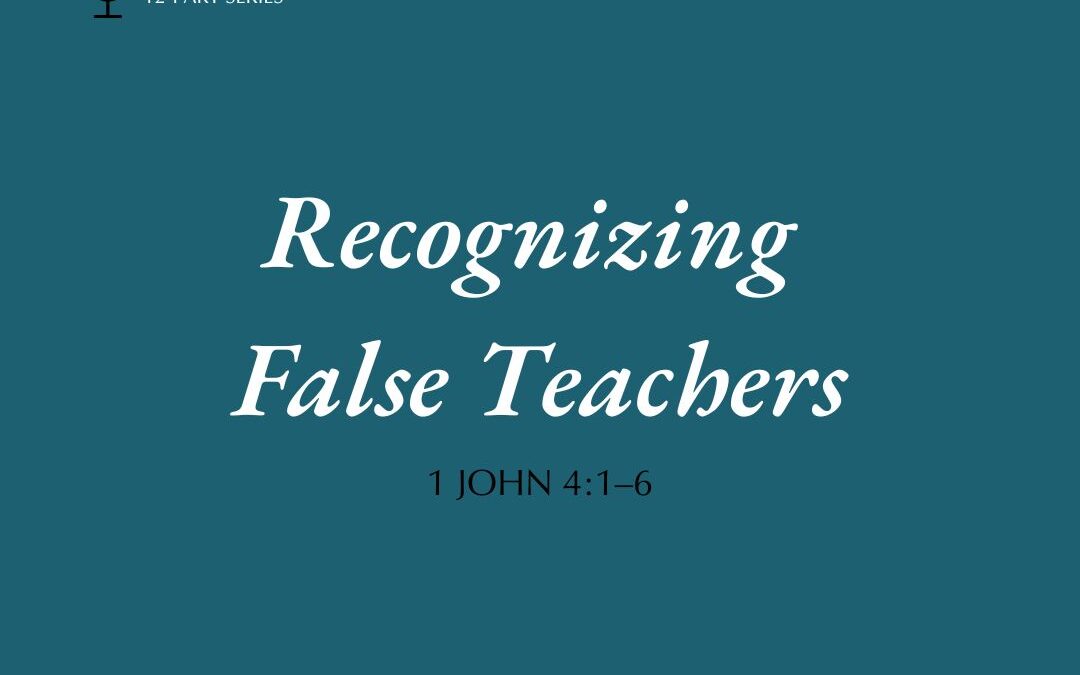
by Melinda Savoy | Nov 1, 2023 | Recognizing False Teachers
The Bible repeatedly acknowledges the reality of false teachers. This was true in the Old Testament, when false prophets arose among the people. The same is true in the New Testament, as false teachers in the first century sought to undermine the biblical Jesus and the biblical gospel. It is important to know that Scripture calls God’s people to recognize, identify, and avoid false teachers.

by Melinda Savoy | Nov 2, 2023 | Recognizing False Teachers
In 1 John 4, the apostle John warns first-century Christians about false teachers and the dangerous and damning influence they have. At the same time, his warning is every bit as vital for us as Christians today. Scripture insists that we be informed and stay alert for this constant danger lurking across the entire world.

by Melinda Savoy | Nov 3, 2023 | Recognizing False Teachers
The passage of Scripture that we are examining together in this series reveals that there are two competing versions of the Christian faith. There is a true Christian faith and a false or distorted Christian faith.

by Melinda Savoy | Nov 6, 2023 | Recognizing False Teachers
1 John chapter 4 contains several verses to help Christians identify and distinguish the true teachers of the Christian faith from the false ones. Moreover, John stresses that if you have a biblical view of God, then you understand the Christian faith.

by Melinda Savoy | Nov 7, 2023 | Recognizing False Teachers
In this great text, John demands that all of us who are true followers of Jesus Christ diligently apply several biblical tests and that we apply those tests to every spiritual idea and every spiritual message in order to distinguish genuine teachers who teach God’s saving truth from false teachers who teach damning error.

by Melinda Savoy | Nov 8, 2023 | Recognizing False Teachers
In this section of 1 John, the apostle John teaches that if any preacher or teacher teaches anything other than the biblical Jesus, they are false teachers. Therefore, they are not empowered by the Holy Spirit; they are empowered by demons, and their version of the Christian faith is not the true saving faith, but it is a false damning substitute.

by Melinda Savoy | Nov 9, 2023 | Recognizing False Teachers
In 1 John 4, the apostle John, writing under the inspiration of the Holy Spirit, says that you must believe in the biblical Jesus in order to be saved—you have to believe that Jesus of Nazareth is the Son of God, the Messiah, who has come in the flesh.

by Melinda Savoy | Nov 10, 2023 | Recognizing False Teachers
In 1 John 4, the apostle John helps Christians understand how to differentiate between true and false teachers, true and false views of God, true and false views of Jesus Christ, and true and false views of the gospel.

by Melinda Savoy | Nov 13, 2023 | Recognizing False Teachers
In this passage, John the Apostle, and ultimately our Lord Jesus Himself, is demanding that each of us diligently apply several biblical tests to every spiritual idea and every spiritual message to distinguish genuine teachers from false teachers. But it is important to recognize that false teachers will, in fact, use the Bible in their messages.

by Melinda Savoy | Nov 14, 2023 | Recognizing False Teachers
As the apostle John continues to help Christians identify true and false teachers, he teaches that all true Christians recognize the Scripture as God’s authoritative Word.

by Melinda Savoy | Nov 15, 2023 | Recognizing False Teachers
In 1 John 4, the apostle John describes how all true believers recognize the truthfulness of God’s Word and long to put themselves under its authority—to believe it and obey it. However, false believers, that is, those who claim to know Christ but really don’t, refuse to put themselves under the authority of the Word of God.

by Melinda Savoy | Nov 16, 2023 | Recognizing False Teachers
A common characteristic of false teachers is that they subtly distort God’s Word by either undermining its truth or finding ways to add to it—either by supposed new revelation or intuition. Rather than preaching and teaching the Word of God for what it is—the word of God—they promote views that are contrary to what Scripture says about itself.

by Melinda Savoy | Nov 17, 2023 | Do You Only Love Those Who Love You?
In Scripture, there are several commands to love someone, but in the Sermon on the Mount, our Lord chooses the most difficult of all—love your enemies. And He commands us to must pray for them, bless them, and even do good to them. As professing Christians, we must obey Christ in all areas of our lives, including loving our enemies.

by Melinda Savoy | Nov 20, 2023 | Do You Only Love Those Who Love You?
In the Sermon on the Mount, Jesus calls all believers to love one another, including those who would be considered enemies. Since God is characterized by self-giving affection for all of humanity that He created in His image, we too should imitate His love. God Himself has concern for their welfare and well-being, so we as Christians should be marked by the way we love others

by Melinda Savoy | Nov 21, 2023 | Do You Only Love Those Who Love You?
In the Sermon on the Mount, Jesus sought to correct some of the bad teaching and theology of the Pharisees. In particular, they had distorted the Old Testament teaching on loving your enemies, so Jesus corrects them and offers His disciples the right interpretation and understanding.

by Melinda Savoy | Nov 22, 2023 | Do You Only Love Those Who Love You?
In the Sermon on the Mount, Jesus teaches that all His true subjects, His true disciples, will demonstrate a genuine love for their friends as well as a genuine love for their enemies. For us as Christians, we must examine our own hearts and ask ourselves, “Do I truly love my enemies?” You see, being a Christian is more than a mere profession; it is a way of life.

by Melinda Savoy | Nov 23, 2023 | Give Thanks and Sing!
Psalm 92, which celebrates the greatness of God’s work, specifically His sovereign rule of the moral universe, a rule that manifests itself in both the destruction of the wicked and the prosperity and final triumph of the righteous. This psalm also describes how it is good for the people of God to give thanks and to sing praises to the Lord.

by Melinda Savoy | Nov 24, 2023 | Give Thanks and Sing!
The book of Psalms not only reveals the character of God, but it also provides God’s people with a manual for how to worship Him in ways that are acceptable to Him. In Psalm 92, the psalmist writes about the steadfast love of God and the fact that He continues to be faithful to His character and His people.

by Melinda Savoy | Nov 27, 2023 | Navigating Christian Liberty
God has not left us in the dark about how to make decisions regarding Christian liberties. He has provided us with two resources to guide us as we make decisions about such matters: our conscience and His eternal Word.

by Melinda Savoy | Nov 28, 2023 | Navigating Christian Liberty
Every Christian is faced with making decisions about issues and topics that the Bible either doesn’t mention at all or that, if it does, are not entirely definitive. The challenge for Christians is to exercise their liberties in such a way that glorifies God and is in the best interest of other brothers and sisters in Christ.

by Melinda Savoy | Nov 29, 2023 | Navigating Christian Liberty
So far in this series, we’ve considered the fact that we, as Christians, should expect legitimate differences on issues of conscience. This was true of the apostle Paul and the church in Rome in the first century—that is why he wrote this portion of Romans. But the Holy Spirit not only intended to help that church but also used the same principles to help Christians and churches today.

by Melinda Savoy | Nov 30, 2023 | Navigating Christian Liberty
The Bible teaches that every Christian will have to make decisions about issues and topics that the Bible either doesn’t mention at all or that, if it does, are not entirely definitive. In his letter to the Romans, the apostle Paul emphasizes that such liberties or issues of conscience must not be divisive or detrimental.

by Melinda Savoy | Dec 1, 2023 | Navigating Christian Liberty
In the first century, there were two primary issues on which there was huge disagreement in the Roman churches: the first was eating unclean foods, and the second was observing Jewish holy days that are listed in the Old Testament. As the apostle Paul sought to shepherd those Christians and those churches, he laid out several biblical principles to help them navigate through those situations, and those same principles apply today.

by Melinda Savoy | Dec 4, 2023 | Navigating Christian Liberty
Every generation of Christians will face having to make decisions about issues and topics that the Bible either doesn’t mention at all or that, if it does, are not entirely definitive. So, God, through the pen of the apostle Paul, provides Christians with several principles to navigate these types of situations. At the same time, Paul warns Christians that they must not sit in judgment of other Christians because of their convictions about certain Christian liberties.

by Melinda Savoy | Dec 5, 2023 | Navigating Christian Liberty
All of Scripture teaches that every single moral decision every Christian will make can be divided into one of three categories. First, the Bible explicitly commands it, and there is a chapter and verse to support it. Second, the Bible explicitly forbids it, and there is a chapter and verse that forbid it. Or third, it is an issue of conscience or Christian liberty, where there is no explicit verse that commands or forbids it.

by Melinda Savoy | Dec 6, 2023 | Navigating Christian Liberty
In every age, Christians will have to navigate making decisions about issues and topics that the Bible doesn’t mention at all or is not entirely definitive. This was a major challenge for first-century Christians and one of the reasons the apostle Paul wrote the great letter to the Romans.

by Melinda Savoy | Dec 7, 2023 | Navigating Christian Liberty
All Christians have to make decisions about issues and topics that the Bible either doesn’t mention at all or that, if it does, are not entirely definitive. In Romans 14–15, Paul deals with these issues, which have come to be known as Christian liberties or issues of conscience. These issues can be defined as the God-given freedom to make moral decisions not explicitly addressed in Scripture.

by Melinda Savoy | Dec 8, 2023 | Navigating Christian Liberty
Scripture teaches that all Christians will have to make decisions about topics that the Bible doesn’t explicitly address. Some common examples of this are the style of worship music that a church implements; consuming alcoholic drinks; what type of education or school a family should participate in; and entertainment choices.

by Melinda Savoy | Dec 11, 2023 | Navigating Christian Liberty
The Christian life includes making decisions about issues and topics that the Bible either doesn’t mention at all or that, if it does, are not entirely definitive. This is a reality that we, as Christians, cannot escape. But in God’s providence, He has given us in His Word key principles to help us navigate through these decisions and to do so primarily for the glory of God.

by Melinda Savoy | Dec 12, 2023 | Navigating Christian Liberty
As Christians, it is guaranteed in this life that we will have to make decisions about issues and topics that the Bible doesn’t specifically address. Yet, in Romans, the apostle Paul outlines several key principles to ensure that Christians navigate their Christian liberties for the glory of God and for the sake of other Christians.
by Melinda Savoy | Dec 13, 2023 | Navigating Christian Liberty
Christians are inevitably faced with having to make decisions about issues and topics that the Bible specifically doesn’t address. And the apostle Paul dedicates almost two chapters in the book of Romans to address this very issue. But towards the end of his instruction, Paul begins to pray to God the Father that his people wouldn’t have disunity regarding Christian liberties but that they would be of the same mind and heart because of their unity in Christ.

by Melinda Savoy | Dec 14, 2023 | Navigating Christian Liberty
The Bible teaches that the Christian life consists of making decisions about certain things that the Bible doesn’t explicitly speak about. But through the writing of the apostle Paul to the Romans, God gives his instructions for making these decisions in a way that honors His name and edifies those who have repented of their sins and believed in Christ.

by Melinda Savoy | Dec 15, 2023 | Navigating Christian Liberty
In every age, Christians are faced with making several decisions about certain things that the Bible never mentions or speaks on. In a profound portion of Scripture, the apostle Paul explains how Christians are to make these decisions. And as he does, Paul highlights the fact that because Christ has accepted us into His family, we should be willing to accept those brothers and sisters in Christ who may have a different view on a certain Christian liberty.

by Melinda Savoy | Dec 18, 2023 | Navigating Christian Liberty
God’s Word teaches that all Christians will have to make decisions about certain things that the Bible doesn’t explicitly address or mention. The Bible also teaches that God’s people will differ in their decisions and convictions about those issues. But Paul’s primary point in Romans 14–15 is that even though those differences do exist, they should never hinder believers from glorifying God and edifying God’s people.

by Melinda Savoy | Dec 19, 2023 | What Child Is This?
The overall theme or message of the book of Isaiah is that God is a Savior, and He is the only one who can truly rescue His people. This great theme unfolds in two primary ways: first, God is shown to be the only one who can physically save the nation of Israel from her enemies. And, second, God is the only one who can spiritually rescue His people from their sins.

by Melinda Savoy | Dec 20, 2023 | What Child Is This?
Seven hundred years before the birth of our Lord Jesus Christ, the prophet Isaiah gave a profound prophecy that describes the person and work of Christ. In simple terms, Isaiah describes Christ as the one who reigns over the entire universe, sovereignly ruling as He rightfully should. But such a rule also extends to every human life, including every human heart.

by Melinda Savoy | Dec 21, 2023 | What Child Is This?
The book of Isaiah is centered around the great theme of salvation: that God will save His people through the coming Messiah, our Lord Jesus Christ. In Isaiah 9, the prophet Isaiah records one of the greatest prophecies in all of the Old Testament, one that identifies the Messiah as a King who governs and rules the world from His throne. In this prophecy, Isaiah records several names or labels that describe the Messiah’s powerful rule over His people and the world.

by Melinda Savoy | Dec 22, 2023 | What Child Is This?
The Old Testament records dozens of prophecies about our Lord Jesus Christ. But none are as great and profound as what we find in the book of Isaiah, specifically in chapter 9. It is there that Isaiah describes Christ as our divine hero, our divine champion, and our divine fearless, victorious warrior.

by Melinda Savoy | Dec 25, 2023 | What Child Is This?
In this powerful passage, the prophet Isaiah presents three defining qualities of Jesus Christ, our Lord. We don’t just learn about the events of Christmas; we also learn about how our Lord relates to all of those who were His people yesterday, today, and forever. Isaiah, 700 years before the birth of Christ, describes Christ’s unique nature: that He is fully human. And he is God’s Son, meaning he is also fully man.

by Melinda Savoy | Dec 26, 2023 | What Child Is This?
Throughout history, many kings, rulers, and authorities have been elevated onto the world’s stage but also completely disappeared from the face of the earth at their deaths. For as Christians, we have a King who is enthroned in the heavens, one who rules with a rod of iron and whose reign and kingdom will never end—this is none other than our Lord Jesus Christ.

by Melinda Savoy | Dec 27, 2023 | The Person of Christ
Satan is a liar and deceiver, so he actively tries to promote unbiblical views of Jesus throughout the culture. As Christians, we must be grounded in the Scriptural teachings about Christ, but we also need to be informed of false and deceptive views for our own spiritual sake.

by Melinda Savoy | Dec 28, 2023 | The Person of Christ
The humanity of the Lord Jesus Christ is an essential doctrine of the Christian faith. In other words, if you have to believe in the humanity of Jesus—that the eternal Son of God took to himself human flesh—in order to be a Christian. The Bible not only teaches that He became man, but also why he became man. He became a man to bring salvation to lost sinners and to rescue people from the wrath of God that their sins deserve.

by Melinda Savoy | Dec 29, 2023 | The Person of Christ
We live in a world of people who acknowledge that Jesus of Nazareth existed in the first century. Many think of Jesus Christ as a wonderful man, a good teacher, or a special, unique prophet. But the Scriptures teach more than just Jesus’ humanity—in fact, they teach that He is also fully God. As we’ll discover, if Jesus is God, then He isn’t merely a wonderful man or good teacher. If Jesus is God, he isn’t merely a prophet. If Jesus is God, then you have to grapple with His claims that He is the only savior of the world.

by Melinda Savoy | Jan 1, 2024 | The Person of Christ
Jesus, as the God-man, claims to be the way, the truth, and the life, and that no one can be right with God except through Him. He claims to forgive people of their sins and grant them eternal life. He also claims that if you reject Him, you will suffer the wrath of God for eternity. Either Jesus is a liar who needs to be rejected, or a lunatic who is out of his mind, or He is, in fact, exactly who He says He is.

by Melinda Savoy | Jan 2, 2024 | Bible Study for Every Christian
The pattern in Scripture is that God’s people know and love His Word. This was true in the Old Testament, for example, when God instructed the nation of Israel to treasure His Word and teach it diligently to their children. The same, of course, is true in the New Testament with Jesus, the apostles, and the early church—the Bereans in Acts 17 searched and examined the Scriptures daily. So as Christians, we must be resolved and committed to reading and studying Scripture.

by Melinda Savoy | Jan 3, 2024 | Bible Study for Every Christian
It is important for us as Christians to understand that there are certain goals that we should set for Bible study. It is these goals that will help you prepare a road map as you set out on the journey of faithful Bible study. You see, Christians often look at Bible study as a means to collect certain facts or information about God, Christ, and the gospel. Although that is a worthy and necessary endeavor, much more is involved in studying God’s Word.

by Melinda Savoy | Jan 4, 2024 | Bible Study for Every Christian
Unfortunately, it is common in many evangelical Christian circles to approach studying the Bible with this in mind: What does the Bible mean to me? But that isn’t the question we should be asking. Rather, we need to ask: What does God, through the Holy Spirit and the original human authors, intend for this passage to mean? That’s why studying the Bible correctly is so important—it helps us as believers to discern what God said and what God means by what He said.

by Melinda Savoy | Jan 5, 2024 | Bible Study for Every Christian
Being a faithful student of God’s Word is hard work but is attainable with a commitment to setting aside time each day to read and having a plan or a series of steps to work through while you study. One part of the Bible study process is to pick a book of the Bible that you would like to study—one that is obtainable and manageable as you begin the Bible study process.

by Melinda Savoy | Jan 8, 2024 | Bible Study for Every Christian
For a variety of reasons, not everyone’s favorite subject in school was English. But for us as Christians, we need to dive into the realm of grammar in order to better understand what God has written in His Word. But the reality is that we use and analyze grammar on a daily basis, from reading articles and posts on the internet to reading and responding to emails and text messages. If we deal with and analyze grammar in the little things, how much more should we do so with God and His perfect Word?

by Melinda Savoy | Jan 9, 2024 | Bible Study for Every Christian
The observation step is a critical step in the Bible study process and one that cannot be overlooked. We as Christians must be willing to dig down into the depths of word studies and analyze grammar, knowing that we are trying to understand what the God of the universe is saying in His Word. At the same time, we must always keep in mind the big picture: that all the steps of Bible study that we are considering in this series are meant to drive us to a knowledge of God that compels us to know Him more and to live for His glory while we are here on this earth.

by Melinda Savoy | Jan 10, 2024 | Bible Study for Every Christian
Joshua 1:8 says, “This book of the law shall not depart from your mouth, but you shall meditate on it day and night, so that you may be careful to do according to all that is written in it.” In one of the most well-known passages of the Old Testament, God speaks about the importance of mediation. Meditation is the tool that helps us as Christians move from reading and embracing the knowledge and meaning of Scripture to actually putting it into practice in our own lives.

by Melinda Savoy | Jan 11, 2024 | Bible Study for Every Christian
Sadly, biblical meditation is an often overlooked aspect of Bible study. More often than not, Christians think meditation is only something that eastern religions promote. But the Scripture actually emphasizes meditating on or thinking deeply about biblical passages and truths. In fact, meditation is one of the most important skills in your Christian life and in your Bible study.

by Melinda Savoy | Jan 12, 2024 | Bible Study for Every Christian
Biblical interpretation is a necessary component of the Bible study process and one that cannot be neglected in your pursuit of understanding the Bible. Biblical interpretation is simply the proper use of generally accepted principles to determine the divinely intended meaning of a passage. In other words, biblical interpretation pursues the God-intended meaning of a passage

by Melinda Savoy | Jan 15, 2024 | Bible Study for Every Christian
The New Testament makes clear that those who have been called to preach and teach God’s Word must actually know God’s Word and be able to explain it. But the Bible also makes it clear that all of God’s people are called to read, study, understand, and apply what God has said in His Word. Therefore, no one is exempt from Bible study, even if you haven’t been particularly gifted by the Holy Spirit to teach it.

by Melinda Savoy | Jan 16, 2024 | Bible Study for Every Christian
As the Bible study process that we’ve worked through on this series comes to an end, it is important that we, as Christians, implement the step of evaluation. As we study Scripture, we don’t want to come to the point where our interpretation is one that no one else has ever come up with. In other words, we need to examine several resources to check and make sure our interpretation can be found in the stream of Christianity, especially by those who are more skilled in the area of biblical interpretation.

by Melinda Savoy | Jan 17, 2024 | Bible Study for Every Christian
Every Christian has the responsibility to be like the Bereans in Acts 17. After Paul preached a message to them, they evaluated his content against the Scripture to see whether his teaching was in accordance with God’s Word—they wanted to know if Paul accurately interpreted and explained the Scriptures. As Christians, we must be like the Bereans by making concerted and consistent efforts in reading and studying God’s Word to understand clearly what He has said.

by Melinda Savoy | Jan 18, 2024 | A Preview of Jesus' Victory
Revelation 14 teaches that our Lord Jesus Christ greatly loves and desires to be with His people. The God of the universe longs to be with the people whom Christ died for. But this passage also teaches us that Christ desires for His people to have spiritual integrity. Although this chapter describes future events, know that our Lord intends to use it for the spiritual growth of every Christian today.

by Melinda Savoy | Jan 19, 2024 | A Preview of Jesus' Victory
Although Revelation 14 describes several crucial future events, there are many timeless lessons and principles that we, as Christians, can draw from this amazing chapter. For example, just as all of heaven will break out in praise and song, singing a new song of redemption, of the worthiness of Jesus Christ. Therefore, we should lift our voices in praise and wonder of our Mighty God and His perfect Son, Jesus Christ.

by Melinda Savoy | Jan 22, 2024 | A Preview of Jesus' Victory
The Bible teaches that God desires that wicked and unrighteous people be saved from their sins through the person and work of Jesus Christ. One of the greatest demonstrations of this reality is found in Revelation 14, where Christ makes three great announcements that relate to the gospel, through His angels, to the entire world. The first angel will proclaim the everlasting gospel, and the second angel will announce the destruction of Antichrist’s empire. And the third angel will announce the impending judgment of mankind.

by Melinda Savoy | Jan 23, 2024 | A Preview of Jesus' Victory
In this magnificent chapter, the apostle John gives a precise preview of several future events that describe the great day of the return of the Lord Jesus Christ. But more than just mere events, these unparalleled times show the heart of God—that He is, by nature, a rescuer or a Savior. He finds joy and delight in saving those who have destroyed themselves because of their sin. And such salvation can only come through His Son, Jesus Christ.

by Melinda Savoy | Jan 24, 2024 | A Preview of Jesus' Victory
The Bible teaches that hell is a real place where those who do not believe in the Lord Jesus Christ will spend all of eternity. It is described as a place of eternal punishment for both the body and the soul. But the good news of the gospel of Jesus Christ is that not only will sinners be saved through Christ’s blood but also that every believer will be ushered into a new heaven and a new earth for all of eternity.

by Melinda Savoy | Jan 25, 2024 | A Preview of Jesus' Victory
Under the divine inspiration of the Holy Spirit, in Revelation 14, the apostle John gives us a glimpse into the future, describing events that will unfold prior to the return of Christ. At the same time, John intends for these truths to impact and affect Christians today. While we as Christians eagerly await Christ’s return, we must be faithful and obey His Word until that great day.

by Melinda Savoy | Jan 26, 2024 | A Preview of Jesus' Victory
Revelation 14 is a profound chapter that describes the circumstances prior to the second coming of our Lord Jesus. If we aren’t careful, passages like this almost seem surreal, unreal, and even ephemeral. But the reality is that the truths described in this passage will come to fruition. The saving gospel of Jesus Christ will be preached to sinners, and the judgment of God will be made known to all those who refuse to repent and believe in Him.

by Melinda Savoy | Jan 29, 2024 | A Preview of Jesus' Victory
In Revelation 14, the apostle John provides a vivid preview of Jesus’ final victory, describing His holy wrath and righteous judgment against those who refuse to believe in His Son and the eternal and heavenly reward of all those who have repented of their sins and believed in Jesus Christ. Revelation 14 essentially presents two roads: the wide road that leads to eternal destruction apart from our Lord. And the narrow road that leads to eternal life with Christ.

by Melinda Savoy | Jan 30, 2024 | God's Wrath Revealed and Man's Shocking Response
Romans 1 is one of the clearest passages in the New Testament that teaches that all mankind, even though they know God, has rejected and sinned against Him and turned to idols.

by Melinda Savoy | Jan 31, 2024 | God's Wrath Revealed and Man's Shocking Response
The wrath of God is a doctrine found in Scripture that is often rejected or downplayed by the unbelieving world and even those who profess to be Christians. But the apostle Paul makes it clear in Romans 1 that the wrath of God is a biblical doctrine that should be understood and embraced. In fact, to not understand the wrath of God is to seriously misunderstand His essential being or who He is.

by Melinda Savoy | Feb 1, 2024 | God's Wrath Revealed and Man's Shocking Response
Romans 1 is a profound paragraph that teaches that God’s righteous wrath is being revealed or poured out against every immoral, unbelieving pagan—this is true of all of human history and even today. But it is crucial to understand that the immoral pagan who rejects God isn’t without excuse, because they know God and His law, even if they have never read the Scripture

by Melinda Savoy | Feb 2, 2024 | God's Wrath Revealed and Man's Shocking Response
At the heart of Paul’s teaching, beginning in Romans 1:18, is that God’s wrath is being revealed against the immoral pagan who has willingly rejected Him. Even though this biblical truth is difficult to comprehend, it plays a crucial role in the gospel of Jesus Christ. Because although man deserves God’s eternal wrath and punishment, He has provided a way for man to be forgiven of his sins and to be justified before him.

by Melinda Savoy | Feb 5, 2024 | God's Wrath Revealed and Man's Shocking Response
There are many atheists in the world who deny the existence of God, and they do so for a variety of reasons. There are also agnostics who doubt the existence of God for many other reasons. But one of the primary reasons for their denial of God in both cases is that there simply isn’t enough evidence of God. But according to the apostle Paul in Romans 1, God has given evidence of Himself in the world that He has created.

by Melinda Savoy | Feb 6, 2024 | God's Wrath Revealed and Man's Shocking Response
God, in His Word, has told us that He has made himself known to all mankind through what theologians call “general revelation,” that is, through creation, conscience, and providence. But because of man’s sinfulness, we have suppressed this great truth, rejected God, and chosen our own rebellious, sinful ways

by Melinda Savoy | Feb 7, 2024 | God's Wrath Revealed and Man's Shocking Response
So far in our study of Romans 1, Pastor Tom has helped us understand two key realities: 1) God’s wrath is a biblical doctrine, and it must be understood and believed; and 2) all mankind knows God exists through what God has revealed of Himself in the created world. But rather than graciously responding to God’s revelation of Himself, all mankind suppresses that truth and does not give Him glory.

by Melinda Savoy | Feb 8, 2024 | God's Wrath Revealed and Man's Shocking Response
In Romans 1:18–20, the apostle Paul teaches that the existence of God has been abundantly made clear in His creation, in nature. Therefore, all mankind knows God exists, yet, according to Romans 1, utterly rejects him. And this rejection isn’t accidental but a willful, informed rejection of the one true God.

by Melinda Savoy | Feb 9, 2024 | God's Wrath Revealed and Man's Shocking Response
Rather than seeking after and submitting to the God of the Bible, all mankind rejects the truth about Him and desires to live in a way that is antithetical to the Bible. In doing so, mankind creates worldviews that are opposed to what God has revealed in Scripture and His Son, Jesus Christ. In Romans 1, the apostle makes this very point: unredeemed humanity would rather worship the created things of this world than the God of this world.

by Melinda Savoy | Feb 12, 2024 | God's Wrath Revealed and Man's Shocking Response
In the apostle Paul’s first major section in Romans, he gives extensive treatment to explaining the sinfulness of mankind and their willing rejection of God and His goodness. But why does Paul spend so much time explaining the bad news about the depravity and wickedness of mankind? It is because understanding man’s sinfulness is the first part of embracing the glorious gospel of Jesus Christ.

by Melinda Savoy | Feb 13, 2024 | God's Wrath Revealed and Man's Shocking Response
In Romans 1, the apostle Paul explains that although the immoral pagan knows God, they have willingly rejected Him—a truly shocking response. But in doing so, man has determined to harden his heart against the God of the Bible and worship several replacements or substitutes—Paul calls them idols.

by Melinda Savoy | Feb 14, 2024 | God's Wrath Revealed and Man's Shocking Response
False religions are pervasive in our world today. But according to Romans 1, false religions are embraced by those who have rejected the one true God of the Bible, those who have exchanged the truth of God for lies. In Romans 1, the apostle Paul gives several insights into false religions to help people understand that false religions lead people away from the true God and intentionally try to diminish His honor and glory.

by Melinda Savoy | Feb 15, 2024 | God's Wrath Revealed and Man's Shocking Response
Romans 1 is one of the clearest passages in Scripture that describes how God views the sinfulness of mankind. It is crucial to understand that God doesn’t grade on a curve—every sin that has ever been committed, no matter if it is great or small, has been seen by God and has personally offended Him.

by Melinda Savoy | Feb 16, 2024 | God's Wrath Revealed and Man's Shocking Response
Throughout Romans 1, the apostle Paul has emphasized that mankind, rather than honoring and praising the God of creation, is determined to willingly reject and oppose Him. Such a shocking response is common to all of humanity; no one is excluded. But the Bible provides a solution to this very problem—the person and work of Jesus Christ.

by Melinda Savoy | Feb 19, 2024 | You Must Be Born Again
According to Scripture, man cannot and will not believe in Christ. But once regeneration happens, once God summons you out of spiritual death and gives you spiritual life, you are alive as a new creation in Christ.

by Melinda Savoy | Feb 20, 2024 | You Must Be Born Again
The doctrine of regeneration is a profound doctrine of the Christian faith—but sadly, many Christians do not fully understand all that it entails. In one of the most well-known conversations in all of Scripture, Jesus tells Nicodemus that he cannot enter the kingdom of God unless he is born again. Jesus makes it clear that no one can be saved without the powerful work of the Holy Spirit.

by Melinda Savoy | Feb 21, 2024 | The Nature of Saving Faith
True saving faith is rooted in two great realities: the person and work of our Lord Jesus Christ and the gospel of salvation that He preached. To be a Christian, you must believe in the biblical Jesus and the biblical gospel—that is the foundation of true faith.

by Melinda Savoy | Feb 22, 2024 | The Nature of Saving Faith
In the profound conversation between our Lord Jesus and Nicodemus in John 3, Jesus tells Nicodemus that to have eternal life, one must be “born again’? Theologians call this doctrine regeneration, which means that the spiritually dead sinner must be made alive by a powerful work of God.

by Melinda Savoy | Feb 23, 2024 | The Nature of Saving Faith
How do you know if you have true saving faith? The answer to such a crucial question can be found in 1 John 5. There, the apostle John identifies several guaranteed results that are always found in the lives of those who have true saving faith in the Lord Jesus Christ. Keeping with John’s overall message, he writes to help believers have assurance or confidence that they truly are in Christ and do possess eternal life.

by Melinda Savoy | Feb 26, 2024 | The Nature of Saving Faith
There are many professing Christians in the world today who do not have assurance of salvation. In other words, they, for a variety of reasons, are not confident that they have been saved by grace alone through faith alone in Christ alone. But under the inspiration of the Holy Spirit, 1 John 5 presents a series of tests for every Christian to determine if true saving faith is a reality in their own lives.

by Melinda Savoy | Feb 27, 2024 | The Nature of Saving Faith
In the first century, the apostle John wrote that all Christians overcome the world. He uses such language to demonstrate that those who have turned from their transgressions and trusted in Christ alone for salvation have been broken free from the shackles of sin and the family of Satan to be born into the family of God, where righteousness dwells.

by Melinda Savoy | Feb 28, 2024 | The Nature of Saving Faith
According to 1 John 5, such an expression is true of every person who has turned from their sins and trusted in the biblical Jesus and the biblical gospel for salvation. But not only does embracing the gospel and overcoming the world immediately free you from bondage to Satan, it also produces massive implications for your future on this earth and into eternity.

by Melinda Savoy | Feb 29, 2024 | The Nature of Saving Faith
The Bible makes it very clear that salvation only comes through the person and work of Jesus Christ. This simply means that you must believe in the biblical or correct Jesus to be saved. But what does the Bible teach about Jesus, and what is necessary for one to believe for salvation?

by Melinda Savoy | Mar 1, 2024 | The Nature of Saving Faith
The Bible teaches that authentic real faith is found in a person: Jesus of Nazareth. The Bible gives sufficient testimony to this crucial reality, specifically from God the Father Himself. In fact, there are three instances in the New Testament when God acts as a witness and gives a perfect testimony regarding the person and work of Jesus.

by Melinda Savoy | Mar 4, 2024 | The Nature of Saving Faith
Unfortunately, there are pastors, teachers, and churches that teach that Jesus Christ was not God at specific points during His life on earth. Such teaching is contrary to Scripture and should be outright rejected. One of the primary points that the apostle John makes in 1 John 5 is that Jesus Christ, from the moment of His conception, was the God-Man, and He was the God-Man through His entire earthly life.

by Melinda Savoy | Mar 5, 2024 | The Nature of Saving Faith
All false religions, to one degree or another, teach that salvation is by faith in someone or something that works. But the biblical gospel and the nature of true salvation reject such an idea. The Bible teaches that salvation is all about God and nothing about man. Eternal life can’t be earned or merited. All false religions, to one degree or another, teach that salvation is by faith in someone or something that works. Eternal life can only be found in Jesus of the Bible—He is at the center of saving faith.

by Melinda Savoy | Mar 6, 2024 | The Nature of Saving Faith
What are some of the common reasons that true Christians lack assurance of salvation today? Such a question isn’t limited to modern-day Christians but rather has been asked by Christians since the first reason. In fact, one of the primary reasons the apostle John wrote 1 John was to help his fellow brothers and sisters in Christ to be assured that they were truly saved.

by Melinda Savoy | Mar 7, 2024 | The Nature of Saving Faith
Many professing Christians seek assurance of salvation in all the wrong ways and in all the wrong things. It is very common for Christians to base their salvation on a certain experience that they had when they were younger. But assurance of salvation cannot be obtained through any of those ways. Instead, 1 John 5 presents a series of three tests so that you might know if you are in Christ.

by Melinda Savoy | Mar 8, 2024 | The Nature of Saving Faith
In 1 John 5, the apostle John teaches that assurance of salvation allows Christians to gain new confidence in prayer to God the Father. In other words, if you are positive that you have eternal life, then you can have equal confidence that when you pray, God will hear. In fact, Psalm 34:17 says, “The righteous cry, and the Lord hears.”

by Melinda Savoy | Mar 11, 2024 | The Nature of Saving Faith
In a profound way, the apostle John links assurance of salvation with the fact that our heavenly Father hears and responds to the prayers of His people. If we, as Christians, know we are saved, we should also know that God hears our every prayer. Because of this, Christians must eagerly seek to pray to God on a regular basis. But what should our prayers consist of?

by Melinda Savoy | Mar 12, 2024 | How to Pray for This Church
At its heart, Paul’s prayer gives us several foundational principles of effective prayer that we must earnestly seek to implement in our own lives.

by Melinda Savoy | Mar 13, 2024 | How to Pray for This Church
The overwhelming teaching of the New Testament is that God’s people regularly approach Him through prayer, which is made possible by the life, death, and resurrection of Jesus Christ. For the apostle Paul, prayer was just as essential as eating food and drinking water.

by Melinda Savoy | Mar 14, 2024 | How to Pray for This Church
In Ephesians 3, Paul describes how the New Testament church is the stage on which God displays Himself—not only to human beings but even to angelic beings. In other words, God uses the people of His church to present His glory and to display His glory to the world.

by Melinda Savoy | Mar 15, 2024 | How to Pray for This Church
Many people take great measures to ensure they are eating the right foods and committed to regular exercise to maintain a proper physique. The New Testament requires, however, that Christians be committed to certain disciplines to maintain their spiritual lives, including prayer.

by Melinda Savoy | Mar 18, 2024 | How to Pray for This Church
The heart of the beginning of the apostle Paul’s prayer in Ephesians 3 is that every Christian would be committed to and diligently exercise the Christian disciplines that God has given His people—specifically prayer.

by Melinda Savoy | Mar 19, 2024 | How to Pray for This Church
Sanctification, or spiritual growth, is a major theme in the New Testament. The apostle Paul understood the importance of growth in the Christian life, which is why he prayed for such growth in Ephesians 3.

by Melinda Savoy | Mar 20, 2024 | How to Pray for This Church
The Bible teaches that the Christian life and the pursuit of sanctification are works of God that require dedication on the Christian’s part. And just like the physical body grows slowly over time, the believer’s spiritual life happens in the same way.

by Melinda Savoy | Mar 21, 2024 | How to Pray for This Church
In Ephesians 3, the apostle Paul prays that the Ephesians—and all true Christians and all true churches of all ages—will understand the depth of the love of God in Christ Jesus. For us, as Christians, we have come to know God’s love in Christ because Christ died of our sins and has given us new life.

by Melinda Savoy | Mar 22, 2024 | How to Pray for This Church
The apostle Paul believed that understanding the love of God was a non-negotiable part of the Christian life. He understood God’s love to be foundational, and in Ephesians 3, he prayed that there wouldn’t be a single Christian who would neglect such a reality.

by Melinda Savoy | Mar 25, 2024 | How to Pray for This Church
In Ephesians 3, Paul prays that every Christian will understand the magnitude of God’s love and that they will grow in their walk with Christ because of it.

by Melinda Savoy | Mar 26, 2024 | How to Pray for This Church
In Ephesians 3, Paul uses that very expression in his profound prayer to God. Unfortunately, this expression has been often misunderstood and misapplied in Christian circles. But at its heart, being filled with the fullness of God means that we, as Christians, can enjoy living out the moral attributes of God.

by Melinda Savoy | Mar 27, 2024 | How to Pray for This Church
The Bible often speaks of God’s people walking or growing in godliness or Christlikeness—that is, as Christians, we ought to be confirming our hearts and lives to the person of Jesus Christ.

by Melinda Savoy | Mar 28, 2024 | How to Pray for This Church
At the end of Paul’s powerful prayer in Ephesians 3, he calls for the entire congregation to affirm together what he has rehearsed about the character of God in his prayer.

by Melinda Savoy | Mar 29, 2024 | How to Pray for This Church
At the conclusion of the apostle Paul’s prayer to the Ephesians, he offers a wonderful doxology of praise and adoration to God the Father. Here, he calls all believers of all times to celebrate the profound character of God.

by Melinda Savoy | Apr 1, 2024 | The Comedy at Calvary
Like our Lord, we must respond to trials and tribulations in obedience to God and His Word. Rather than returning insult for insult, we must entrust ourselves to the Father, knowing that, at an appointed time in the future, He will install His Son as King of the universe.

by Melinda Savoy | Apr 2, 2024 | The Comedy at Calvary
The crucifixion of our Lord Jesus Christ is a foundational event in the history of God’s plan of redemption. In fact, it was the cross of Christ that purchased redemption for all those will repent of their sins and believe in Jesus Christ.

by Melinda Savoy | Apr 3, 2024 | Dead and Buried
The four gospels do not shy away from the actual event of Christ’s death by crucifixion. The gospels also emphasize that Christ actually died. In fact, only 3 of the 4 gospels mention Jesus’ birth, but all 4 mention His death and burial. The truth is that the death and burial of Jesus Christ are part of the essential gospel message.

by Melinda Savoy | Apr 4, 2024 | Dead and Buried
The four gospels of the New Testament record the life of our Lord Jesus Christ. They are, essentially, four biographies that detail who He is and the work He accomplished while He was on earth. But the four gospels very rarely all record the same event. However, they do so concerning the burial of Jesus Christ.

by Melinda Savoy | Apr 5, 2024 | April 9, 30 AD
The resurrection of Jesus Christ is the most profound miracle and the greatest event in all of human history. For Christianity, it is the foundation for everything—without it, there is no gospel! That is how crucial the resurrection is—Paul makes that very clear in 1 Corinthians 15

by Melinda Savoy | Apr 8, 2024 | April 9, 30 AD
Is the resurrection of Jesus Christ a true, credible event? According to Scripture, not only did the resurrection happen, its central to understanding Christianity and the gospel of Jesus Christ. And it proves that all Jesus said and did is true.

by Melinda Savoy | Apr 9, 2024 | The Biblical Case for the Resurrection
The resurrection of our Lord is central to the Christian faith. In fact, Jesus Himself staked His entire ministry on His resurrection. In other words, He essentially said that if I do not rise from the dead, you don’t have to believe a single word I have said. Unfortunately, the resurrection of Jesus Christ is a doctrine that is constantly attacked by unbelievers.

by Melinda Savoy | Apr 10, 2024 | The Biblical Case for the Resurrection
The Bible teaches, in unambiguous terms, that Jesus Christ rose from the dead three days after His death. But throughout the centuries, many skeptics and unbelievers have offered alternatives to the resurrection, trying to discredit the powerful event. But are the alternate theories credible?

by Melinda Savoy | Apr 11, 2024 | The End of the Story
There is a lot of controversy surrounding the end of the gospel of Mark, specifically Mark 16:9–20. If you take your copy of God’s Word and look at these particular verses, you’ll notice a marginal note or footnote that highlights this issue. But as we’ll discover together in this series, there are several biblical and historical arguments that suggest these verses aren’t part of Mark’s original autograph.

by Melinda Savoy | Apr 12, 2024 | The End of the Story
Although the Gospel of Mark ends abruptly, it is really a fitting end to a rapid-paced gospel that tells the story of the good news of Jesus Christ. Through the help of the apostle Peter, Mark records the life and ministry of Jesus Christ and the fact that He came into this world, not to be served but to serve and give His life a ransom for many.

by Melinda Savoy | Apr 15, 2024 | Wars, Rumors of Wars & the Last War
At its heart, Daniel 11 is an apologetic for who God is—that He is sovereign over all things. This chapter describes future events that only a sovereign God could decree and bring to pass. And in God’s providence, He has determined to reveal these future events to His prophet Daniel, which he then records in Scripture.

by Melinda Savoy | Apr 16, 2024 | Wars, Rumors of Wars & the Last War
The God of the Bible stands in stark contrast to finite leaders. Daniel chapter 11 reassures us, as Christians, that God is reigning and ruling from His throne, sovereignly orchestrating every detail of His perfect plan.

by Melinda Savoy | Apr 17, 2024 | Wars, Rumors of Wars & the Last War
The Bible is full of rich history, describing the acts of the Almighty God and his rule over all the world. But Scripture also describes how God cares for and has compassion for His people. Both of those great realities come together in Daniel chapter 11, where God prophetically reveals—in great detail—future history for the purpose of comforting His people as they live and setting a part for His glory in the world.

by Melinda Savoy | Apr 18, 2024 | War and Peace: Learning to Deal with Conflict
Antiochus Epiphanes was a Seleucid king who greatly persecuted the Jews, the people of God, during the 2nd century BC. But 250–300 years before that persecution began, Daniel wrote an incredibly accurate prophecy describing how such horrific things would happen to the nation of Israel.

by Melinda Savoy | Apr 19, 2024 | Wars, Rumors of Wars & the Last War
Daniel’s vision and prophecy in Daniel 11 span the course of human history, beginning with events that happened 300 years after his time and progressing to future events that haven’t transpired yet. As chapter 11 ends, Daniel describes a man known as Antichrist, the greatest and last human ruler the earth will ever see.

by Melinda Savoy | Apr 22, 2024 | Wars, Rumors of Wars & the Last War
At its heart, Daniel 11 is a powerful reminder and great reassurance for us, as Christians, that God is on His throne and that one day all the kingdoms and nations will be handed over to His Son, the Lord Jesus Christ. Until then, rulers, empires, and governments will rise and fall; they will be here one day and then gone another. But for God and His plan and purposes, they will never be shaken.

by Melinda Savoy | Apr 23, 2024 | God Rules!
As followers of Jesus Christ, we must recognize that God is not only sovereign over all of human history but also over the details of our individual lives. The philosophies of the world teach that things happen by chance, fate, or coincidence. But the Bible teaches otherwise.

by Melinda Savoy | Apr 24, 2024 | God Rules!
The Bible teaches that God is sovereign, which simply means that He exercises absolute control over all things. For us as Christians, this means that God controls every aspect of our lives. He is said to be our King and our Lord. The Bible also teaches about God and His providence; that is, He works out His sovereignty in every moment of our individual lives.

by Melinda Savoy | Apr 25, 2024 | God Rules!
There are many unbelievers in the world today who overtly deny the rule of God over all things in heaven and on earth. Although most Christians wouldn’t overtly deny such a reality, it is possible to subtly deny God’s sovereignty by the way we live.

by Melinda Savoy | Apr 26, 2024 | God Rules!
As Christians, we must acknowledge that God is sovereign and in control of all things, because the Bible, from Genesis to Revelation, teaches such a profound truth. This means there is no such thing as accidents or coincidences, but all things are under the sovereign control of our good and gracious God.

by Melinda Savoy | Apr 29, 2024 | God Rules!
James writes so that Christians of all ages will embrace the sovereignty of God in their lives. But James isn’t writing only to establish several theological truths. He also writes so Christians will know how to practically respond to the great truth of God’s sovereignty. This first and foremost begins with a humble acceptance of God’s mighty power and His providential workings.

by Melinda Savoy | Apr 30, 2024 | God Rules!
James 4 warns believers to never forget or doubt God’s sovereignty because such acts are sin against a holy God. As we conclude this series in James 4, let us never forget that our King sits on His throne, ruling over all things, and as His people, we can trust that He is working out His good and perfect plan.

by Melinda Savoy | May 1, 2024 | Divine Election
In Romans 9, the apostle Paul addresses a crucial question: If God is a saving and justifying God, why have His covenantal people, the nation of Israel, largely rejected Jesus as the Messiah? That’s what Paul answers in Romans 9—and he sets out to explain that they haven’t believed in Jesus because of a divine, sovereign election.

by Melinda Savoy | May 2, 2024 | Divine Election
In Romans 9, the apostle Paul sets out to explain why the nation of Israel had largely rejected the gospel of the Lord Jesus Christ. Even though they are the people of God through the line or seed of Abraham, many of them had not embraced Jesus Christ for salvation but rather rejected Him.

by Melinda Savoy | May 3, 2024 | Divine Election
The doctrine of divine election is often misunderstood and caricatured, so much so that its true teaching is often obscured or disregarded. If we aren’t careful, we can allow inaccurate and inadequate explanations of this doctrine to cloud our understanding to the point that we outright reject it altogether.

by Melinda Savoy | May 6, 2024 | Divine Election
To build his case for the doctrine of divine election, the apostle Paul goes to the Old Testament for evidence and support. To begin, he demonstrates that God’s plan of redemption, including justification by faith alone, wouldn’t be through Abraham’s son with Hagar, Ishmael, but would be through Abraham’s firstborn with Sarah, Isaac.

by Melinda Savoy | May 7, 2024 | Divine Election
Many people think the doctrine of divine election works this way: because God is all-knowing and knows who will and who won’t believe in His Son, Jesus Christ. Therefore, God elects those whom He knows will believe. But is that what the apostle Paul teaches in Romans 9? Pastor Tom argues from Romans 9 that divine election isn’t like that at all, and he uses the Old Testament to make his point clear: divine election is a sovereign work of the Almighty God.

by Melinda Savoy | May 8, 2024 | Divine Election
Is the doctrine of divine election based on the good works of any man or woman? According to the apostle Paul in Romans 9, election isn’t based on works, merit, or efforts but on the sovereign grace of God. Put this way, Paul teaches that election isn’t God’s response to His knowledge or understanding of what any person has done or will do in the future, nor is He coerced by man’s actions or will.

by Melinda Savoy | May 9, 2024 | Divine Election
Those who profess to be part of the Christian faith agree that it was God’s decision to provide salvation to lost and rebellious sinners. Scripture makes it clear that God has initiated such a plan of salvation. And Scripture is equally clear: not all people believe in the Lord Jesus Christ for salvation.

by Melinda Savoy | May 10, 2024 | Divine Election
The doctrine of election, which teaches that God has elected some—not all—people to salvation through His Son, Jesus Christ, does not contradict the fact that God loves all people and desires for them to be saved. In fact, Scripture makes it clear that God desires that all sinners repent, turn from their sins, and trust in Christ for salvation. Both the Old and New Testaments speak of God in this way.

by Melinda Savoy | May 13, 2024 | Divine Election
As Paul writes Romans chapter 9 and explains divine election, he understands that the truths he’s trying to convey are difficult to understand and grasp—and that they, at first glance, don’t seem fair. So Paul himself brings up logical objections in order to provide a series of answers to help his teaching on election make sense to his readers—and us today.

by Melinda Savoy | May 14, 2024 | Divine Election
One of the greatest stories in the Old Testament is God’s dealings with Moses, Pharaoh, and the 10 plagues. That great story from the book of Exodus pictures God’s redeeming work of saving the nation of Israel from slavery in Egypt. But why did God choose to redeem Moses and not Pharaoh?

by Melinda Savoy | May 15, 2024 | Divine Election
Alongside the doctrine of divine election is the doctrine of reprobation, which holds that God passes over some sinners, resulting in their receiving the justice that they fully deserve. When studying Romans 9, it is crucial to understand the distinctions between those two doctrines. The apostle Paul anticipates another objection, so he sets out to demonstrate that election and reprobation are completely compatible with the character of God.

by Melinda Savoy | May 16, 2024 | Divine Election
The doctrine of divine election is necessary for salvation because human beings are radically depraved, which means that we would never choose God apart from divine intervention. Election teaches that our only hope is in a good, generous, and gracious God who is willing to save rebels through His Son, the Lord Jesus Christ.

by Melinda Savoy | May 17, 2024 | Divine Election
In Romans 9, the apostle Paul explains the great doctrine of divine election. In doing so, he teaches that all men are equally deserving of God’s justice. But God has the sole right to decide who gets the justice that they have earned by breaking His law and sinning against Him and who gets the mercy they have not earned, which is a demonstration of God’s grace.

by Melinda Savoy | May 20, 2024 | Divine Election
In Romans 9, Paul uses the illustration of a potter and His clay to show the sovereignty with which God has over those whom He has elected for salvation and those whom He has passed over. The potter illustration provides two key lessons that will help bring clarity to the doctrine of election and how Christians should only respond in adoration and worship of our sovereign God.

by Melinda Savoy | May 21, 2024 | Divine Election
The doctrine of divine election is often misconstrued to say that God creates people to then destroy them. But that isn’t what the apostle Paul teaches in Romans 9. Rather, God decided to create mankind in His own image, in His glory, for good, as an expression of His own character, and then He allowed them to fall into sin.

by Melinda Savoy | May 22, 2024 | Divine Election
One of the profound implications of the doctrine of divine election is that it demonstrates the patience of God—that He is willing to allow sinners to rebel against him—and then, at an appointed time, He is also willing to call sinners to Himself through the offer of his Son, Jesus Christ.

by Melinda Savoy | May 23, 2024 | Divine Election
A common question that arises in regards to the doctrine of election is this: How do you know if you are elect? The fact is, only the Triune God knows who He elected, but it is possible to know if you are elect if you have repented of your sins and trusted in Christ.

by Melinda Savoy | May 24, 2024 | Divine Election
As Paul begins to conclude his explanation of the doctrine of election, under the inspiration of the Holy Spirit, he feels it is necessary to quote, three times, from the prophet Hosea to further strengthen his teaching on divine election. But why does he quote from Hosea, and what does this mean for us as Christians today?

by Melinda Savoy | May 27, 2024 | Divine Election
At the end of Romans 9, Paul narrows his focus on why God has only saved a remnant of the nation of Israel. Paul first explains that God decided to pass by most of Abraham’s physical descendants, leaving them to suffer the divine justice that their sins had earned, just like He does with the rest of mankind. And second, God decided to choose only a small remnant of the physical descendants of Abraham that He would spiritually rescue by His grace alone, just as He does with the rest of mankind.

by Melinda Savoy | May 28, 2024 | Divine Election
As we conclude our study of Romans 9, we need to ask: Why does Paul spend time developing the doctrine of divine election to Roman churches, most of whom were Gentile? Primarily, because it helps us understand God and elevates our view of Him. Divine election matters and is worthy of study because it reminds us of God, that He stands alone—that He is unlike any of us.

by Melinda Savoy | May 29, 2024 | Eden's Promise
Genesis 3 is a familiar portion of Scripture that describes the most tragic event in human history—the fall of man into sin. Adam’s simple act of disobedience, eating a forbidden fruit, plunged the entire human race into sin. Adam acted as our representative—when he sinned, we sinned. But amid that dark day, the same chapter of Genesis records that God promised to send a redeemer

by Melinda Savoy | May 30, 2024 | Eden's Promise
After the Fall of Man in Genesis 3, God revealed His plan to rescue sinners from their sins through the seed of a women and then God sacrificed an animal to clothe Adam and Eve, demonstrating the forgiveness of sin that only God can bring.

by Melinda Savoy | May 31, 2024 | The Reason We Live
As Christians, we must have a single-minded purpose to exalt our Lord, regardless of the circumstances that might face. And Paul sets out to help us set our minds not on the temporary and unimportant things of this life but the eternal.

by Melinda Savoy | Jun 3, 2024 | The Reason We Live
Most people spend their lives pursuing their own goals and ambitions, in hopes of finding self-gratification and the praise and accolades of the world. Unfortunately, they’ve used their time, energy, and resources for things that don’t have eternal value. But for us as Christians, we must commit our lives to the exaltation of Jesus Christ.

by Melinda Savoy | Jun 4, 2024 | The Reason We Live
Every believer should have an insatiable desire to be face-to-face with Jesus Christ. Unfortunately, most Christians are often too concerned about the things of this life and are distracted from fully embracing Paul’s words in Philippians 1—that it is much better to depart this life and to be with Christ.

by Melinda Savoy | Jun 5, 2024 | The Reason We Live
The Bible calls every Christian to live in such a way to exalt Jesus Christ. In Philippians 1, the apostle Paul argues that when it comes time for every Christian to face death, that our testimony needs to be that death is better than living because death will allow you to be with Christ. And if you die with that perspective, you will exalt Christ—even in death.

by Melinda Savoy | Jun 6, 2024 | The Reason We Live
For us, as believers, the exaltation of Christ should be the purpose and goal of our lives. But to live this way isn’t just something we experience, although that is partly true. To live for Christ is to engage in the life of the church and to minister on His behalf.

by Melinda Savoy | Jun 7, 2024 | The Reason We Live
For the Christian, we are to develop a Biblical perspective about life and death, because that is the only perspective that matters. But, like the apostle Paul, our lives and future deaths must be focused on the exaltation and honor of Christ.

by Melinda Savoy | Jun 10, 2024 | The Reason We Live
According to the apostle Paul in Philippians 1, you cannot grow as a Christian without growing in your knowledge of the truth of God’s Word. At the same time, growing in knowledge is not the same thing as spiritual growth; knowledge does not equal spiritual maturity.

by Melinda Savoy | Jun 11, 2024 | The Reason We Live
Is there a kind of boasting that brings glory and honor to Christ. According to Philippians 1, the apostle Paul wants all Christians to glory or boast in Christ. This simply means that our confidence, our trust, and our reliance in this life is solely on Christ.

by Melinda Savoy | Jun 12, 2024 | Hold Fast
One of the most foundational truths that we, as Christians, must always remember is that the Bible is sufficient, it is enough. The Bible ground zero in our fight for both our individual and corporate spiritual survival.

by Melinda Savoy | Jun 13, 2024 | Hold Fast
Tragically, the Christian landscape is cluttered with cheap substitutes for Scripture. And many professing Christians believe the Bible is not enough, even though they may never say that out loud. Friend, what do you believe about the sufficiency of the Bible?

by Melinda Savoy | Jun 14, 2024 | Hold Fast
Sadly, many professing Christians believe that God is just like us; therefore, many have misunderstood, or even missed altogether, the truth that God alone is great. As Christians, we must recapture, understand, and embrace God’s greatness. But we must do so by searching the Scriptures to develop a biblical view of God.

by Melinda Savoy | Jun 17, 2024 | Hold Fast
The Bible teaches that it is God alone who is great. He is unmatched and unrivaled, meaning there is no one like Him. This is the consistent testimony of Scripture and such a vital truth that we as Christians must embrace and champion. It is God’s greatness that is the foundation of the gospel of Jesus Christ.

by Melinda Savoy | Jun 18, 2024 | Hold Fast
To discover the meaning and message of the Bible, you must be committed to reading and studying it. And when you do, you will come to understand the grand story of Scripture: God is redeeming a people by His Son, Jesus Christ, for His Son, to the praise of His own glory. And John chapter 17 gives us a glimpse of that great story.

by Melinda Savoy | Jun 19, 2024 | Hold Fast
The great story and theme of the Bible is that God is redeeming a people, by His Son, for His Son, to His own glory. Friend, are you one of God’s redeemed? Have you been saved by the blood of Jesus Christ? The Bible teaches that the Eternal Son of God came into the world to accomplish salvation for His people—and He did so for the glory of God.

by Melinda Savoy | Jun 20, 2024 | Hold Fast
The Bible speaks often about two great truths: sovereignty and providence. For Christians, we have to understand that our lives must be anchored to these doctrines, no matter the circumstances in which we find ourselves.

by Melinda Savoy | Jun 21, 2024 | Hold Fast
God’s sovereignty and providence go hand-in-hand, and it is vital that every Christian know the Bible’s teaching on such doctrines and live in light of such key truths. Scripture teaches that not only does God preserve all the things that He created, but He also governs all the things to ensure that the purposes for which He created them are in fact accomplished.

by Melinda Savoy | Jun 24, 2024 | Hold Fast
Sadly, there are many misconceptions about salvation and how God saves a sinner who is dead in their trespasses and sins. But Scripture is clear that salvation, from beginning to end, is a might work of the Triune God: it was decreed by the Father, accomplished by the Son, and applied by the Spirit.

by Melinda Savoy | Jun 25, 2024 | Hold Fast
The knowledge of God’s sovereignty in salvation shouldn’t steer us away from evangelizing but should drive, motivate, and compel our evangelism because God uses means to save people. Said this way, in salvation, God intends to use His word and people to sow the seed of the gospel to draw sinners to Himself.

by Melinda Savoy | Jun 26, 2024 | Hold Fast
It has been said that understanding our union with Christ is crucial to the Christian life. The Bible teaches that union with Christ is a spiritual union between Jesus and the redeemed, where He is their supreme source in this life. This is best pictured when Jesus says that He is the vine and we, as Christians, are the branches.

by Melinda Savoy | Jun 27, 2024 | Hold Fast
The Bible teaches that every Christian is in union with Christ. This great theological reality has many applications for the Christian life. Our union with Christ encourages and promotes sanctification, which is a slow and steady increase in holiness and Christlikeness.

by Melinda Savoy | Jun 28, 2024 | Hold Fast
The New Testament describes Jesus Christ as the rightful owner of every Christian, which means not only that He created us but that He also redeemed us by His blood. He also sustains us and is our ultimate and highest authority in our lives.

by Melinda Savoy | Jul 1, 2024 | Hold Fast
Obeying Jesus as Lord is a necessary consequence of salvation. This simply means that the person who confesses Jesus Christ as Lord will walk in obedience to His commands. Of course, this does not mean that he will do so perfectly, but the pattern of his life must be one that loves to obey his Lord and Savior.

by Melinda Savoy | Jul 2, 2024 | Hold Fast
How can a man be made right before God? Friend, do you know the answer to that question? And not just the answer, but the biblical answer? Theologians call the answer to this question the doctrine of justification.

by Melinda Savoy | Jul 3, 2024 | Hold Fast
The doctrine of justification is a magnificent exchange where the Lord Jesus Christ gets the blame for my sin and I get the credit for His obedience. He gets my declaration of guilt, and I get His declaration of righteousness. On the cross, He suffered the punishment for my sin and I received the reward for His obedience.

by Melinda Savoy | Jul 4, 2024 | Hold Fast
The Parable of the Soils, also known as the Parable of the Sower, is a vitally important parable that describes four responses that people give after hearing about the good news of Jesus Christ. But according to Jesus, this parable is also key because it is the foundation on which all His other parables rest.

by Melinda Savoy | Jul 5, 2024 | Hold Fast
Jesus’ parable of the soils is a unique parable that describes four responses to the gospel message. But it is interesting that three of the four responses are favorable to the gospel and two of those responses appear to be genuine salvation but, over time, prove not to be. The question is: is your profession of Christ merely in appearance or do you have true salvation in Jesus Christ?

by Melinda Savoy | Jul 8, 2024 | Hold Fast
After repenting and believing in Jesus Christ, the Bible teaches that you are now on the road or path of sanctification. What is equally true is that sanctification is not optional—our Lord and Savior, Jesus Christ, requires it of every Christian. Sadly, however, this is another key truth that today’s church has largely forgotten but that we, as Christians, must always remember.

by Melinda Savoy | Jul 9, 2024 | Hold Fast
The Bible teaches that Christians must put forth maximum effort in pursuing godliness or holiness. Theologians call this pursuit and subsequent change sanctification. But sanctification isn’t an abstract doctrine but rather a concerted effort to identify and mortify sin and put on the opposite biblical virtue. At the same time, the Christian must pray to the Lord for His Spirit to change the heart.

by Melinda Savoy | Jul 10, 2024 | Hold Fast
Since Genesis 3 and the Garden of Eden, Satan has been relentlessly attacking God’s Word, trying to discredit it in any way possible. Today, the Bible is still under attack by Satan himself, particularly as he seeks to dismantle the inerrancy of Scripture. Unfortunately, many professing Christians have sided with Satan and teach that the Bible does have errors.

by Melinda Savoy | Jul 11, 2024 | Hold Fast
The doctrine of inerrancy is a crucial doctrine that has largely been forgotten in the professing Christian world today. Sadly, many have sided with liberal theology, which teaches the Bible isn’t God-breathed and that it includes many errors. But how should Bible-believing Christians respond to these attacks? Pastor Tom considers three primary lines of argument for biblical inerrancy.

by Melinda Savoy | Jul 12, 2024 | Hold Fast
What is expository preaching and should all preachers commit to this kind of approach? Sadly, topical and thematical sermons dominate the pulpit today. Although there is a place for that type of approach, expository preaching, however, is the biblical way. The truth is, expository preaching has been foundational in the life of the church for centuries, which is why it needs to dominate our pulpits today.

by Melinda Savoy | Jul 15, 2024 | Hold Fast
What are the biblical arguments for expository preaching? The Bible is clear both in the Old and New Testaments that preaching and teaching God’s words verse-by-verse through books of the Bible is foundational and the pattern of God’s people. Unfortunately, this type of preaching has been abandoned by the church and substituted with inferior models and patterns.

by Melinda Savoy | Jul 16, 2024 | Hold Fast
Sadly, church attendance, church membership, and even church involvement have largely been forgotten in today’s world. In fact, many look at Christ’s church in hopes of getting something out of it rather than looking to serve and worship Christ with other brothers and sisters in Christ.

by Melinda Savoy | Jul 17, 2024 | Hold Fast
The New Testament teaches that Christians are a part of a local church and make it their priority—that is the overwhelming pattern. So once Christians have found a biblical church, what are they to do there? The Bible teaches that Christians are to be engaged in corporate worship, serving, and fellowship.

by Melinda Savoy | Jul 18, 2024 | Hold Fast
It is common in Christian circles today to passively acknowledge the reality of Jesus’ second coming. If you examine the sermons of today’s contemporary church, if you look at the books that are published, and if you listen to the prayers that are prayed, you will find that the church has largely forgotten the reality of the second coming.

by Melinda Savoy | Jul 19, 2024 | Hold Fast
The Bible teaches that on an appointed day in the future, Jesus Christ will return to the earth to establish a kingdom and rule with His people. In light of that reality, the Bible calls all Christians to live in a constant state of readiness, to keep watching and waiting for Christ to return while we carry out the New Testament duties He’s assigned to every Christian and every local church.

by Melinda Savoy | Jul 22, 2024 | Hold Fast
One of the most, if not the most, difficult doctrines in all of Scripture is the doctrine of hell. But, as Christians, we can’t allow its difficulty to deter us from reading and studying all that Scripture has to say about it. And we can’t allow unbiblical ideas or concepts to be substitutes for it.

by Melinda Savoy | Jul 23, 2024 | Hold Fast
The Bible teaches that the doctrine of hell is not a subject to be ignored but one that needs careful attention and study. And Scripture also teaches that the doctrine of hell is more than just a theological topic—in fact, there are many applications that can be drawn from a careful study of hell.

by Melinda Savoy | Jul 24, 2024 | Hold Fast
According to Scripture, work is a divine gift and calling that should be embraced and never ignored. In fact, the Bible teaches that work existed before the fall of man and will even exist in the new heaven and new earth. As Christians, we need to understand the theology of work so we can work hard for the glory of Christ and God the Father.

by Melinda Savoy | Jul 25, 2024 | Hold Fast
The Bible speaks often about work, particularly that God’s people must work hard for His glory. In reality, work is one of the major activities of life, and, as Christians, we need to use that time and our efforts to honor our God and Father. As Christians, we must approach work with a vastly different perspective than that of the unbelieving world.

by Melinda Savoy | Jul 26, 2024 | Hold Fast
The common human perception of heaven—apart from Scripture—bears almost no resemblance to what the Bible teaches. The common view is a caricature of the real biblical heaven, described in the New Testament. The Bible teaches that the Christians’ eternal home will be a new earth remarkably like the one on which we live.

by Melinda Savoy | Jul 29, 2024 | Hold Fast
The book of Revelation gives a detailed description of what the new heaven and earth will be like for all those who repent of their sins and trust in Jesus Christ. It is clear that there will be no more pain, sorrow, tears, trials, or death. But more than that, the Bible teaches that believers will spend eternity in the presence of our Lord Jesus Christ.
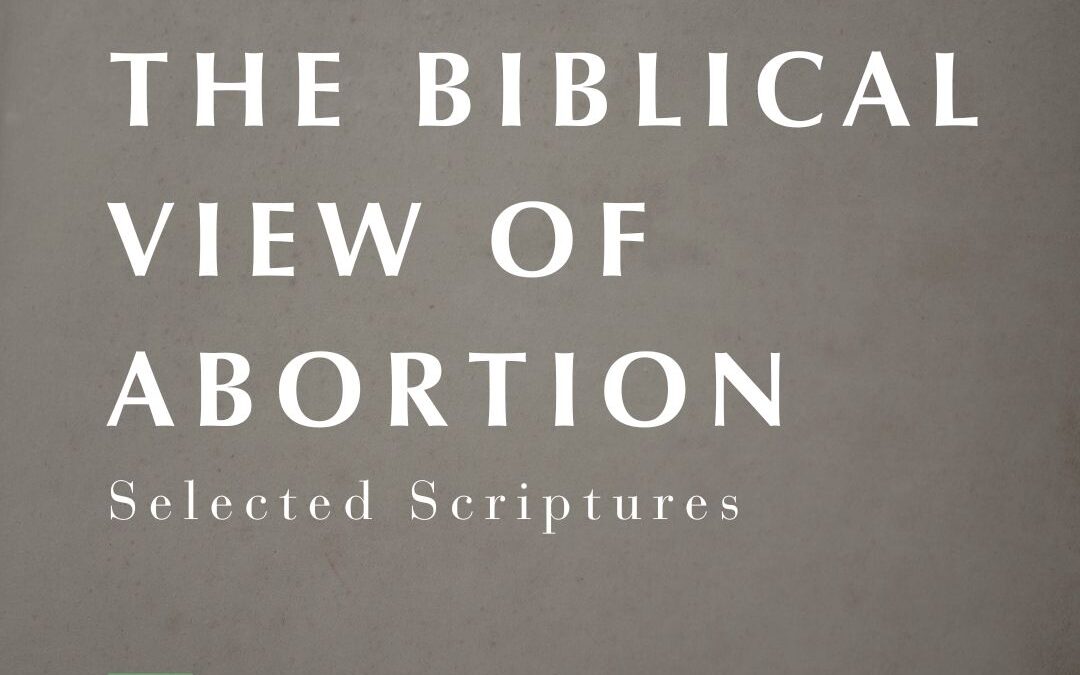
by Melinda Savoy | Jul 30, 2024 | The Biblical View of Abortion
Although abortion is a horrible sin, it is not unforgivable. The gospel of Jesus Christ offers forgiveness of sins and salvation for all those who repent and believe in Him.

by Melinda Savoy | Jul 31, 2024 | The Biblical View of Abortion
There are several methods that doctors and medical staff use to facilitate an abortion. But behind such wicked acts is Satan himself, who was a murderer from the beginning. He is the one who is ultimately behind the abortion movement.

by Melinda Savoy | Aug 1, 2024 | The Biblical View of Abortion
There are many flawed arguments that pro-choice and pro-abortionists use to advocate for their position.

by Melinda Savoy | Aug 2, 2024 | The Biblical View of Abortion
There are several biblical arguments against abortion that all Christians need to fully understand. Because believers live in a culture that overwhelmingly supports abortion, we must know how to respond from the word of God.
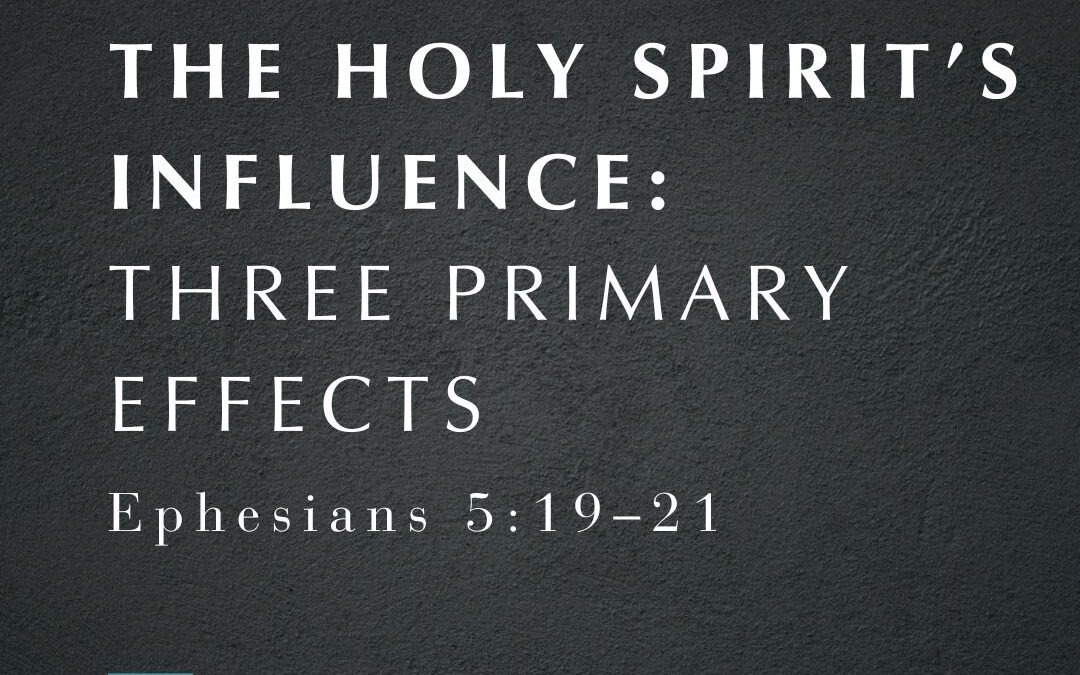
by Melinda Savoy | Aug 5, 2024 | The Holy Spirit's Influence: Three Primary Effects
Do you love God-centered music? Do you find yourself singing praises to God privately and corporately? If you are truly under the influence of the Spirit, singing will play a major role in your life.

by Melinda Savoy | Aug 6, 2024 | The Holy Spirit's Influence: Three Primary Effects
The greatest example of worship is found in the person of the Lord Jesus Christ, who made singing and worshiping a priority during His life.

by Melinda Savoy | Aug 7, 2024 | The Holy Spirit's Influence: Three Primary Effects
Why did God create music? One of the chief purposes of music in the church is to teach one another spiritual truth and admonish one another to obey the truth.

by Melinda Savoy | Aug 8, 2024 | The Holy Spirit's Influence: Three Primary Effects
If you don’t have a love for God-centered, Christ-centered, cross-centered music, then, according to Paul, you are not under the influence of the Spirit and the Word.

by Melinda Savoy | Aug 9, 2024 | The Holy Spirit's Influence: Three Primary Effects
Scripture teaches that both our voices and musical instruments should be used for music in the Christian life.

by Melinda Savoy | Aug 12, 2024 | The Holy Spirit's Influence: Three Primary Effects
When worshiping in music, Christians must whole-heartedly participate with enthusiasm and energy. However, worship shouldn’t be merely external but internal, with genuineness and sincerity.

by Melinda Savoy | Aug 13, 2024 | The Holy Spirit's Influence: Three Primary Effects
Ingratitude is a terrible sin against God. Therefore, Christians must live a life of thanksgiving towards Him.

by Melinda Savoy | Aug 14, 2024 | The Holy Spirit's Influence: Three Primary Effects
A heart of thankfulness towards God can only come as a by-product of a redeemed life in Christ. Unless our hearts are changed by Christ, we will always be grumblers and complainers.

by Melinda Savoy | Aug 15, 2024 | The Holy Spirit's Influence: Three Primary Effects
Evidence of the Holy Spirit’s work in the life of a believer is shown by submission to God and His Word.

by Melinda Savoy | Aug 16, 2024 | The Holy Spirit's Influence: Three Primary Effects
A Christian must demonstrate a life of obedience to God for the glory of God.

by Melinda Savoy | Aug 19, 2024 | Real Christians and Deep Fakes
The three tests of assurance of salvation in 1 John are obedience to Jesus Christ and His Word, love for God and His people, and faith in the biblical Jesus and the biblical gospel. In this series, we are focusing on obedience to Christ and His Word.

by Melinda Savoy | Aug 20, 2024 | Real Christians and Deep Fakes
Does God really hear the prayers of His people and respond? In 1 John 5, the apostle John makes it clear that God hears the prayers of His followers and gladly responds with joy. In context, John is describing God’s people praying for the salvation of an unbeliever, that they would repent of their sins and believe in the biblical Jesus and the biblical gospel.

by Melinda Savoy | Aug 21, 2024 | Real Christians and Deep Fakes
In 1 John 5, the apostle John acknowledges that there are some people who have attached themselves to Christ and the church and yet are not truly saved; they truly aren’t part of God’s family. John wants to help believers know whether they are saved, so he explains what Christianity is in comparison to the deep fakes Satan himself has created.

by Melinda Savoy | Aug 22, 2024 | Real Christians and Deep Fakes
First John 5 says that true Christians have a new and better relationship with sin. In other words, Christians no longer love sin like they did before coming to saving faith in Christ. But rather, they hate it and want to mortify it at all costs. And true Christians also have a new Father—no longer the devil, the father of lies—but God the Father, who sent His Son to die on the cross for sins.

by Melinda Savoy | Aug 23, 2024 | Real Christians and Deep Fakes
The beauty of the gospel is that sinners who turn from their sin and confess Jesus Christ as Savior and Lord will be saved. But the true Christian understands that salvation is not of himself but only because of the person and work of Jesus Christ. In other words, authentic Christians understand what Jesus taught and accomplished in His life, death, and resurrection—which is revealed in the Scripture, the true Word of God.

by Melinda Savoy | Aug 26, 2024 | Real Christians and Deep Fakes
The message of the Christian faith is exclusive, which means that salvation can only come through the biblical Jesus and the biblical gospel. Unfortunately, many people are influenced by our postmodern culture, which teaches that there are many ways to heaven. But the Bible says there is only one way to heaven—through Jesus Christ as revealed in the gospels.

by Melinda Savoy | Aug 27, 2024 | Antichrist
During the seven-year tribulation period, Revelation 13 describes how Satan will raise up and empower a profoundly evil human ruler as a false messiah, one who will rule and receive the worship of the entire world. Friend, do you know what the Bible teaches about Antichrist—and why does it even matter?

by Melinda Savoy | Aug 28, 2024 | Antichrist
The book of Revelation describes the future seven-year tribulation period prior to the coming of our Lord Jesus Christ. But in Revelation chapter 13, we get a description of the Antichrist, the coming false messiah who is described as the most powerful, cruel, and cunning dictator the world has ever seen. And as we’ll discover together from God’s Word, Antichrist is fueled by Satan, the arch enemy of God.

by Melinda Savoy | Aug 29, 2024 | Antichrist
In the book of Revelation, the apostle John describes how Satan will raise up and empower a profoundly evil human ruler known as Antichrist. Next to Jesus Christ, this will be the most famous person in the history of the world…and he will have a profound effect on many. But is such a powerful person outside the sovereign control of God?

by Melinda Savoy | Aug 30, 2024 | Antichrist
The most famous evil ruler in Scripture is Antichrist. During the seven-year tribulation period, he will try to build his own kingdom and expand his empire across the entire world. Unfortunately for this evil ruler, his time and power are limited by the one true God.

by Melinda Savoy | Sep 2, 2024 | Just By Faith Alone
In the book of Romans, Paul makes a logical argument for and presents his legal defense of the doctrine of justification. In Philippians, he gives his personal testimony of justification and shows how this doctrine came to fruition in his own life. He contrasts his previous confidence in his own works-based righteousness with the gospel and the righteousness he received as a gift from God through Christ.

by Melinda Savoy | Sep 3, 2024 | Just By Faith Alone
While the apostle Paul in Romans makes a logical argument for and presents his legal defense of the doctrine of justification, it’s in Philippians where he gives his own personal testimony and shows how this precious doctrine came to fruition in his own life.

by Melinda Savoy | Sep 4, 2024 | Just By Faith Alone
Prior to his conversion, the apostle Paul’s total confidence of salvation before God rested in what he had inherited—and the things he’d done and accomplished. But once his eyes were opened by the truth of the gospel, Paul understood his only hope was to depend on the Lord Jesus Christ for His righteousness.

by Melinda Savoy | Sep 5, 2024 | Just By Faith Alone
In Philippians 3, the apostle Paul describes the value he had come to place on his own accomplishments—he calls them rubbish. It’s the most polite Greek word for excrement. Put in graphic terms, the word illustrates just how worthless Paul considered his own righteousness was for salvation.

by Melinda Savoy | Sep 6, 2024 | Just By Faith Alone
The philosophies and false religions of our day teach that man is inherently good and that he can save himself, or as some may think, has no need of saving! Such thinking, however, is contrary to what the Bible teaches. In Philippians 3, the apostle Paul freely acknowledges he could not earn a right standing or a verdict of “righteous” before a holy God based on anything he had done.

by Melinda Savoy | Sep 9, 2024 | Just By Faith Alone
According to Scripture, if your reliance is on your merit, background, societal class, achievements, efforts, or even religious things like baptism and communion, you’ll never be in right standing before God. How then, you might ask, can anyone be saved?

by Melinda Savoy | Sep 10, 2024 | Just By Faith Alone
God’s Word teaches that Justification is always accompanied by dramatic change. But what kind of change? In Acts 9, the apostle Paul experienced a divine encounter with the Lord Jesus Christ. This left Paul with a radical change in his thinking—specifically, that all his works and merits would never grant him salvation before a holy God.

by Melinda Savoy | Sep 11, 2024 | Just By Faith Alone
For the apostle Paul, he lost his lifestyle. He lost his home and friends. He lost his family, associations, property, possessions, inheritance, and his reputation. For Paul, coming to Christ indeed meant losing everything.

by Melinda Savoy | Sep 12, 2024 | Just By Faith Alone
The Bible teaches that God is Holy, and His law is absolute perfection. While the kind and degree of everyone’s sin may be different, our standing and status before God is exactly the same—we are dead in our trespasses and sins and are guilty before Him, deserving only His wrath and condemnation.

by Melinda Savoy | Sep 13, 2024 | Just By Faith Alone
The Bible teaches that every sin you have ever committed carries with it enough guilt to deserve God’s eternal wrath and judgment. This is true for every single person that has ever lived, with Jesus Christ Himself being the only exception. But why is that? Well according to the Scripture, Christ lived a perfect life without sin.

by Melinda Savoy | Sep 16, 2024 | Just By Faith Alone
How do you know if you have truly been saved—truly been justified before God? While some traditions teach that man can never know for sure, the apostle Paul in Philippians 3 instructs us that a mark of a born-again Christian is one whose life is characterized by a love for and a willingness to obey Jesus Christ.

by Melinda Savoy | Sep 17, 2024 | Just By Faith Alone
The biblical doctrine of justification, that man is declared righteous before God by faith alone in Christ alone, is a foundational doctrine of the Christian faith. As we’ve learned so far in the series, this great doctrine is always accompanied by a dramatic life change in the one who believes in Jesus.

by Melinda Savoy | Sep 18, 2024 | Sin Is Not Your Master
if you’re a follower of Jesus Christ, do you hate your sin and seek to flee from it? Or do you love and embrace it? According to the apostle Paul in Romans 6, every Christian—without exception—has a new relationship to sin. But what does that relationship look like?

by Melinda Savoy | Sep 19, 2024 | Sin Is Not Your Master
In Romans 6, the apostle Paul makes clear that all Christians have died to sin; that is, at the moment of your salvation, you died to sin and are no longer bound to it—you are no longer a slave to it.

by Melinda Savoy | Sep 20, 2024 | Sin Is Not Your Master
In Romans 6, the apostle Paul is not teaching that Christians will no longer sin in this life or even that Christians won’t struggle with sin. But rather, true Christians, those who have repented of their sin and trusted in Christ, are no longer enslaved to sin and willingly continue to practice it or to live in such an unrepentant pattern of it.

by Melinda Savoy | Sep 23, 2024 | Sin Is Not Your Master
If you are a true Christian, the pursuit of holiness ought to mark and characterize your life. According to Romans 6, part of the pursuit of holiness is to understand that sin no longer has reign and dominion over you. In fact, the apostle Paul makes clear that if you have believed in Jesus Christ, sin is no longer the master of your life; it no longer rules your life.

by Melinda Savoy | Sep 24, 2024 | Sin Is Not Your Master

by Melinda Savoy | Sep 25, 2024 | Sin Is Not Your Master
According to the apostle Paul, the historical reality of Christ’s death and resurrection is directly connected to the believer’s new life in Christ. Just as Christ died and was buried, so too the Christian also experienced death—death to sin.

by Melinda Savoy | Sep 26, 2024 | Sin Is Not Your Master
God’s word in Romans chapter 6 makes a clear case that all unbelievers are slaves to their own sin—and on their own, they are unable to break free from its chains and shackles. In fact, no one or no thing can break them free, apart from Jesus Christ and His gospel.

by Melinda Savoy | Sep 27, 2024 | Sin Is Not Your Master
The Scripture teaches that we as Christians can have assurance of salvation based on our new relationship and view of sin. Do you hate your sin and seek to flee from its influence at all costs? Or, do you love it and find ways to delight in it?

by Melinda Savoy | Sep 30, 2024 | Sin Is Not Your Master
In Romans 6, the apostle Paul makes clear that genuine believers are those who not only claim the name of Christ but also despise and hate their sin. As Paul writes in the opening to Romans 6, “What shall we say then? Are we to continue in sin so that grace may increase? May it never be! How shall we who died to sin still live in it?”

by Melinda Savoy | Oct 1, 2024 | Sin Is Not Your Master
According to the apostle Paul in Romans 6, it’s impossible. In fact, Paul’s whole point in the paragraph we’ve been studying together in this series is this: The dominion of sin; the slavery that we, as Christians, once experienced to sin, was permanently broken at the moment of salvation.

by Melinda Savoy | Oct 2, 2024 | Sin Is Not Your Master
The apostle Paul writes in Romans 6:11, “Even so, consider yourselves to be dead to sin, but alive to God in Christ Jesus.” What does that mean exactly? Sadly, there is much confusion and bad interpretations exist regarding Paul’s words.

by Melinda Savoy | Oct 3, 2024 | Sin Is Not Your Master
If you are in Christ, you have been forgiven of all sin—past, present and future. The power of sin in your life has been broken by the work of the Lord Jesus Christ—you aren’t a slave to sin! But rather, you can turn from sin and grow in holiness and Christlikeness.

by Melinda Savoy | Oct 4, 2024 | Sin Is Not Your Master
What is the biblical definition for sanctification, and why does it matter in the Christian life? Sadly, there are many professing Christians who misunderstand this great doctrine. Why is that, exactly? Pastor Tom will show in our study today, sanctification is absolutely crucial for the Christian life.

by Melinda Savoy | Oct 7, 2024 | Sin Is Not Your Master
Do you partake in sinful activities that are forbidden in Scripture? The Bible teaches that the only remedy for both sinful desires and actions is the gospel of Jesus Christ. In fact, it is only through Christ that any sinner can be saved and redeemed from their slavery to sin.

by Melinda Savoy | Oct 8, 2024 | Sin Is Not Your Master
In Romans 6, the apostle Paul writes these words: “Do not go on presenting the members of your body to sin as instruments of unrighteousness.” Paul is saying that Christians are never to nurse their sin but to flee from it at all costs. Christian, how do you view sin?

by Melinda Savoy | Oct 9, 2024 | Sin Is Not Your Master
In Romans 6, Paul states that we, as Christians, have a new relationship to sin. We are dead to it and alive in Christ. Friend, have you examined your own heart and asked yourself whether you prefer sin or the Lord Jesus Christ?

by Melinda Savoy | Oct 10, 2024 | The Millennium: Christ's Future Reign on Earth
Pre-millennialism teaches that at the end of a future, 7-year Tribulation, Christ will return in the Second Coming just before He establishes a literal 1000-year reign on this earth that He renews and restores.

by Melinda Savoy | Oct 11, 2024 | The Millennium: Christ's Future Reign on Earth
According to Scripture, there are actually three different resurrections that will transpire. For us, as Christians, we need to understand these resurrections, because they have been revealed in Scripture and because they will help us understand the final events of human history—culminating in the return of the Lord Jesus Christ and the establishment of His kingdom

by Melinda Savoy | Oct 14, 2024 | The Millennium: Christ's Future Reign on Earth
The book of Revelation describes that after Jesus’ second coming to the earth, He will renew the earth and establish a literal world-wide kingdom, where He will reign and rule with His people for a thousand years. His return is indeed the glorious hope, but why is the teaching on a literal Millennial reign so controversial?

by Melinda Savoy | Oct 15, 2024 | The Millennium: Christ's Future Reign on Earth
Pastor Tom builds a case for pre-millennialism and argues that it is the best understanding of one of the most difficult chapters in all of Scripture. As Bereans, we must always ask ourselves: What does the Bible Say? So, it is important that we, as Christians, listen to the biblical arguments and let God’s Word be the final authority

by Melinda Savoy | Oct 16, 2024 | The Millennium: Christ's Future Reign on Earth
Tom Pennington considers several features that will mark the future 1,000-year period in which Christ will reign on this earth. As Tom will show us, it’s during that time when our Lord Jesus Christ will renew planet Earth, restoring it in such a way that it will resemble the pre-cursed world that Genesis chapters 1–2 describe!

by Melinda Savoy | Oct 17, 2024 | The Millennium: Christ's Future Reign on Earth
As Christians, we can be confident that Christ is seated on His throne—and that nothing will be able to usurp or remove Him from His rightful position of power.

by Melinda Savoy | Oct 18, 2024 | A Friend of Sinners
Early in Christ’s public ministry, the religious leaders of the day began antagonizing and criticizing his ministry—and eventually they developed murderous thoughts and actions towards him. One of the primary reasons their anger began to increase and express itself was because Jesus chose to interact with sinners and tax collectors.

by Melinda Savoy | Oct 21, 2024 | A Friend of Sinners
Mark 2 demonstrates that no one has out-sinned the saving work of Jesus Christ. In fact, Jesus’ primary mission on earth was to save wretched sinners from the shame, guilt, and condemnation of the penalty their sin deserves.

by Melinda Savoy | Oct 22, 2024 | A Friend of Sinners
After having an encounter with Jesus, Matthew came to terms with his sins, repented of them, and trusted in the Lord Jesus Christ for forgiveness and salvation. As this marvelous story unfolds in Mark 2, it provides a blueprint for Jesus’ mission to the world: to save sinners from their iniquities, transgressions, and sins.

by Melinda Savoy | Oct 23, 2024 | A Friend of Sinners
The God-Man—Jesus Christ—perfectly obeyed God’s law in all points and never sinned once. This key truth is why Jesus alone can truly save people from their sins

by Melinda Savoy | Oct 24, 2024 | The Parable of the Two Builders
The gospel of Matthew is one of the four New Testament gospels that presents the good news of Jesus Christ—that salvation is of grace alone, through faith alone, in Christ alone, to the glory of God alone. And Matthew does this by explaining that Jesus of Nazareth is the promised Messiah of the Hebrew Scripture—and our divine Savior & King.

by Melinda Savoy | Oct 25, 2024 | The Parable of the Two Builders
A common misconception about Christianity is that, at its core, it is rooted in blind faith. But in reality, the Bible teaches that true Scriptural faith is rooted in three great realities: knowledge of the truth, mental assent to the truth, and an authentic trust or confidence in that truth.

by Melinda Savoy | Oct 28, 2024 | The Parable of the Two Builders
In Matthew 7, Jesus describes the danger of making a false profession of faith in Jesus Christ—one that isn’t truly genuine. He describes this person as the foolish builder, one who is ultimately a false disciple. But He also describes the wise builder, who is found to be a true Christian.

by Melinda Savoy | Oct 29, 2024 | The Parable of the Two Builders
At the end of the Sermon on the Mount, our Lord Jesus Christ speaks about the reality of deception, specifically that it’s possible to profess Jesus as Savior and Lord and not be truly saved.

by Melinda Savoy | Oct 30, 2024 | Five Hallmarks of a Biblical Church
As leaders in Christ’s church, we don’t get to establish our own guiding principles. But rather, we must do exactly what Christ commands. In this series, we will discover several hallmarks that Scripture defines are essentially to be a biblical church.

by Melinda Savoy | Oct 31, 2024 | Five Hallmarks of a Biblical Church
It’s common today for churches to profess a high view of God but completely disregard His clear commands for Christ’s church. On today’s program, Tom Pennington demonstrates from Scripture that all biblical churches must have a high view of God—and their philosophy of ministry must flow from that commitment.

by Melinda Savoy | Nov 1, 2024 | Five Hallmarks of a Biblical Church
Many professing Christians and the local churches they attend proclaim that Scripture is their ultimate authority—but deny it in practice. For a church to be a biblical church, they must affirm that the Bible is God-breathed, it is sufficient, and that it speaks authoritatively for all of life, including how churches should conduct themselves.

by Melinda Savoy | Nov 4, 2024 | Five Hallmarks of a Biblical Church
In order for a church to be both biblical and spiritually healthy, it’s essential they have a high view of God’s Word. In other words, they must treat the Bible with the utmost respect as they would God Himself.

by Melinda Savoy | Nov 5, 2024 | Five Hallmarks of a Biblical Church
A biblical church understands and embraces what the Bible teaches about man: his nature, problems, and their solutions. While the culture continues to understand man through psychology and other philosophies, we, as Christians, must be committed to what the Bible says about man.

by Melinda Savoy | Nov 6, 2024 | Five Hallmarks of a Biblical Church
A biblical understanding of man puts into perspective man’s condition before a holy God: He is a wretched sinner, one who has rebelled and sinned against a holy God and is thus unable to save himself.

by Melinda Savoy | Nov 7, 2024 | Five Hallmarks of a Biblical Church
In today’s message, we come to the fourth hallmark, and it’s that a biblical church must intentionally structure church life to reflect what the Bible teaches.
by Melinda Savoy | Nov 8, 2024 | Five Hallmarks of a Biblical Church
According to the New Testament, it starts by regularly coming together for corporate worship on the Lord’s day, as well as regularly observing the ordinances of believer’s baptism and the Lord’s table, two ordinances that Scripture commands faithful churches to administer.

by Melinda Savoy | Nov 11, 2024 | Five Hallmarks of a Biblical Church
A church that does not hold to the biblical Jesus and the biblical gospel is not a true church. In today’s message, Pastor Tom explains why the gospel of Jesus Christ is one of the hallmarks of a biblical church.

by Melinda Savoy | Nov 12, 2024 | Five Hallmarks of a Biblical Church
Unfortunately, many churches have abandoned the core tenets of the Christian faith, and consequently, they have wholesale abandoned the gospel. But for us, as Christians, not only must we boldly proclaim and hold fast to good news of Jesus Christ, we must attend churches that embrace and proclaim the same message.
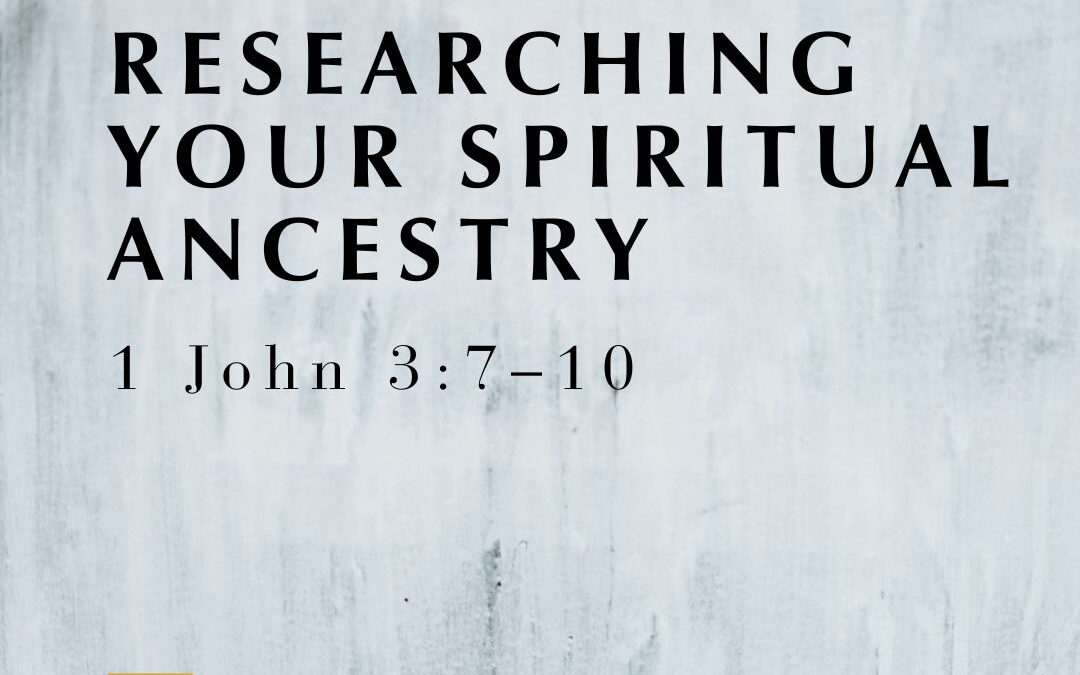
by Melinda Savoy | Nov 13, 2024 | Researching Your Spiritual Ancestry
In 1 John 3, John gives a test to his readers so that they may have assurance of salvation—the test of obedience to Jesus Christ and His Word. John says that you can know whether or not you have eternal life based on your obedience to Jesus Christ.

by Melinda Savoy | Nov 14, 2024 | Researching Your Spiritual Ancestry
According to the New Testament, habitually practicing sin proves that you are what Scripture calls a child of the devil—perpetually sinning, just as he does. On the other hand, habitually practicing righteousness, according to Jesus Christ and His Word, demonstrates your true spiritual ancestry: that you are a child of God.

by Melinda Savoy | Nov 15, 2024 | Researching Your Spiritual Ancestry
In these verses, John helps his readers identify their spiritual ancestry in no uncertain terms: If someone does not consistently practice righteousness, they are not part of the family of God. John goes on to say that if you do not love one another, you’re not part of the family of God.

by Melinda Savoy | Nov 18, 2024 | Researching Your Spiritual Ancestry
The apostle John wrote 1 John to real, authentic Christians who believed in the biblical Jesus and the biblical gospel. They continued to obey Christ and His Word and to love other believers. John wrote to give them the hope and assurance of eternal life.

by Melinda Savoy | Nov 19, 2024 | Principles of Effective Leadership
Scripture teaches that effective biblical leadership in the church can be reduced to three key principles. First, and most importantly, we must follow Christ’s plan for church leadership as it is described in Ephesians 4.

by Melinda Savoy | Nov 20, 2024 | Principles of Effective Leadership
According to Matthew’s gospel and the words of our Lord Jesus Christ, to be the right kind of leader in Christ’s church, you have to make five key commitments.

by Melinda Savoy | Nov 21, 2024 | Principles of Effective Leadership
All church leaders must be committed to exercising the right kind of leadership. Pastor Tom takes an in-depth examination of Acts 6 and the apostles leadership skills to show what leadership in Christ’s church is to look like.

by Melinda Savoy | Nov 22, 2024 | Principles of Effective Leadership
In Acts 6, the apostles of Jesus Christ undeniably functioned as qualified, biblical leaders. Through them, we as Christians learn how to model and apply their pattern. Pastor Tom explains from Acts 6 several practical lessons about exercising the right kind of leadership in Christ’s church.

by Melinda Savoy | Nov 25, 2024 | Forget None of His Benefits!
Psalm 103 gives us a divine record of how to offer praise and thanksgiving to our God. King David’s words outline for us how we can come to the throne of grace and give God thanks. Everything within us, all of the passion within us, our entire being, should be aimed at praising God.

by Melinda Savoy | Nov 26, 2024 | Forget None of His Benefits!
In this psalm, King David prompts believers to recognize the character of God and to respond in praise and adoration. At the same time, David desires that believers show extreme gratitude and thanksgiving that they’ve experienced in God’s kindness.

by Melinda Savoy | Nov 27, 2024 | Forget None of His Benefits!
This psalm and all of Scripture teach that God’s goodness is inherently who He is. God’s goodness isn’t part of who He is—it is who He is! And because of this unchanging reality, God expresses His goodness towards His people as a reflection of His character.

by Melinda Savoy | Nov 28, 2024 | Forget None of His Benefits!
Because of God’s grace, believers can be completely forgiven of all their sins through the work of Jesus Christ. This reality is the heart of the gospel message—that people cannot save themselves but must put their faith in Jesus Christ.

by Melinda Savoy | Nov 29, 2024 | The Divine Pattern of Confession
In this powerful psalm, King David teaches us that we are to confess our sin and to earnestly seek God’s forgiveness. As believers, we are to appeal to God’s character—that He is willing to forgive iniquity, transgression, and sin.

by Melinda Savoy | Dec 2, 2024 | The Divine Pattern of Confession
According to Psalm 51, God’s people are marked by coming to the throne of grace in repentance, knowing that God is faithful and just to forgive us our sins.

by Melinda Savoy | Dec 3, 2024 | This Is Love
In the verses we are studying together in this series, John focuses on the test of loving God and loving His people. And if you love God and His people according to Scripture, you will have assurance of your salvation in Christ Jesus.

by Melinda Savoy | Dec 4, 2024 | This Is Love
According to 1 John, those actions are the marks of someone who has not trusted in Jesus Christ for forgiveness of sins and salvation from the wrath to come. By way of comparison, the true Christian is someone who has a growing affection and love for God and His people. Not perfection, but direction, with overall consistency.

by Melinda Savoy | Dec 5, 2024 | This Is Love
According to the Scriptures, God demonstrated His love to His people by sending His Son into the world to die on the cross and then to rise from the dead three days later. In response to this amazing act of love, every true follower of Jesus Christ is called to sacrificially give up their life in the pursuit of loving God and loving His people.

by Melinda Savoy | Dec 6, 2024 | This Is Love
Pastor Tom Pennington gives several practical applications from a proper understanding of how God demonstrated His love for His people by sending Christ Jesus into the world to save sinners.

by Melinda Savoy | Dec 9, 2024 | This Is Love
According to the New Testament, the Spirit is given to every believer at the moment of salvation. But the Spirit’s ministry doesn’t end there. In fact, 1 John 4 teaches that the Holy Spirit continues to play a vital role in the ongoing life of the believer.

by Melinda Savoy | Dec 10, 2024 | This Is Love
The heart of the gospel is that God sent His only Son into the world to live a perfect life and to die on a Roman cross—not for His own sins, but for all of those people who would believe in Him. Friend, do you believe that message? According to 1 John 4, it is the work of the Holy Spirit that applies that great truth to us, as Christians!
by Melinda Savoy | Dec 11, 2024 | This Is Love
The Holy Spirit uses the Word of God to make believers more and more like Jesus Christ. And what fuels this sanctification process in the mind and heart of the believer is a right understanding of God’s love for us, as Christians.
by Melinda Savoy | Dec 12, 2024 | This Is Love
We’ve been studying together in this series that true Christians are marked in one way by a deep and abiding love for God and His people. Pastor Tom has helped us understand this key reality by walking us through 1 John 4:7–21. Tom compels believers to take seriously the sanctification process—that we, as Christians, must mortify our sin and obey God’s Word.

by Melinda Savoy | Dec 13, 2024 | This Is Love
First John is intended to help true believers gain personal assurance of their salvation. So, John provides his readers with several tests to help determine their spiritual condition. In the verses we are studying together in this series, John focuses on the test of loving God and loving His people. Pastor Tom highlights the Holy Spirit’s role as it relates to God’s love for us.

by Melinda Savoy | Dec 16, 2024 | This Is Love
Like the apostle John, do you genuinely love God and God’s people? Tom Pennington calls every believer to examine their heart, to test themselves, in order to confirm whether one is truly in the faith.

by Melinda Savoy | Dec 17, 2024 | A Savior Is Born!
Luke describes Jesus as the Son of Man who came into this world to seek and save those who are lost. In the series, we see the beginning of that journey with the miraculous conception and birth of our Lord Jesus Christ.

by Melinda Savoy | Dec 18, 2024 | A Savior Is Born!
According to Luke chapter 2, not only is Jesus Christ fully God, but He is also fully man. Theologians call this reality the hypostatic union, that Jesus Christ is one person with two natures: He is truly God, and truly man. And the Bible gives two responses to that amazing truth: You must accept His claims and repent of your sins and entrust your faith in Him for salvation, or you can reject His words and spend eternity apart from Him.

by Melinda Savoy | Dec 19, 2024 | A Savior Is Born!
Luke chapter 2 powerfully demonstrates that Jesus Christ is qualified to be the Messiah—one of the pieces of evidence that proves this reality is that Christ was born from the right line into the right family.

by Melinda Savoy | Dec 20, 2024 | A Savior Is Born!
At first glance, Jesus’ royal birth seems unremarkable, in that he lay in a stone feed trough inside a cave, there in the small town Bethlehem. But as we’ll discover, God used these humble circumstances to fulfill Old Testament prophecies, and to teach His people several great spiritual lessons.

by Melinda Savoy | Dec 23, 2024 | A Savior Is Born!
In Luke 2, several remarkable details are recorded about the divine birth announcement of God’s Son, Jesus Christ. But along with the extraordinarily profound birth announcement was a very unlikely audience. But why are they an important part of the story?

by Melinda Savoy | Dec 24, 2024 | A Savior Is Born!
From Luke 2, Pastor Tom considers how Jesus Christ is the only one who can rescue or save you from your sins. The fact is, You can’t rescue yourself—no one can. And whatever circumstances you find yourself in, in the end, you are not capable of being a savior. God alone is the only Savior.

by Melinda Savoy | Dec 25, 2024 | A Savior Is Born!
If Jesus is both fully God and fully man, every person must recognize His claims and respond accordingly. You must repent of your sins and confess Him as your Lord—and if you do, He will save you from the penalty of sin and transfer you into His Kingdom.

by Melinda Savoy | Dec 26, 2024 | A Savior Is Born!
For us who have trusted in Christ, we are compelled to proclaim what makes the Christmas season so special: that a Savior has come! And He has purchased salvation on the cross, and He will one day return from heaven to bring His people to Himself.

by Melinda Savoy | Dec 27, 2024 | He Will Hold Me Fast
For us as Christians, this doctrine assures us that we were once justified, are currently being sanctified, that is, transformed to the image of Christ, and will one day be glorified with Christ and His people in the new heaven and earth. Nothing can take away those realities from those who truly know Christ.

by Melinda Savoy | Dec 30, 2024 | He Will Hold Me Fast
The apostle Paul teaches from Romans 8 that God has displayed the magnitude of His love by giving His Son to die for the sins of all of those who would believe in Him. And because God has done that, there is no accusation that anyone or anything can bring that would annul what God has done for us as Christians through Jesus Christ.

by Melinda Savoy | Dec 31, 2024 | He Will Hold Me Fast
Is there any entity that can separate, in any way, the believer’s relationship with God through Jesus Christ? The wonderful answer to that question comes directly from Scripture. In Romans 8, the apostle Paul explains how the true believer’s faith can never be destroyed.

by Melinda Savoy | Jan 1, 2025 | He Will Hold Me Fast
According to the apostle Paul, the Lord Jesus Christ preserves and protects all His people from ever forfeiting true salvation. You, believer, can rest assured and be confident that nothing will annul what God has done through the person and work of Jesus Christ.

by Melinda Savoy | Jan 2, 2025 | He Will Hold Me Fast
Is it possible for a believer’s justification before God to be threatened? Romans 8 teaches that we, as Christians, are overwhelmingly conquerors through Jesus Christ our Lord. And because of this profound reality and the greatness of God’s love, the righteous declaration from God’s courtroom will never truly be threatened by anything in this created world.

by Melinda Savoy | Jan 3, 2025 | He Will Hold Me Fast
In Romans 8 the apostle Paul teaches that one or no thing in this created world is able to destroy the salvation of a true believer. And if that’s you, friend, be encouraged: Our great God will hold you fast for all of eternity.

by Melinda Savoy | Jan 6, 2025 | The Armor of God
The apostle Paul wanted the Ephesian Christians, and he wants us today to understand that we are in a war. As Christians, we have to understand we are in this war until the day we die or until our Lord returns. Other passages of Scripture tell us we are in a war against our flesh, our unredeemed humanness. But in Ephesians 6, Paul makes clear that our war is also against hostile demonic forces.

by Melinda Savoy | Jan 7, 2025 | The Armor of God
For us as Christians, our knowledge and understanding of the truth—guided and illumined by the Spirit of God—are the very means by which we are sanctified. And the more we become like Christ, the better we are able to ward off Satan’s attacks.

by Melinda Savoy | Jan 8, 2025 | The Armor of God
The Christian life is one of battle, in the sense that every Christian, every day, faces a powerful enemy. An adversary, one that Scripture calls the devil, or Satan. But God’s people haven’t been left in the dark on how to fight against him.

by Melinda Savoy | Jan 9, 2025 | The Armor of God
The Apostle Paul in Ephesians 6 instructs every believer to equip themselves with the armor of God. As it pertains to the breastplate of righteousness, believers are to daily apply several truths related to the great doctrine of justification by grace alone through faith alone in Christ alone.

by Melinda Savoy | Jan 10, 2025 | The Armor of God
In the Apostle Paul’s letter to the Ephesians where he makes clear that we, as Christians, face a powerful enemy—Satan—who seeks to steal, kill, and destroy all God’s people. And since he is too powerful for us to handle alone, Christ has given us spiritual armor to help us withstand the enemy’s relentless attacks.

by Melinda Savoy | Jan 13, 2025 | The Armor of God
If you have repented of your sin and believed in Christ, you are at peace with God. So no matter the trials or temptations that you will inevitably face in this life, God is using those things for your good and His glory.

by Melinda Savoy | Jan 14, 2025 | The Armor of God
If we, as God’s people, are to fight against the evil one and to keep our minds pure, we must put on spiritual armor, including the shield of faith.

by Melinda Savoy | Jan 15, 2025 | The Armor of God
In the ancient world, Roman soldiers used a shield to protect themselves from the enemy’s arrows. At the same time, Roman soldiers would often interlock their shields for greater protection. For the Christian, we have been given a spiritual shield, the shield of faith, to protect us from the constant onslaught of the enemy.

by Melinda Savoy | Jan 16, 2025 | The Armor of God
As soldiers of Jesus Christ, we, as believers, are to use a spiritual helmet that is intended to protect our heads—that is, our minds. According to the apostle Paul, this piece of armor is to be used to preserve and protect our minds against the attacks of Satan and his demons.

by Melinda Savoy | Jan 17, 2025 | The Armor of God
If we, as the Lord’s people, are going to be protected from Satan’s constant attacks against us, we have to be reminded of the importance of protecting our minds, and the helmet of salvation does that.

by Melinda Savoy | Jan 20, 2025 | The Armor of God
The whole of Scripture, as well as the arc of human history, shows us that God’s enemy, Satan, will do everything possible to oppose God and God’s people. This is because of his hatred for God and those whom God has redeemed through Jesus Christ. But God hasn’t left his people defenseless. He knows His people need spiritual armor to defend themselves.

by Melinda Savoy | Jan 21, 2025 | The Armor of God
Scripture records that Satan himself personally tempted Jesus—but every time, Jesus responded with Scripture, the “sword” of the Spirit. If Jesus Christ used Scripture in His battle against Satan, how much more do we need to know, understand, and apply the Bible to battle against Satan?

by Melinda Savoy | Jan 22, 2025 | The End of Time
The book of Daniel was written to demonstrate the sovereignty of God over human history, that is, that God is on His throne. He has a plan. He’s still working out that plan, and He is in complete control of it.

by Melinda Savoy | Jan 23, 2025 | The End of Time
According to Daniel 12, all people, whether unbelievers or believers, will be raised from the dead on the last day, and be given a resurrected body fit for eternity—with God, or apart from Him.

by Melinda Savoy | Jan 24, 2025 | The End of Time
In the book of Daniel, God, through the prophet Daniel, records several details about the future for the hope and encouragement of God’s people. Pastor Tom explains the final details of the end of all days, and compels Christians to trust God and his sovereignty over human history and the great rulers of the world.

by Melinda Savoy | Jan 27, 2025 | The End of Time
According to Daniel 12, judgment is coming for all of those who do not trust in Jesus Christ alone for salvation. But Daniel 12 also teaches that we as believers have the blessed and assured hope of eternal life, solely because of what the Lord Jesus Christ accomplished on the cross.

by Melinda Savoy | Jan 28, 2025 | Bridge Over Troubled Water
The book of James is a collection of teachings and wisdom that He learned from Jesus Christ and pours out to us in this letter. And as we study James 1:2–12 together, he teaches that the troubles of life are God’s tools to refine our character and to produce in us true Christian maturity.

by Melinda Savoy | Jan 29, 2025 | Bridge Over Troubled Water
According to James 1, God uses trials to bring His people to full maturity in Christ. And as believers, we can either complain about our current circumstances or we can trust that God intends to use them for His purposes—and our ultimate good.

by Melinda Savoy | Jan 30, 2025 | Bridge Over Troubled Water
God allows Christians to endure trials and tribulations to produce in them true, godly wisdom. And in God’s providence, He knows that trials uniquely work to this effect. So, rather than wasting a trial, James teaches that believers must embrace and use trials for the purpose of gaining wisdom.

by Melinda Savoy | Jan 31, 2025 | Bridge Over Troubled Water
In our study of James 1, Pastor Tom continues to show us from God’s Word that trials serve a key role in transforming the believer to be more like Christ. Trials also put believers in situations where crying out to God is required. And according to James, when believers pray to God, He delights in responding and helping His people.

by Melinda Savoy | Feb 3, 2025 | Bridge Over Troubled Water
According to James 1, we are to wisely act in those situations but our higher and greater focus must be on the fact that we are children of God. James doesn’t minimize trials and tribulations but rather teaches that believers must never lose sight of the fact that our heavenly Father is with us at all times, even the difficult ones.

by Melinda Savoy | Feb 4, 2025 | Bridge Over Troubled Water
Trials also provide an environment to grow in wisdom and grace. And, in the end, “[believers]” will receive the crown of life, which the Lord has promised to those who love Him. Friend, continue to press on in the Lord Jesus Christ.

by Melinda Savoy | Feb 5, 2025 | The Shepherd of Your Soul
In Isaiah 53, we discover that we, like sheep, have all gone astray. But our God and Savior has provided a way—through the Suffering Servant—for us to be saved from His wrath to come.

by Melinda Savoy | Feb 6, 2025 | The Shepherd of Your Soul
According to Isaiah 53, the only way of salvation is through the Suffering Servant, the Lord Jesus Christ. As Pastor Tom preaches from Isaiah 53, He identifies the heart of God: that He loves to rescue sinners, and was willing to send His Only Begotten Son into the world to do so.

by Melinda Savoy | Feb 7, 2025 | Hard Call: When the Bible Is Silent
All of the Christian life consists of making choices and decisions, no matter the age or time period in which you live. Decision-making is part of life; it is unavoidable. And it is accurate to say that the Bible doesn’t explicitly deal with every issue or choice you have to make. Either Scripture doesn’t mention it at all or perhaps Scripture isn’t entirely definitive in what it does mention. But God’s Word does equip us to make biblical, God-honoring decisions in those cases.

by Melinda Savoy | Feb 10, 2025 | Hard Call: When the Bible Is Silent
Every Christian during every age has faced making daily decisions about issues and topics that the Bible either doesn’t mention at all, or that, if it does, are not entirely definitive. These issues have been known as “Christian liberties.”

by Melinda Savoy | Feb 11, 2025 | Hard Call: When the Bible Is Silent
So far in Pastor Tom’s series, we’ve considered together the fact that we, as Christians, should expect legitimate differences on issues where the Bible either doesn’t mention at all or it doesn’t address specifically. Those issues have been called “issues of conscience.” These differences were certainly true of the apostle Paul and the church in Rome in the first century—that is why Paul wrote this portion of Romans.

by Melinda Savoy | Feb 12, 2025 | Hard Call: When the Bible Is Silent
In Paul’s letter to the Romans, he emphasizes that those decisions shouldn’t be divisive or detrimental. In other words, our Christian liberty choices should reflect first the glory of God and the gospel. If Christ, through His life, death, and resurrection, was willing to accept us into His family, shouldn’t we who are Christians do the same by accepting other Christians?

by Melinda Savoy | Feb 13, 2025 | Hard Call: When the Bible Is Silent
In the first century, there were two primary issues on which there was huge disagreement in the churches: the first was eating unclean foods, and the second was observing the Jewish holy days that are listed in the Old Testament. As the apostle Paul sought to shepherd those Christians in those churches, he laid out several biblical principles to help their decision-making in those situations.

by Melinda Savoy | Feb 14, 2025 | Hard Call: When the Bible Is Silent
Every generation of Christians faces decisions about issues and topics the Bible either doesn’t mention at all or that, if it does, are not entirely definitive. As we’ve learned so far, God, through the writing of the apostle Paul, provides Christians with several principles to navigate those situations.

by Melinda Savoy | Feb 17, 2025 | Hard Call: When the Bible Is Silent
All of Scripture teaches that every moral decision that every Christian will ever make can be divided into one of three categories. First, the Bible explicitly commands it, and there is a chapter and verse to support it. Second, the Bible explicitly forbids it, and there is a chapter and verse that forbids it. Or third, it’s an issue of conscience, or Christian liberty, where there is no specific verse that commands or forbids it.

by Melinda Savoy | Feb 18, 2025 | Hard Call: When the Bible Is Silent
In every age, Christians will have to navigate making decisions about issues and topics that the Bible doesn’t mention at all or is not entirely definitive. This was a major challenge for first-century Christians and one of the reasons the apostle Paul wrote the great letter to the Romans.

by Melinda Savoy | Feb 19, 2025 | Marriage and Family by God's Design
As Christians, we must reject that of the world and only embrace God’s view of marriage and family revealed in His eternal, authoritative Word.

by Melinda Savoy | Feb 20, 2025 | Marriage and Family by God's Design
Moses, the human author of Genesis, writes under the inspiration of the Holy Spirit about the biblical foundation of marriage. Not only does Genesis record the first marriage between Adam and Eve, it also lays down the fundamental biblical convictions about every marriage—including your marriage.

by Melinda Savoy | Feb 21, 2025 | Marriage and Family by God's Design
According to Genesis 2, God teaches that marriage deserves the highest priority because of the unique covental relationship that is formed between man and woman. The Bible teaches that marriage is to be superior to all other relationships.

by Melinda Savoy | Feb 24, 2025 | Marriage and Family by God's Design
Pastor Tom continues to walk through Genesis 2, the foundational passage that defines and describes a marriage that honors God. Many practical truths can be gleaned from such a rich passage of Scripture. And if you want your marriage to honor God and if you want your marriage to be preserved during the highs and lows of life, you must know God’s Word and then apply it to your life.

by Melinda Savoy | Feb 25, 2025 | Marriage and Family by God's Design
Unfortunately, marriage, and particularly the wife’s role in marriage, is under attack from the unbelieving world. In fact, the attacks have reached such a degree that some teach marriage is a means for men to control women. But such teaching doesn’t represent what the Bible says.

by Melinda Savoy | Feb 26, 2025 | Marriage and Family by God's Design
The Bible teaches that God has designed and defined marriage. In addition, God’s Word lays out clear roles in marriage—for both the husband and wife. So although man and woman have equal status as image-bearers of God, they have differing roles they’ve been assigned.

by Melinda Savoy | Feb 27, 2025 | Marriage and Family by God's Design
Genesis 2 isn’t the only passage that defines marriage and the specific roles that God has assigned to husbands and wives. In the New Testament, the apostle Paul takes up this issue in Ephesians 5 and Titus 2 to further explain God’s view of marriage and how Christians should respond.

by Melinda Savoy | Feb 28, 2025 | Marriage and Family by God's Design
According to Paul’s letter to Titus, there are several key duties of a godly Christian wife that a biblical family must embrace and actively seek to implement. Marriage is designed for the glory of God—and how we conduct ourselves in marriage matters.

by Melinda Savoy | Mar 3, 2025 | Marriage and Family by God's Design
In Ephesians 5, the apostle Paul makes clear what a godly husband is to know and do—and God requires that He pursue those realities with all his heart.

by Melinda Savoy | Mar 4, 2025 | Marriage and Family by God's Design
As men are called by God to be the head of their homes and to lead their wives, they must embrace what the apostle Paul teaches in Ephesians 5: They men are to love their wives sacrificially—like Christ loved the church. And they are to love their wives in a sanctifying manner—leading them in their pursuit of holiness.

by Melinda Savoy | Mar 5, 2025 | Marriage and Family by God's Design
In many Christian homes today, the wife ends up being the spiritual leader by default because husbands don’t reflect the biblical mandate outlined in Scripture. In Genesis 2 and Ephesians 5, the authors of Scripture describe that husbands are assigned by God the role of headship and leadership.

by Melinda Savoy | Mar 6, 2025 | Marriage and Family by God's Design
At its heart, marriage isn’t ultimately about the husband or wife. God did, in His goodness, give you a spouse for each other’s encouragement and edification and much more. But marriage is primarily a picture of the Lord Jesus Christ and His bride, the church.

by Melinda Savoy | Mar 7, 2025 | Marriage and Family by God's Design
In Ephesians 4, the apostle Paul teaches that communication is vital for the health and longevity of marriage. Pastor Tom explains the kind of speech that must characterize your conversation with your spouse as you interact with each other on a daily basis.

by Melinda Savoy | Mar 10, 2025 | Marriage and Family by God's Design
As Christians, our speech must be marked by wholesome words that honor our great God. In our marriages, we must seek never to let unwholesome words come out of our mouth, but only those that are in accordance with grace.

by Melinda Savoy | Mar 11, 2025 | Marriage and Family by God's Design
For us, as Christians, communication is to be used to edify and build up one another as well as honor and bless God. And the same is true for marriages and families. Christian communication is characterized by choosing gracious words but also by using words that are always truthful and honest.

by Melinda Savoy | Mar 12, 2025 | Marriage and Family by God's Design
In Ephesians 4, Paul encourages Christians to use sound speech in marriage and to flee from language that isn’t gracious and edifying.

by Melinda Savoy | Mar 13, 2025 | Marriage and Family by God's Design
For every one of us, conflict is an unavoidable reality—there is no way of fully escaping it. As Christians, we have a new nature, but we still live in our flesh—our unredeemed humanness. Therefore, we sometimes communicate and respond in our marriages in ways that are sinful. Thankfully, the apostle Paul has given us Ephesians 4 to help believers become better communicators in marriage.

by Melinda Savoy | Mar 14, 2025 | Marriage and Family by God's Design
In Ephesians 4, the apostle Paul makes a case that all Christians, particularly those in a marriage covenant, must communicate in a way that honors God and edifies one another. But the sinful flesh makes communication in marriage challenging at times. So it is crucial not only to understand the biblical teaching on communication but to apply it.

by Melinda Savoy | Mar 17, 2025 | Marriage and Family by God's Design
The apostle Paul’s teaching in Ephesians 6 argues that the primary goal of every marriage and family is that they be God-centered and God-focused. In other words, the aim and ambition of every family is the glory of God.

by Melinda Savoy | Mar 18, 2025 | Marriage and Family by God's Design

by Melinda Savoy | Mar 19, 2025 | In the Shadow of the Almighty
Yahweh, the true and living God, protects the one who trusts in Him through the dangers of this life and ushers him into eternal glory. At its heart, this psalm is a celebration, a celebration of the believer’s absolute security even in the middle of danger.

by Melinda Savoy | Mar 20, 2025 | In the Shadow of the Almighty
Psalm 91’s vertical dimension reminds us that it is God alone—not our own strength, not our circumstances—who keeps believers secure through every trial and season, never forsaking them, always faithful.

by Melinda Savoy | Mar 21, 2025 | A Sacred Trust
In 2 Timothy 2, the apostle Paul urges Timothy not only to treasure the truth of Scripture and the gospel of Jesus Christ, but to carefully pass it on to the next generation of disciples. Pastor Tom challenges us to embrace this wonderful calling.

by Melinda Savoy | Mar 24, 2025 | A Sacred Trust
The truth revealed in God’s Word is a sacred trust—a treasure to be vigilantly protected and faithfully passed to those who come after us. Pastor Tom encourages us to proclaim this treasure of sound doctrine to the next generation of believers.

by Melinda Savoy | Mar 25, 2025 | Not From Around Here
Because of our belief in Jesus Christ and the good news of the gospel, we have become citizens of heaven. Practically, this simply means that we have entered into partnership, into a spiritual fellowship with God’s people. We have become members of a new community—what the New Testament calls the “church.” And, as Christians, Paul calls us to live in light of that wonderful reality.

by Melinda Savoy | Mar 26, 2025 | Not From Around Here
Believers have earthly citizenship based on where they reside and a heavenly citizenship based on the person and work of Jesus Christ. But a heavenly citizenship comes with key responsibilities—one of which states that we must strive together for the sake and faith of the gospel. In other words, as Christians, we must actively defend and proclaim the gospel of Jesus Christ.

by Melinda Savoy | Mar 27, 2025 | Not From Around Here
Christians have entered into a partnership, a spiritual fellowship with the Creator of the universe as adopted, beloved children. God becomes not just our Lord, but our Father. And it’s in Philippians where the apostle Paul stresses that we are to live worthy of this heavenly citizenship and calling. Our lives should reflect the values, priorities, and character of the kingdom we now represent.

by Melinda Savoy | Mar 28, 2025 | Not From Around Here
In Philippians 1, Paul reminds the church at Philippi that there are consequences that come from belonging to Jesus Christ and His heavenly kingdom. For us as Christians, Paul reminds us that we are in good company when we suffer for Jesus’ sake: We have stood for the gospel along with the apostles and the first century church, as well as with Christians in church history.

by Melinda Savoy | Mar 31, 2025 | Look in the Mirror!
There is not one single Christian to whom this passage does not apply. If you claim to be a believer in Jesus Christ, then James 1 is speaking directly to you. The message of verses 19–27 can be summarized this way: Our response to the Word of God diagnoses our true spiritual condition.

by Melinda Savoy | Apr 1, 2025 | Look in the Mirror!
The Word of God is able to sanctify believers, to make us more like our Lord and Savior, Jesus Christ. Perhaps most importantly, Scripture serves as the ultimate spiritual diagnostic tool. Like a mirror held up to your heart, it reveals whether your faith stands genuine and unshakable or merely superficial and unstable.

by Melinda Savoy | Apr 2, 2025 | Look in the Mirror!
How do you approach God’s Word in your daily life? Unfortunately, even as faithful Christians, we can develop flawed perspectives on Scripture if we aren’t vigilant and intentional in how we handle it. These misguided approaches can subtly infiltrate our personal study, our homes, and yes—even our church communities.

by Melinda Savoy | Apr 3, 2025 | Look in the Mirror!
James 1 teaches that there is no clearer test of the reality of your relationship to the Triune God than your response to the Word of God—the Scripture. James says you must have a teachable heart; you must respond to the Bible with obedience; and you must not only be a hearer of the word but a doer.

by Melinda Savoy | Apr 4, 2025 | Look in the Mirror!
In James 1, the apostle James identifies three essential qualities that should characterize every believer’s relationship with Scripture. These aren’t merely suggestions—they’re spiritual vital signs.

by Melinda Savoy | Apr 7, 2025 | Look in the Mirror!
Regular Bible reading and meditation are essential to Christian growth. In his epistle, the Lord’s half brother, James, challenges both his original readers and us today to treasure Scripture and commit to understanding and living it out.

by Melinda Savoy | Apr 8, 2025 | Look in the Mirror!
Do you profess to know Jesus Christ, but in reality, are a self-deceived religious person? That’s a real danger that affects many professing Christians today. But according to James 1, the true Christian bears fruit in keeping with repentance and has a sincere dedication to reading and studying the Word of God.

by Melinda Savoy | Apr 9, 2025 | Look in the Mirror!
For those who have truly surrendered their hearts to Christ—who have genuinely repented of their sins and embraced Him as Savior—there’s a remarkable transformation that takes place. Your speech begins to stand out in sharp contrast to the conversations swirling through our culture.

by Melinda Savoy | Apr 10, 2025 | Where Do You Stand?
Everything God intended for us to know about Himself, His works, and our relationship to Him is recorded in Scripture. Therefore, the Bible is the authority on everything that involves God’s interaction with His people. What we know about God and how we commune with Him can only be derived from what has been written in Scripture.

by Melinda Savoy | Apr 11, 2025 | Where Do You Stand?
God’s Word stands as our ultimate authority in every aspect of life and faith. Proverbs 3 reminds us that when we acknowledge our Triune God in everything we do, He guides our paths with loving providence.

by Melinda Savoy | Apr 14, 2025 | How Should We Then Live?
What will Christians do in the new heaven and earth? In Revelation 22, the apostle John considers that future time period and encourages believers today to live in light of that reality.

by Melinda Savoy | Apr 15, 2025 | How Should We Then Live?
The Apostle John doesn’t merely record visions of what is to come: he invites us into an eternal throne room, where Christ is exalted above all creation—worthy of our deepest worship, our highest praise, and our complete surrender.

by Melinda Savoy | Apr 16, 2025 | How Should We Then Live?
According to Revelation 22, the apostle John exhorts all Christians to not only believe the doctrine of the Trinity but to worship God as a result. This crucial doctrine is foundational to the Christian faith—and as Pastor Tom will show us today, we as believers must regularly worship God because of His nature and to live faithfully and obediently in light of that glorious truth.

by Melinda Savoy | Apr 17, 2025 | How Should We Then Live?
The book of Revelation confronts us with a powerful truth: complacency has no place in the life of a believer. As the final chapters of God’s redemptive story unfold before our eyes, we’re called not to passive waiting, but to active preparation. John’s urgent message in Revelation 22 is clear—repent and believe in the One who is coming soon.

by Melinda Savoy | Apr 18, 2025 | How Should We Then Live?
For those who’ve placed their faith in Christ, your debt is already paid in full. You’ll stand uncondemned, justified, and receive God’s gracious rewards. These eternal realities demand our attention, as Revelation 22 clearly demonstrates.

by Melinda Savoy | Apr 21, 2025 | How Should We Then Live?
The apostle John warns that those who cling to sin and reject the one true God will face Him not as Savior, but as Judge. This sobering truth is why Revelation 22 urgently calls every professing believer to examine the authenticity of their faith before that final day arrives.

by Melinda Savoy | Apr 22, 2025 | How Should We Then Live?
As believers, we’re summoned to more than casual acknowledgment—we’re called to complete submission to Scripture’s authority. Yet John’s warning carries a sobering edge: we must neither add to God’s revealed Word nor subtract from its sacred truth.

by Melinda Savoy | Apr 23, 2025 | How Should We Then Live?
Revelation 22 makes clear that Scripture is authoritative and that we, as Christians, must embrace and submit to its authority. But why is that? Because the Scripture is the product of God’s breath; in other words, because God has all authority, His written words come with the same authority.

by Melinda Savoy | Apr 24, 2025 | How Should We Then Live?
For those of us who call ourselves believers, the path forward is clear—we must fix our gaze on Christ and His abundant grace as we seek to serve Him faithfully and be transformed into His glorious likeness.

by Melinda Savoy | Apr 25, 2025 | How Should We Then Live?
Today we bring you a special question-and-answer recording from Pastor Tom Pennington regarding his book, “”The Biblical View of Abortion: God’s Heart for Life in the Womb.”” By deciding to make man in His own image, God Himself established the value of human life (Gen. 1:27). That sovereign, immutable decision makes abortion one of the greatest moral and ethical issues of our time. For the Christian, the only question about abortion that matters is: “What does the Bible say?

by Melinda Savoy | Apr 28, 2025 | The House that God Builds
This psalm addresses God’s sovereignty and providence as it relates to individual families and how God is directly involved in building and growing them. For us, as God’s people, this psalm is a powerful reminder that children are a gift from the Lord and that our families are to be centered on and used for the glory of God.

by Melinda Savoy | Apr 29, 2025 | The House that God Builds
The Bible teaches that all parents will give an account to God for how they viewed and trained their kids. As Christians, we have a responsibility before the Lord to be faithful stewards with the children that He has entrusted us with. And we do so by understanding what the Bible says about parenting and then implementing such truths in the lives of our family.
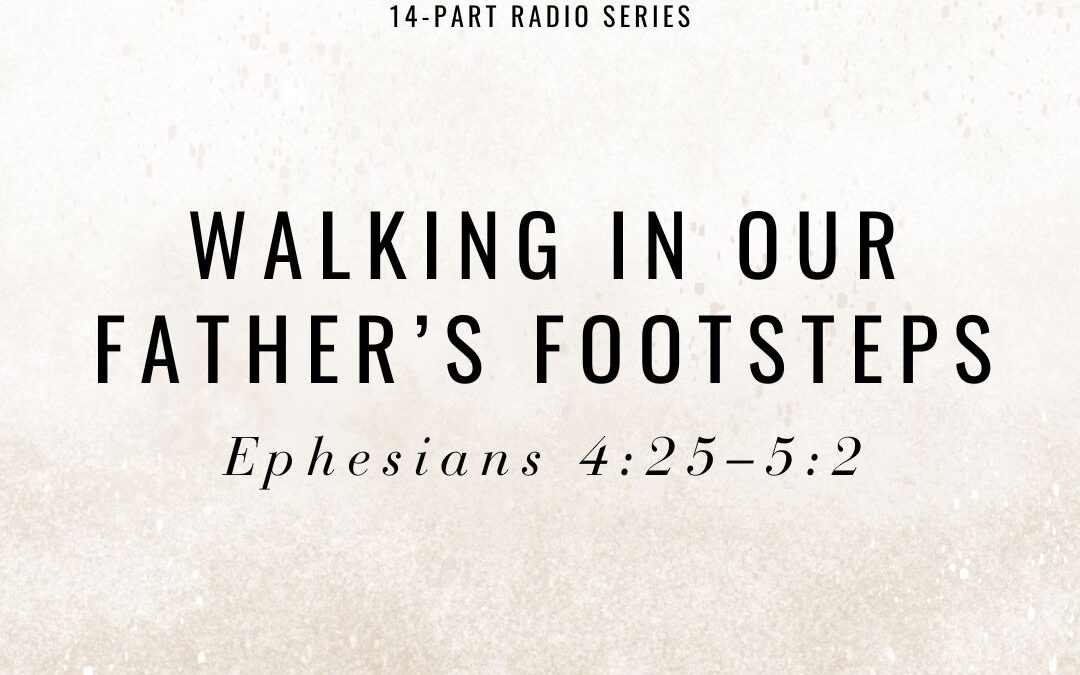
by Melinda Savoy | Apr 30, 2025 | Walking in Our Father's Footsteps
In the verses we’ll be studying together in this series, Paul provides 5 practical examples to show how true change happens. The point is, as new creations in Christ, we are to imitate our heavenly Father, who saved us from the wrath to come.

by Melinda Savoy | May 1, 2025 | Walking in Our Father's Footsteps
The apostle Paul cuts straight to the heart of our identity as believers: We must mirror their heavenly Father by embracing both truth in living, and truth in speaking. This isn’t optional. This isn’t situational. This is who we are called to be—a people who flee from falsehood and set our hearts completely on what is true.

by Melinda Savoy | May 2, 2025 | Walking in Our Father's Footsteps
In Ephesians 4, the apostle Paul unfolds a truth that transforms lives—we as believers are called to walk the very path God Himself would walk. Pastor Tom explains how disciples of Jesus Christ must deliberately cast off every form of sinful anger and put on its opposite trait. This isn’t merely about controlling our tempers—it’s about becoming more and more like our heavenly Father.

by Melinda Savoy | May 5, 2025 | Walking in Our Father's Footsteps
In Ephesians 4, the apostle Paul confronts this universal human struggle with divine wisdom. On today’s program, Pastor Tom illuminates this crucial passage, unveiling not just the spiritual danger of unchecked anger, but offering practical, biblical guidelines.

by Melinda Savoy | May 6, 2025 | Walking in Our Father's Footsteps
In Ephesians 4, the apostle Paul doesn’t merely suggest, but compels believers to follow in the Father’s footsteps. He calls us to embody love as our Father does—not as an abstract concept, but through tangible transformation of character. And turning from sin isn’t enough—we must actively embrace its opposite virtue.

by Melinda Savoy | May 7, 2025 | Walking in Our Father's Footsteps
The timeless wisdom of Ephesians 4 illuminates a fundamental truth: every material blessing flows from God’s sovereign hand. Nothing comes to us by mere chance or solely through our own efforts. This perspective transforms how we view ownership. As followers of Christ, we’re called to a higher standard—to honor the property rights of others with unwavering integrity while stewarding our own resources with wisdom and gratitude.

by Melinda Savoy | May 8, 2025 | Walking in Our Father's Footsteps
In Ephesians 4, the apostle Paul offers us profound wisdom—practical truths about respecting the property of others, working diligently with our own hands, and honoring God even in how we use what we’ve been given.

by Melinda Savoy | May 9, 2025 | Walking in Our Father's Footsteps
As followers of Christ, we’re called to honor God – not only in how we live, but also in how we provide for others and share with those in need. Today, Pastor Tom unpacks this text and challenges us to respond to Paul’s exhortation with integrity and purpose.

by Melinda Savoy | May 12, 2025 | Walking in Our Father's Footsteps
Let me ask you—do you ever struggle with communication? Maybe you find yourself making sinful or unwise choices in how you speak to others? As Christians, we’re called to something higher. The apostle Paul, in Ephesians 4, urges us to put off the old ways and embrace a new, biblical approach to communication.

by Melinda Savoy | May 13, 2025 | Walking in Our Father's Footsteps
How can you imitate God in your daily life? What does it look like to reflect His character in the way you live and interact with others? The apostle Paul gives us a powerful answer in Ephesians 4. He reminds us as Christians never to let corrupt or harmful words flow from our mouths. Instead, we’re called to speak what is good—wholesome words, ones that build up, encourage, and edify others.

by Melinda Savoy | May 14, 2025 | Walking in Our Father's Footsteps
In Ephesians 4, the apostle Paul reminds us that our words matter—they reveal the condition of our hearts and can either honor God or lead us into sin. Paul challenges us to put aside corrupt communication and instead speak words that build up, encourage, and minister grace to those around us.

by Melinda Savoy | May 15, 2025 | Walking in Our Father's Footsteps
As Christians, imitating God is at the heart of our faith—it’s a non-negotiable part of who we are. But what does that look like in everyday life? How do we walk in our Father’s footsteps? One crucial way is through forgiveness. In Ephesians 4, the apostle Paul reminds us that showing forgiveness is a powerful way to reflect God’s character.

by Melinda Savoy | May 16, 2025 | Walking in Our Father's Footsteps
In Ephesians 4–5, the apostle Paul emphasizes the importance of imitation in the Christian life—particularly imitating God. This isn’t just about mimicking actions; it’s about reflecting God’s character in every aspect of our lives.

by Melinda Savoy | May 19, 2025 | Walking in Our Father's Footsteps
Paul’s teaching in Ephesians challenges us to live differently—truthfully, not lying; peacefully, not harboring sinful anger; diligently, not stealing; graciously, not tearing others down; and kindly, not holding on to bitterness.

by Melinda Savoy | May 20, 2025 | Misinterpreting Common Grace
As we’ll discover together in this series, the Jews knew Scripture and even condemned the sin of others. But they themselves were under God’s judgment because they had a flawed view of God’s common grace.

by Melinda Savoy | May 21, 2025 | Misinterpreting Common Grace
Where can we spot God’s common grace in our world? The Bible shows us it’s everywhere—in the warmth of human connection, the satisfaction of a meal, the golden glow of sunrise, gentle rain refreshing the earth—countless daily gifts we often take for granted. But why such generosity? Because goodness is in God’s very nature.

by Melinda Savoy | May 22, 2025 | Misinterpreting Common Grace
When we fail to properly value God’s common grace, we begin to assume we’ve somehow earned these blessings—that they’re owed to us by divine obligation or personal merit. The humbling truth? This grace is entirely undeserved—flowing solely from God’s boundless generosity toward His creation.

by Melinda Savoy | May 23, 2025 | Misinterpreting Common Grace
Romans 2 teaches that all people—those who reject Christ and those who have believed upon Christ—experience the goodness of God in what is called “common grace.” But as you’ve learned so far in the series, God’s common grace must never be treated lightly.

by Melinda Savoy | May 26, 2025 | False Claims and Empty Rituals
In Romans 2, the apostle Paul teaches that the Jews were confident that they themselves were assured of eternal life because of one primary religious ritual: circumcision. Their basic problem was that their confidence of salvation, that they were right with God, was in external religion.

by Melinda Savoy | May 27, 2025 | False Claims and Empty Rituals
With unflinching clarity, Paul reveals that religious efforts—however sincere, however ancient—can never form the foundation of anyone’s salvation. The only hope rests solely in the person and work of Jesus Christ—His perfect life and His sacrificial death in the place of all who would believe.

by Melinda Savoy | May 28, 2025 | False Claims and Empty Rituals
Romans 2 teaches that no ritual-no outward act-can ever bring us salvation. But rather, salvation comes only through the blood of the Lord Jesus Christ. It’s not about what we do for God, but what He has already done for us in His life, death, and resurrection. That’s the good news of the gospel. And that’s the message of grace.

by Melinda Savoy | May 29, 2025 | False Claims and Empty Rituals
The apostle Paul makes clear that every person has transgressed God’s perfect law and that no religious act or spiritual accomplishment can deal with such lawbreaking before a holy God. Our only hope to be right with God is Jesus Christ—the eternal Son of God that assumed human flesh to die a substitutionary death for sinners.

by Melinda Savoy | May 30, 2025 | False Claims and Empty Rituals
The Bible lays out only two possible paths to being right with God. The first is justification by works-trying to earn God’s favor through your own efforts and merits. But Scripture is clear: that path is impossible. No one can make themselves right with God by their own deeds. The second path is justification by faith in Christ-trusting not in what you can do, but in what Jesus Christ has already done.

by Melinda Savoy | Jun 2, 2025 | False Claims and Empty Rituals
Jesus Christ came into this world to save sinners—by His perfect life, His sacrificial death on the cross, and His glorious resurrection. Salvation isn’t found in any claim, tradition, or ritual. Rather, it is found in Christ alone.

by Melinda Savoy | Jun 3, 2025 | Crucified with Christ!
In the first century, the Judaizers taught that salvation came by faith in Christ and works of righteousness. But such teaching is contrary to the true gospel which Paul sets out to defend in his important letter to the Galatians.

by Melinda Savoy | Jun 4, 2025 | Crucified with Christ!
All religions except for true Christianity teach that salvation is accomplished by one’s own works and achievements. But the true gospel of Jesus Christ as revealed in the Bible teaches that salvation can only be obtained by grace alone through faith alone in Christ alone.

by Melinda Savoy | Jun 5, 2025 | Messiah's Messenger
The gospel of Matthew can be summarized this way: Jesus of Nazareth is the promised Messiah of the Hebrew Scripture, the divine Savior and King. Matthew 3 is unique because it fulfills an Old Testament prophecy that describes a specific person that would come to Israel to prepare the way for the Messiah.

by Melinda Savoy | Jun 6, 2025 | Messiah's Messenger
In the sun-scorched wilderness of first-century Judea, a solitary voice echoed across the Jordan Valley—John the Baptist—divinely appointed to prepare hearts for the footsteps of the coming King.

by Melinda Savoy | Jun 9, 2025 | Messiah's Messenger
Centuries before Jesus walked the shores of Galilee, the ancient prophets foretold of such a herald—a divine messenger who would prepare Israel. The gospel of Matthews tells us who that herald is: John the Baptist

by Melinda Savoy | Jun 10, 2025 | Messiah's Messenger
The wilderness voice still speaks through the pages of Scripture. John the Baptist—the prophesied forerunner of Jesus Christ. His message? Unmistakable. Repentance of sin, followed by baptism in water.

by Melinda Savoy | Jun 11, 2025 | Messiah's Messenger
John the Baptist, the one who prepared the way for Christ, made it clear: true repentance is essential for salvation. But what does that look like in our daily lives? Today, Pastor Tom will help us recognize the signs of true versus false repentance.

by Melinda Savoy | Jun 12, 2025 | Messiah's Messenger
Pastor Tom Pennington describes the dangers of false repentance—a repentance that’s only skin-deep, focused on appearances and self-reliance, instead of true faith in God and real transformation.

by Melinda Savoy | Jun 13, 2025 | Messiah's Messenger
On today’s program, Pastor Tom will unpacks Matthew 3:11–12, urging each of us to examine our hearts, repent of our sins, and place our trust in Jesus Christ alone for salvation.

by Melinda Savoy | Jun 16, 2025 | Messiah's Messenger
Pastor Tom follows in the footsteps of John the Baptist, calling each of us to examine which path we’re on in this life. He urges us to turn to Jesus Christ, to trust Him fully, and to experience the life-changing power of true repentance and faith.

by Melinda Savoy | Jun 17, 2025 | The Fig Tree & the Temple: Two Unforgettable Object Lessons
Jesus gives two crucial object lessons that define and describe the corrupt worship that permeated Jerusalem, specifically the supposed religious leaders of the day and their abuse of the Temple grounds. But Jesus’ message is clear: God hates hypocritical worship—and all who come to Him must come in spirit and in truth.

by Melinda Savoy | Jun 18, 2025 | The Fig Tree & the Temple: Two Unforgettable Object Lessons
In the first century, Jesus made something crystal clear: empty, hypocritical worship is never accepted by God. That kind of worship defined first-century Israel. But for us as Christians today, we must have the courage to examine our own worship and ask the hard question: Is what I’m offering God truly acceptable to Him?

by Melinda Savoy | Jun 19, 2025 | The Fig Tree & the Temple: Two Unforgettable Object Lessons
The gospels record that Jesus Christ cleansed the temple at both the beginning of His ministry and at the end. But although both accounts are well-known stories of Jesus’ life, many people don’t understand the “why” behind the events and for what purpose. Today, Pastor Tom explains why Jesus acted this way.

by Melinda Savoy | Jun 20, 2025 | The Fig Tree & the Temple: Two Unforgettable Object Lessons
From Genesis to Revelation, Scripture makes this crystal clear: God rejects worship that’s all show and no substance. The entire Bible bears witness to this truth. So when we gather for worship on Sunday mornings, what we do truly matters.

by Melinda Savoy | Jun 23, 2025 | A High View of God
A high view of God recognizes who God is as He is revealed in Scripture and responds to that knowledge with worship. I pray this series will encourage us to know God better and to then worship Him.

by Melinda Savoy | Jun 24, 2025 | A High View of God
It is vital that every Christian study the being and character of God, specifically the magnificent doctrine of divine providence. When you understand God’s providence, you’ll never see your circumstances the same way again.

by Melinda Savoy | Jun 25, 2025 | A High View of God
Pastor Tom compels us as Christians to embrace a high view of God, specifically through the doctrine of salvation. When you truly grasp God’s sovereignty in your rescue, worship becomes inevitable.

by Melinda Savoy | Jun 26, 2025 | A High View of God
As Psalm 24:1 reminds us: “The earth is the Lord’s, and all it contains, the world, and those who dwell in it.” He rules over all creation. He governs the salvation of sinners. He alone deserves our highest praise.

by Melinda Savoy | Jun 27, 2025 | A High View of Scripture
Jesus demanded that people place themselves under the Scripture’s authority. He daily read from the Scripture and expected others to read it. Jesus also memorized Scripture and used it against temptation. He regularly studied the Scripture. And of course, He perfectly obeyed it.
by Melinda Savoy | Jun 30, 2025 | A High View of Scripture
Scripture alone is breathed out by God. Scripture alone is profitable in all times and places. And Scripture alone is sufficient and authoritative in all things. Four qualities. One foundation.

by Melinda Savoy | Jul 1, 2025 | A High View of Scripture
Do you worship God according to Scripture? The Bible reveals how God is to be worshiped—and we as Christians must only worship God in ways He has prescribed in His Word.

by Melinda Savoy | Jul 2, 2025 | A High View of Scripture
Are you committed to a church where God’s Word is central? Do you daily read, study, and meditate on Scripture? As Christians, we must determine whether we truly have a high view of Scripture.

by Melinda Savoy | Jul 3, 2025 | The Eternal City
It is key to remember that this current earth is not our home—we are simply passing through. The New Jerusalem will be our eternal home. And Christ promised that those who repent and believe in Him and those who persevere to the end will live in this eternal city with Him forever.

by Melinda Savoy | Jul 4, 2025 | The Eternal City
Recorded in Revelation 21 and 22 is a breathtaking vision of the New Jerusalem—our eternal home. These glimpses of the future don’t just comfort us about tomorrow—they transform how we live today.

by Melinda Savoy | Jul 7, 2025 | The Eternal City
Belief in Jesus Christ brings complete justification before God, total forgiveness of sins, and guaranteed access to the eternal city described in Revelation 21–22. This isn’t just distant comfort—it’s a present reality that changes everything.

by Melinda Savoy | Jul 8, 2025 | The Eternal City
What does the Bible say about the eternal city—the one described so beautifully in Revelation chapters 21 and 22? Beyond all the blessings, there’s one that stands above them all: God’s people being in the very presence of the Lord Jesus Christ.

by Melinda Savoy | Jul 9, 2025 | The Eternal City
The Bible calls every believer to make God’s glory their highest goal, their chief aim in life. But did you know that this isn’t just our calling here on earth? Scripture tells us that the great aim of heaven itself is the glory of God. On today’s program, Pastor Tom will guide us through Revelation chapters 21 and 22, revealing how, in the new heaven and the new earth, we as believers will continue to bring glory to God—forever.

by Melinda Savoy | Jul 10, 2025 | The Eternal City
What will our bodies be like in the eternal city? Not just physically, but morally as well? And why should it matter for us today? The book of Revelation, specifically chapters 21–22, answers these vital questions.

by Melinda Savoy | Jul 11, 2025 | Lies Christians Believe
We live in a culture that teaches truth is relative; that is, there are no universal, general truth claims in the world. And such a worldview not only dominates the age in which we live but sadly has increasingly affected the church. As Christians, we must reject such thinking and embrace the only standard of truth recorded in Scripture.

by Melinda Savoy | Jul 14, 2025 | Lies Christians Believe
It is crucial for Christians never to reject the truth of Scripture. But what happens if we abandon truth? Pastor Tom explains that the consequences reach far beyond personal faith. When truth becomes optional, everything else becomes negotiable.

by Melinda Savoy | Jul 15, 2025 | Lies Christians Believe
The Bible assumes and teaches that there is objective, universal, eternal, and propositional truth, and that you and I can know for certain what it is. Today, Pastor Tom continues to unpack the Scripture about what the truth is.

by Melinda Savoy | Jul 16, 2025 | Lies Christians Believe
While the culture around us argues that there are no universal truths or moral absolutes, we come back to the main question that we as believers should always ask: What does the Bible say? In today’s study, Tom deals with how culture has redefined morality.

by Melinda Savoy | Jul 17, 2025 | Lies Christians Believe
If life is truly random according to the culture, then your struggles don’t matter, your victories are meaningless, the people you love and dreams you chase, the prayers you pray—all of it is just cosmic accidents in an indifferent universe. But what does the Bible say? Does Scripture support this bleak worldview? Is every person and every moment merely chance—or is there a divine purpose interwoven through the fabric of existence?

by Melinda Savoy | Jul 18, 2025 | Lies Christians Believe
The unbelieving world and culture at large push this teaching as if it is true of life. As Christians, we must always ask: What does the Bible say? Today, Tom continues to deal with this dangerous lie while explaining the truth of God’s Word…and how the doctrine of providence gives Christians confidence that God is sovereignly working all things for His glory.

by Melinda Savoy | Jul 21, 2025 | Lies Christians Believe
Does the Bible actually teach that the goal of life IS happiness? Or have we been sold a dangerous lie that even Christians have bought into? Today, Pastor Tom Pennington helps us understand why the pursuit of personal happiness might be one of the most dangerous lies of our time—and what we as followers of Christ must understand about our true primary goal in this life.

by Melinda Savoy | Jul 22, 2025 | Lies Christians Believe
You exist for one reason. You have life for one reason, and that is to bring glory to God. Therein lay the main question: Are you pursuing personal happiness…or God’s glory?

by Melinda Savoy | Jul 23, 2025 | Lies Christians Believe
Friend, how do you view your possessions? Do you desire and crave more “stuff”? Have they become an idol in your life? The way of the world teaches that possessions are the key to life: the more you have, the happier you will be. All you need is more real estate or more money, and then you’ll find true joy and satisfaction in this life. But such thinking is contrary to the Bible. Why is it so crucial for Christians to stay vigilant against the subtle and seductive philosophies that surround us every day?

by Melinda Savoy | Jul 24, 2025 | Lies Christians Believe

by Melinda Savoy | Jul 25, 2025 | Lies Christians Believe
You’ve heard it before… “”Science is fact, Christianity is blind faith.”” It’s everywhere—universities, social media, even casual conversations. The message is clear: science deals with hard evidence while religion is just personal opinion and wishful thinking. Pastor Tom takes us back through history to expose the roots of this philosophy—and why Christians must understand these disastrous lies that are undermining truth itself.

by Melinda Savoy | Jul 28, 2025 | Lies Christians Believe
Do you believe that “Science is Fact and Christianity is Blind Faith.” Today, Pastor Tom encourages us from the Scripture to reject the idea that Christianity is simply a set of beliefs to be believed without evidence.

by Melinda Savoy | Jul 29, 2025 | Lies Christians Believe
Pastor Tom walks through powerful propositions that demonstrate the validity of Christianity—showing how the gospel of Jesus Christ isn’t just true, it’s provably true. So let me ask you: when someone challenges your faith, do you retreat.—or do you have the facts to stand your ground?

by Melinda Savoy | Jul 30, 2025 | Lies Christians Believe
According to the apostle Peter, Christians must be able to give a defense or a reason for the hope that is in them. Today, Tom Pennington summarizes the propositions that articulate the truth claims of Christianity to help us as Christians never succumb to the lies of the culture but rather to defend the faith against all opposition.

by Melinda Savoy | Jul 31, 2025 | Contentment: The Lost Virtue
At its heart, discontentment is to crave or covet something that doesn’t belong to us. And when we are discontent, we’re not merely discontent with our own circumstances—ultimately we are discontent with God Himself. And that is why Paul’s words in Philippians 4 are so important.

by Melinda Savoy | Aug 1, 2025 | Contentment: The Lost Virtue
If we aren’t careful, the ancient sin of covetousness can quietly rob us of the very thing our souls crave—true biblical contentment. Today, Tom Pennington takes us deep into Philippians chapter 4, where the apostle Paul—writing from a Roman prison cell, no less—reveals the remarkable theology of contentment.

by Melinda Savoy | Aug 4, 2025 | Contentment: The Lost Virtue
For the Christian, our ultimate joy doesn’t come from accumulating the wealth and resources of this world. It flows from something far deeper—a genuine knowledge, understanding, and relationship with the Triune God of the Bible.

by Melinda Savoy | Aug 5, 2025 | Contentment: The Lost Virtue
Through a series of powerful verses in Philippians chapter 4, the apostle Paul calls us as believers to embrace the biblical virtue of contentment—not merely for our own spiritual well-being, but ultimately for the glory of God himself.

by Melinda Savoy | Aug 6, 2025 | Contentment: The Lost Virtue
Philippians 4 reveals a profound truth: part of the path to biblical contentment isn’t found in focusing inward but in learning how to invest our time, energy, and hearts in other people rather than being consumed with ourselves.

by Melinda Savoy | Aug 7, 2025 | Contentment: The Lost Virtue
The apostle Paul writes in Philippians 4:13, “I can do all things through Him who strengthens me.” Sadly, this is one of the most misunderstood and abused verses in all of Scripture. But what does it truly mean? Pastor Tom explains its Scriptural meaning and applies it to believers today.

by Melinda Savoy | Aug 8, 2025 | Israel's Current Spiritual Condition
In the third great section of Romans, Paul defends the gospel by dealing with the doctrine of election, the spiritual condition of Israel and God’s unbreakable promises. In this series, we’ll consider together how God is a faithful God that not only makes promises but also intends to bring them to pass, specifically bringing future salvation to Israel.

by Melinda Savoy | Aug 11, 2025 | Israel's Current Spiritual Condition
Why do God’s promises regarding salvation matter so profoundly for us as Christians? The biblical truth is both simple and breathtaking: God is both the author and the finisher of salvation. At every point in salvation—from election to glorification—God Himself keeps you as His own.

by Melinda Savoy | Aug 12, 2025 | Israel's Current Spiritual Condition

by Melinda Savoy | Aug 13, 2025 | Israel's Current Spiritual Condition
In Romans eleven, the apostle Paul unveils this beautiful truth: God desires to fulfill His promises by saving His chosen people, the nation of Israel, from their sins.

by Melinda Savoy | Aug 14, 2025 | Israel's Current Spiritual Condition
Many people believe they can obtain favor with the God of creation by simply working hard or doing enough good things. But the apostle Paul makes clear in Romans 11 that salvation is the work of God the Father, accomplished by God the Son, and then applied by God the Spirit to all those who repent and believe.

by Melinda Savoy | Aug 15, 2025 | Israel's Current Spiritual Condition
In Romans eleven, Paul reveals that although the nation of Israel has rejected Christ as Lord, there’s coming a time when they will embrace Him by faith. It’s once again God, faithful and true, fulfilling His promises.

by Melinda Savoy | Aug 18, 2025 | Israel's Current Spiritual Condition
Because of God’s unwavering faithfulness and His absolute determination to accomplish everything He has decreed, God will continue to treat all the physical descendants of Abraham as His special people. And from them—even in their current spiritual condition—He will preserve a remnant of true believers.

by Melinda Savoy | Aug 19, 2025 | Israel's Current Spiritual Condition
Romans eleven is one of Scripture’s most challenging passages to interpret. Here’s the tension we face: On one hand, the text describes God saving a remnant of people. On the other, it reveals the spiritual hardening of others. As Christians, how must we respond to this profound tension?

by Melinda Savoy | Aug 20, 2025 | Israel's Future Salvation
Many well-intentioned Christians today believe that God no longer has a plan for His chosen people, Israel, the physical descendants of Abraham. But Romans 11—and other texts of Scripture—teaches otherwise. In fact, Romans 11 gives us a glimpse of the end of the story, that just as God saved a remnant of people from Israel in the Old Testament, He plans to save a remnant of people from Israel in the future.

by Melinda Savoy | Aug 21, 2025 | Israel's Future Salvation
What does God’s Word teach about the future salvation of Israel? Scripture reveals something extraordinary: When Israel is redeemed by God, Jesus Christ will return to earth at the Second Coming and establish a literal thousand-year kingdom, reigning from David’s throne in Jerusalem.

by Melinda Savoy | Aug 22, 2025 | Israel's Future Salvation
The apostle Paul reveals something profound in Romans 11: God is always faithful to His promises and covenantal relationships. Always. Yes, the Jewish people have largely rejected Jesus as Messiah, but here’s what Paul teaches—God intends to bring His promises to fruition, leading them to repentance and faith in Jesus Christ.

by Melinda Savoy | Aug 25, 2025 | Israel's Future Salvation
The apostle Paul writes in Romans 11:29, “for the gifts and the calling of God are irrevocable.” In its context, this powerful verse teaches that all of God’s promises to the nation of Israel will be fulfilled, including His promise to bring His people to an awareness of their sin and need to embrace by faith that Jesus Christ is their Messiah.

by Melinda Savoy | Aug 26, 2025 | Israel's Future Salvation
In Romans 11, the apostle Paul uses the example of olive trees, and especially the grafting of olive trees, as a picture of the relationship between Jew and Gentile—and God’s relationship to them.

by Melinda Savoy | Aug 27, 2025 | Israel's Future Salvation
God is by nature a saving God—and He has demonstrated His saving ability by redeeming people through the blood of Jesus Christ. But not everyone has believed the powerful message of the gospel. In Romans 11, Paul makes clear that while the nation of Israel has rejected Jesus as their Messiah, God still has the desire and a future plan to save them.

by Melinda Savoy | Aug 28, 2025 | Israel's Future Salvation
In Scripture, a mystery isn’t a puzzle to solve: It’s something hidden in the Old Testament but unveiled in the New. Under the Holy Spirit’s inspiration, Paul reveals something extraordinary: The chosen descendants of Abraham will step onto God’s stage of redemption as He saves His remnant from sin.

by Melinda Savoy | Aug 29, 2025 | Israel's Future Salvation
In Romans 11, Paul unveils how this mission includes Israel’s future salvation! God will fulfill His Old Testament promises, rescuing His chosen people from sin. But here’s what this means for us today: When you see God’s promise-keeping faithfulness to His ancient people, does it strengthen your confidence, as a Christian, that He’ll never let you go?

by Melinda Savoy | Sep 1, 2025 | Israel's Future Salvation
Beginning in Genesis, the first book of the Bible, to Revelation, the final book of the Bible, God reveals His heart for mankind by drawing sinners to Himself through the life, death and resurrection of Jesus Christ. In Romans 11, the apostle argues for the same point, that God, in His kindness, has determined to save people—both Jews and Gentiles! —from their sins and His own just wrath.

by Melinda Savoy | Sep 2, 2025 | Israel's Future Salvation
What must a sinner do to be saved from God’s wrath and brought into a right relationship with Him? The Bible offers only one way: You must repent of your sins and place your complete confidence in the perfect life, death, and resurrection of Jesus of Nazareth. This offer of salvation isn’t restricted to a particular nation, group, gender, or any other category. The gospel of Jesus Christ is for Jews, Gentiles, and all whom the Lord may call.

by Melinda Savoy | Sep 3, 2025 | Your Soul's Greatest Enemy
In 1 Peter 5, the apostle Peter helps us understand that the cure for pride is humility. Humility was modeled best by our Lord Jesus Christ and it is a virtue that must be a constant pursuit for us as Christians. In fact, Augustine, an early church father, once said that “the three greatest Christian virtues are humility, humility, and humility.”

by Melinda Savoy | Sep 4, 2025 | Your Soul's Greatest Enemy
Sadly, pride is considered a necessary virtue in our world today. But the Bible says the opposite is true: those who have been redeemed by Christ must flee from the sinfulness of pride and put on humility. But for us as Christians, how do we pursue humility and continue to grow in this nonnegotiable virtue? Tom Pennington explains from 1 Peter 5 how Christians can be humble and walk in a manner that is worthy of the gospel.

by Melinda Savoy | Sep 5, 2025 | An Aerial View of the New Testament
The New Testament gospels record the life and ministry of the Lord Jesus Christ. And woven throughout the story, we find several key historical and theological realites that help shape our understanding of Jesus Christ and why He came into the world.

by Melinda Savoy | Sep 8, 2025 | An Aerial View of the New Testament
Why do the four gospels often differ in their content and emphasis as it relates to Jesus Christ? Primarly because each gospel writer describes Christ’s person and work, but they do so with distinct purposes. These clear differences don’t detract from Jesus and the good news of salvation—rather, they show this powerful message from different angles.

by Melinda Savoy | Sep 9, 2025 | An Aerial View of the New Testament
Do you know the details surrounding the birth narrative of Jesus Christ and why such an account is in our Bible? It is important to understand that the second member of the Trinity being born into this world is not only the fulfillment of Old Testament prophecy, but also necessary for man to be made right with God.

by Melinda Savoy | Sep 10, 2025 | An Aerial View of the New Testament
While the Bible describes in detail Christ’s birth and public ministry, the gospel record is completely silent about His life between ages 12 and 30. Can we discern what Jesus did during those 18 years? And if so, does it matter for us as Christians? Today, Tom explores the “Silent Years” of Jesus’ life.

by Melinda Savoy | Sep 11, 2025 | An Aerial View of the New Testament
Jesus’ three-and-a-half-year public ministry launches with a powerful encounter with John the Baptist. The Old Testament promised a forerunner would prepare the way—and that man was John, who baptized Jesus. Then comes the dramatic 40-day temptation by Satan himself. But what does this mean for us as Christians today?

by Melinda Savoy | Sep 12, 2025 | An Aerial View of the New Testament
Jesus not only decreed the events of the cross but also willingly went to the cross to save sinners. Christ orchestrated everything perfectly so that He would die during Passover as the ultimate sacrifice, giving His life “”as a ransom for many”” in fulfillment of God’s eternal plan of redemption.

by Melinda Savoy | Sep 15, 2025 | An Aerial View of the New Testament
What is the significance of Jesus raising Lazarus from the dead? Of course, this demonstrated Jesus’ power over life and death. But this pivotal moment demonstrated Jesus’ final proof of His Messianic claims—that He is the redeemer of Israel, but it also strategically set the stage for the events that would come the following week of Jesus’ life.

by Melinda Savoy | Sep 16, 2025 | An Aerial View of the New Testament
The four gospels record the details about Jesus’ life and ministry, but they give extraordinary attention to the final week of our Lord’s life—commonly known as Passion Week. What key events happened during this pivotal week, and why do the gospel writers examine them in such remarkable depth? How does understanding these final days impact your own life?

by Melinda Savoy | Sep 17, 2025 | An Aerial View of the New Testament
Acts reveals the continuing work of Jesus Christ through the Holy Spirit and the apostles. Picture this incredible transformation—the early church exploded from just 120 believers huddled in an upper room to a powerful movement that spread across the entire Roman Empire.







































































































































Recent Comments